Documents & MediaResources
© BORDA
140 resources found with your current selection
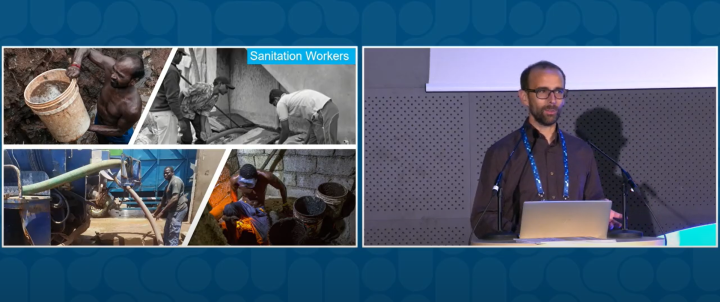
Initiative for Sanitation Workers (ISW) (2025) Sanitation workers, 6 years on: Successes, resources and looking forward
In Stockholm World Water Week 2019 the seminal report “Health, safety and dignity of sanitation workers. An Initial Assessment” was launched. It highlighted the appalling working conditions sanitation workers face and set out key areas for action. Accordingly, WaterAid, World Bank, WHO, ILO and SNV formed the Initiative for Sanitation Workers (ISW), a global advocacy alliance. Acknowledging that without a protected and healthy workforce the Sustainable Development Goal’s safely managed sanitation ambition cannot be achieved, ISW set out to: support inclusion of sanitation workers’ rights in government and civil society political agendas; influence the WASH and labour sectors to mainstream sanitation workers’ rights; and support research initiatives and products which address key knowledge gaps. This session involves live and remote presentations from ISW members and sanitation workers highlighting the successes and challenges of ISW work, resources developed and what has changed since 2019 for sanitation workers in policy and practice. It will be followed by a world cafe where participants will learn more about the key outputs and experiences developed over the past 6 years.
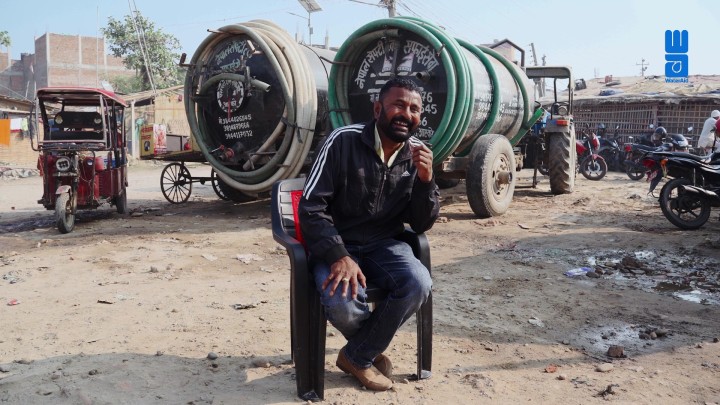
Aarzoo Nepal and Sneha Jha (2025) Weight of the Waste: Story of Sanitation Workers
This film is more than just a story; it is a raw and honest portrayal of the daily realities faced by these essential individuals. It delves into their immense challenges, the pervasive social stigma and discrimination they endure, often leading to their isolation and dehumanization. The documentary poignantly shows how many are compelled to hide their identities, fearing judgment and ostracization from society.Yet, amidst these profound struggles, we also witness inspiring resilience. The documentary highlights a growing trend: some youth in Janakpur are embracing this vital work with a sense of pride, understanding the critical role it plays in supporting their families and communities. Their stories are a testament to strength, dignity, and dedication, even in the face of deep-seated prejudice.
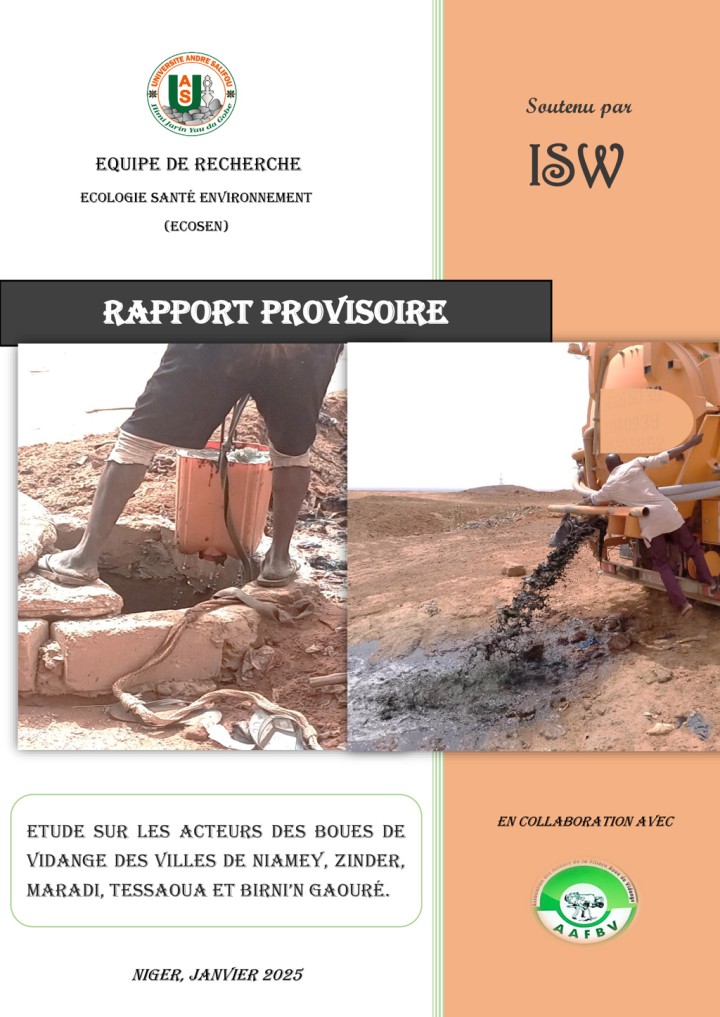
Dr. ZAKARI M. Mounir, Dr. OUMAROU Issoufou MC, Dr. GONI A. Maman Bachir et Mr. ABDOU G. Mamane Achirou (2025) Etude sur les acteurs des boues dé vidange des villes de Niamey, Zinder, Maradi, Tessaoua et Birni'n Gaouré
Les opérateurs de boues de vidange jouent un rôle essentiel dans le secteur de l'assainissement. Pourtant, leurs conditions de travail sont souvent précaires et dangereuses. Face à ce constat alarmant et au manque de données précises, ISW a financé une étude approfondie sur la situation des vidangeurs au Niger. Réalisée dans cinq villes (Niamey, Maradi, Zinder, Birni N'Gaouré et Tessaoua), cette étude a combiné enquêtes quantitatives et qualitatives pour dresser un état des lieux exhaustif. Les résultats de cette étude ont mis en évidence les conditions de travail extrêmement difficiles des vidangeurs, caractérisées par la discrimination, la précarité et des risques élevés pour leur santé et l'environnement. Une analyse FFOM a permis d'identifier les atouts, les faiblesses, les opportunités et les menaces auxquels est confronté le secteur. Sur cette base, des recommandations stratégiques ont été formulées pour permettre à l'AAFBV d'améliorer durablement la situation des vidangeurs et de professionnaliser le secteur.
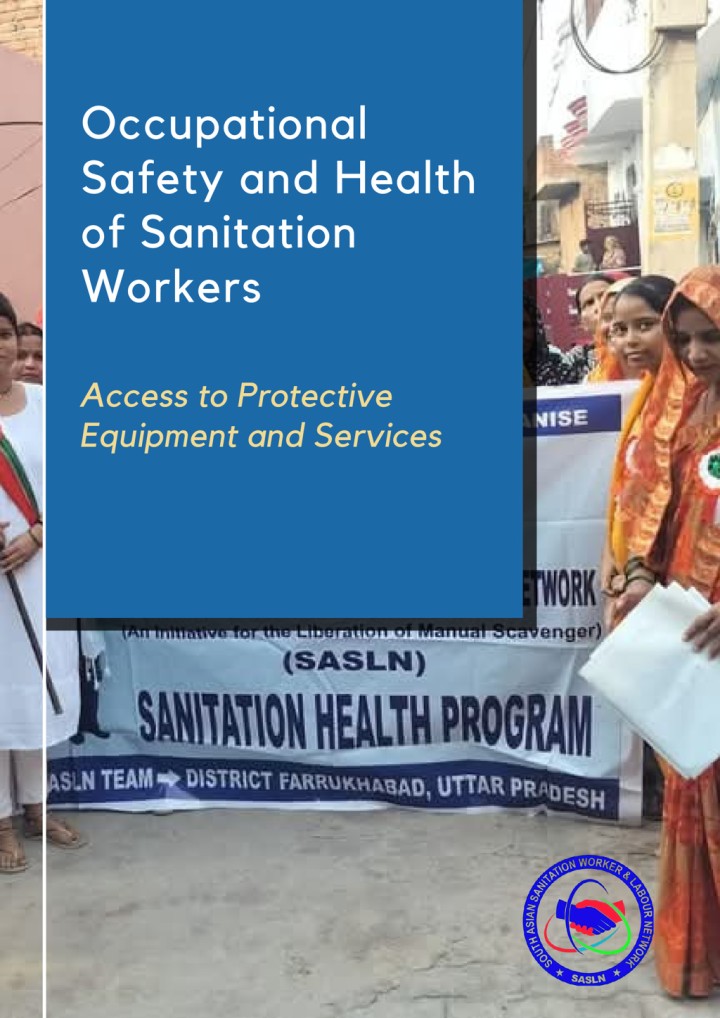
SASLN (2025) Occupational Safety and Health of Sanitation Workers: Access to Protective Equipment and Services
This collaborative study by the South Asian Sanitation Worker and Labour Network (SASLN) examined occupational safety and health conditions for sanitation workers across 10 Indian states. Through a structured survey involving over 500 participants, the study identified critical gaps in access to protective equipment, healthcare, social security, and training. Findings reveal that a majority of workers operate without adequate safety gear, often under informal employment conditions, with limited access to hygiene facilities or mental health support. The study also highlights the need for gender-sensitive tools and inclusive workplace practices.
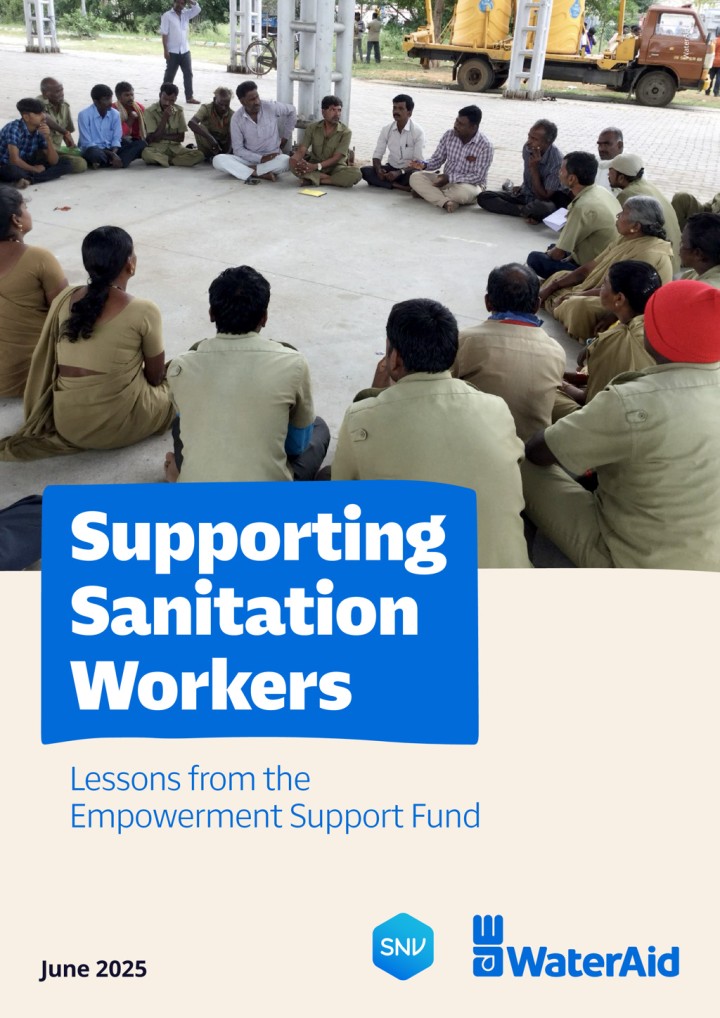
SNV and WaterAid (2025) Supporting Sanitation Workers
Sanitation workers, involved in faecal waste management, face dangerous and oppressive working conditions, as well as stigma. A key challenge weakening their voices is the lack of collective organisation among sanitation workers. Their health, safety and dignity is an issue of human rights, but it is also crucial for achieving the ambitions of safely managed sanitation for all and the promotion of decent work, as enshrined in the Sustainable Development Goals 6 and 8. To address this and to strengthen the collective power of sanitation workers, the Initiative for Sanitation Workers (ISW) set up the Empowerment Support Fund.
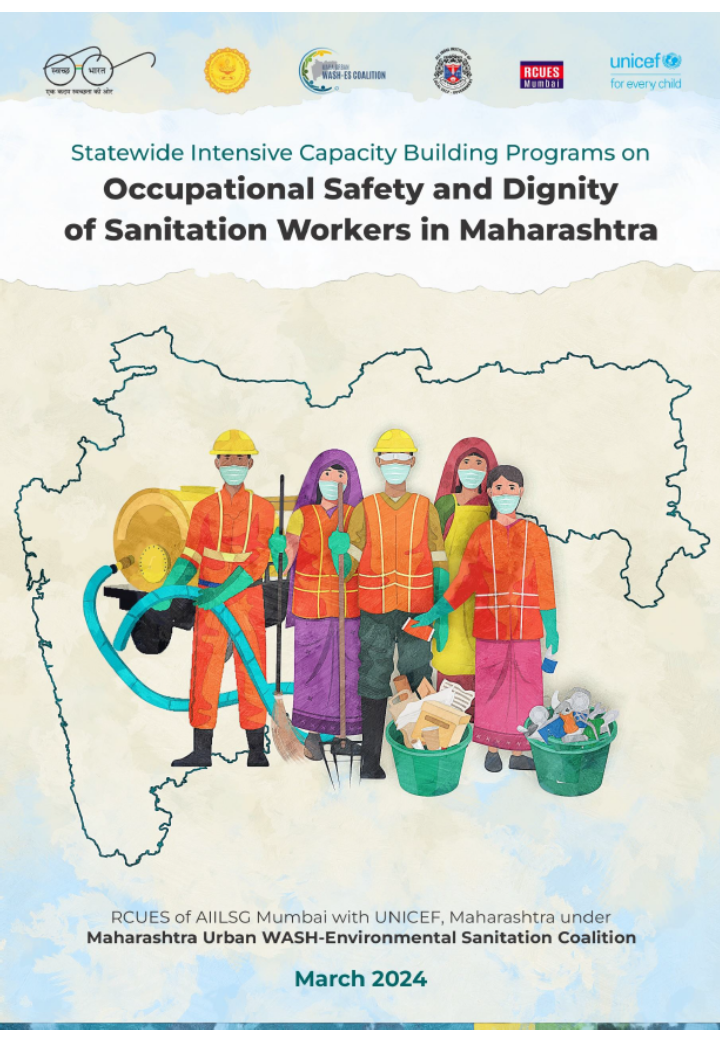
(2024) Statewide Intensive Capacity Building Programs on Occupational Safety and Dignity of Sanitation Workers in Maharashtra
This collaborative effort between the Government of Maharashtra, RCUES of AIILSG Mumbai, and UNICEF India aimed to empower sanitation workers through a comprehensive capacity building program focused on occupational safety and dignity. The initiative successfully trained over 250 Master Trainers who then disseminated their knowledge to more than 2,000 sanitation workers across the state, addressing occupational safety concerns and contributing to public health goals.
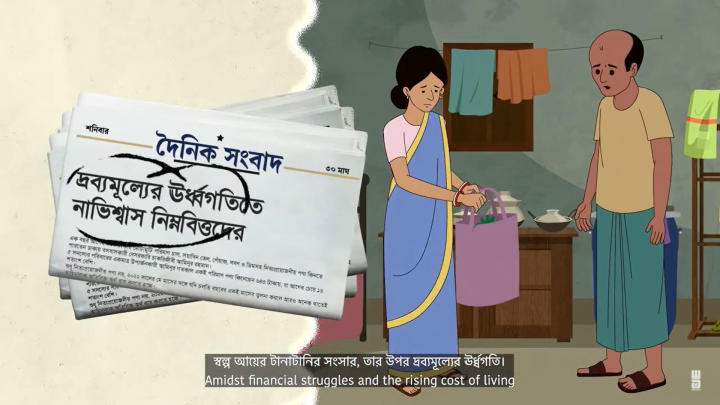
(2024) Introducing 'Shasthya Nirapotta Scheme'
WaterAid in collaboration with Waadaa.Insure and Chartered Life, introduced Shasthya Nirapotta Scheme (SNS), a health protection scheme for low-income people specially the sanitation workers to ease their struggles and triumphs. This health protection initiative is designed to improve healthcare access and provide financial support in the event of the premium holder's death. This innovative scheme is also graciously supported by Government of Sweden, and Bill and Melinda Gates Foundation. SNS is transforming lives across Bangladesh, ensuring that no family suffers the devastating consequences of losing its breadearner due to unforeseeable health issues. This International Workers' Day, join the movement for change and help us to spread awareness about the importance of protecting the health and well-being of the working class and ensure a safer, healthier future for all.
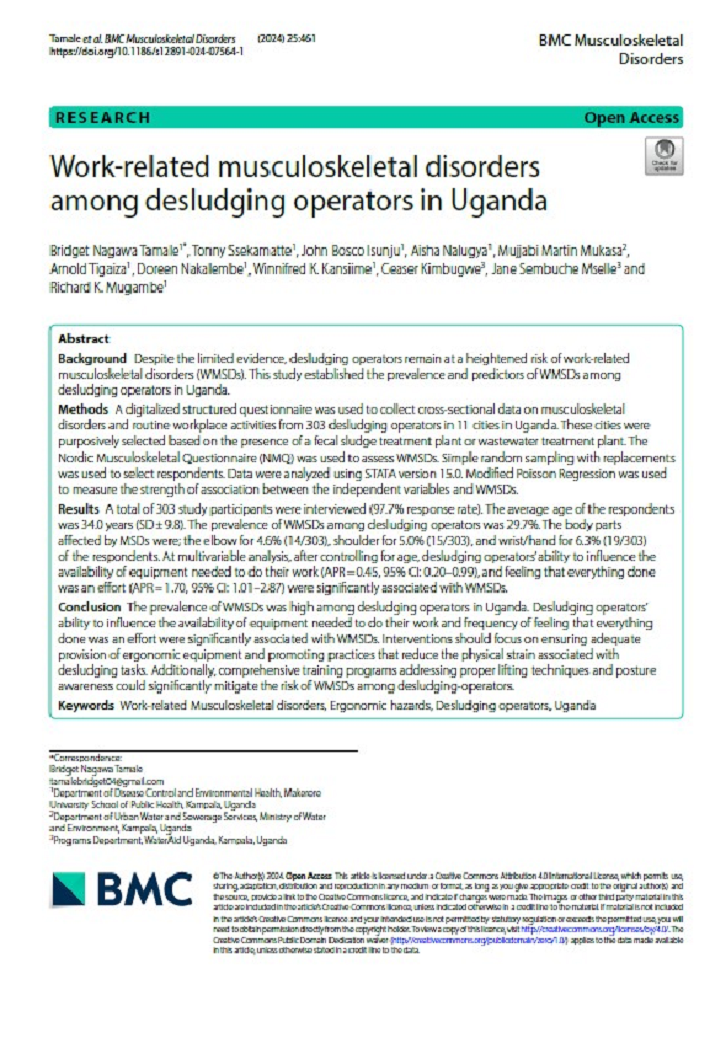
Bridget Nagawa Tamale, Tonny Ssekamatte, John Bosco Isunju, Aisha Nalugya, Mujjabi Martin Mukasa, Arnold Tigaiza, Doreen Nakalembe, Winnifred K. Kansiime, Ceaser Kimbugwe, Jane Sembuche Mselle and Richard K. Mugambe (2024) Work-related musculoskeletal disorders among desludging operators in Uganda
Work-related musculoskeletal disorders (WMSDs) are a significant occupational health concern, particularly among workers engaged in physically demanding and labor-intensive tasks. Desludging operators, who are responsible for the removal and management of fecal sludge, are particularly susceptible to these disorders due to the strenuous nature of their work. Despite the critical role they play in sanitation and public health, there is limited evidence regarding the prevalence and determinants of WMSDs among desludging operators. This study aims to bridge this knowledge gap by establishing the prevalence of WMSDs and identifying key predictors among desludging operators in Uganda. By understanding these factors, the study seeks to inform interventions that can mitigate the risk of WMSDs and improve the working conditions for this essential workforce.
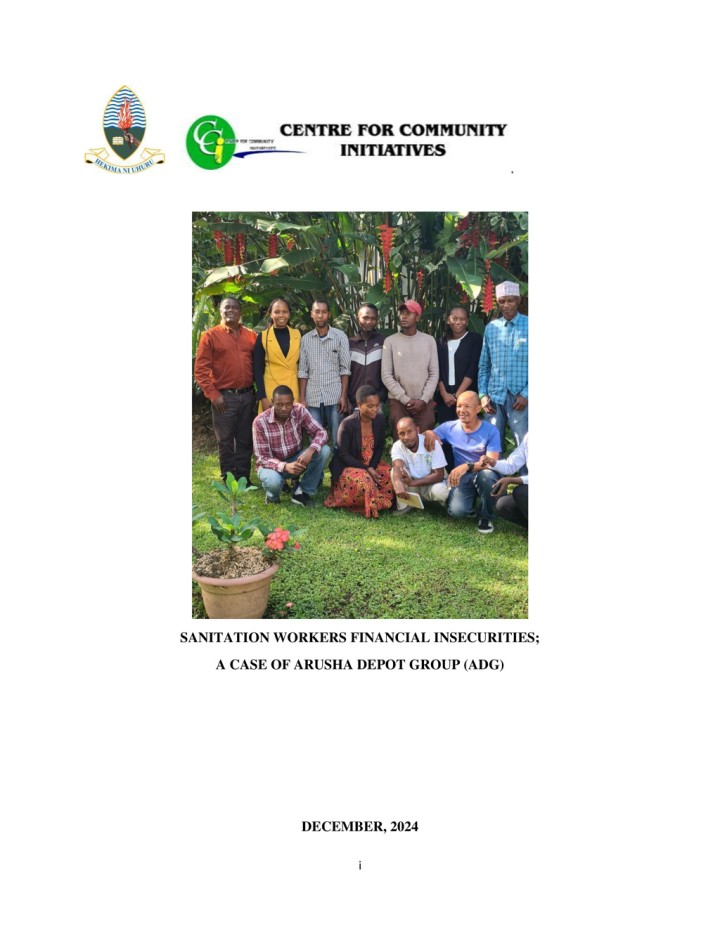
Center for Community Initiatives (2024) Sanitation Workers Financial Insecurities
Sanitation work in Arusha plays a critical role in maintaining urban health and hygiene, but it has historically been underappreciated and, at times, stigmatized. The sanitation workers, oftenengaged in manual emptying, street sweeping, and sewer system maintenance, belong to an informal workforce that faces significant challenges, particularly financial insecurity and lack of recognition. This study provides a comprehensive analysis of the financial insecurity faced by sanitation workers in Arusha, with particular emphasis on manual emptiers. The findings, drawn from Key Informant Interviews (KIIs), Focus Group Discussions (FGDs), and Financial Diaries, paint a detailed picture of the daily financial challenges experienced by these workers, highlighting systemic issues, social stigmas, and the absence of formal support structures.
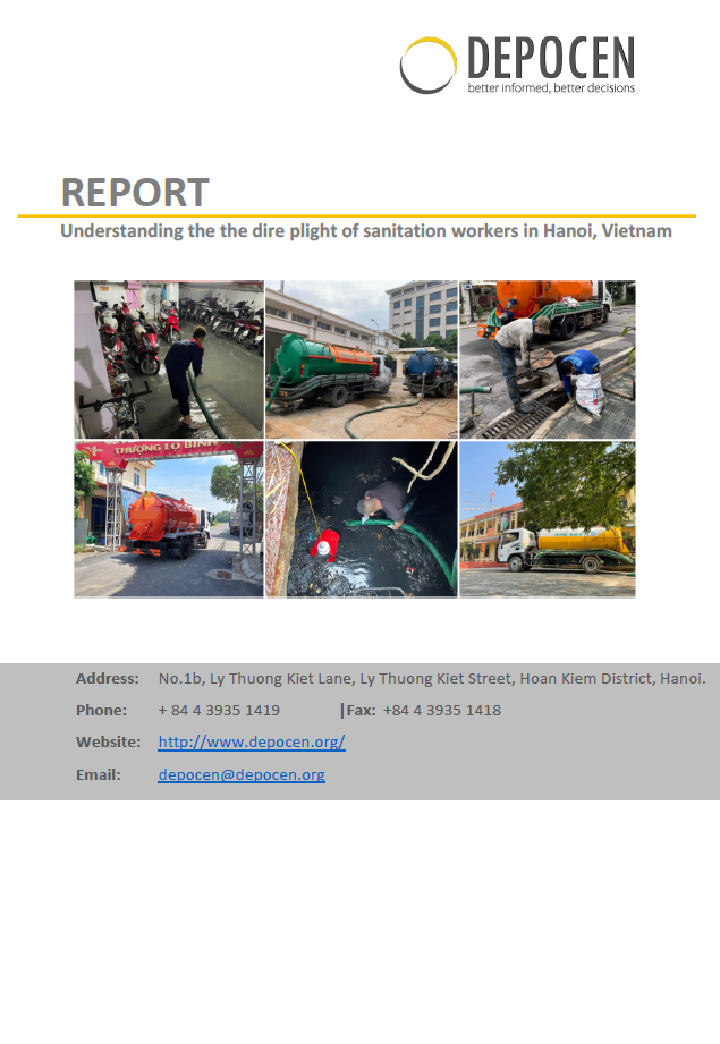
DEPOCEN (2024) Understanding the the dire plight of sanitation workers in Hanoi, Vietnam
The rapid urban development in Hanoi has exposed weaknesses in the city's sanitation infrastructure, straining the waste management system and increasing pressures on sanitation workers who already face hazardous conditions, financial insecurity, and societal discrimination. The study found that urban workers face more health hazards, while rural workers suffer greater job and financial insecurities. Both groups experience significant societal discrimination. Although basic worker rights like social insurance and safety workshops are provided, additional benefits are lacking. The study recommends addressing the urban-rural worker gap, improving benefits, and raising societal awareness of sanitation workers' importance.
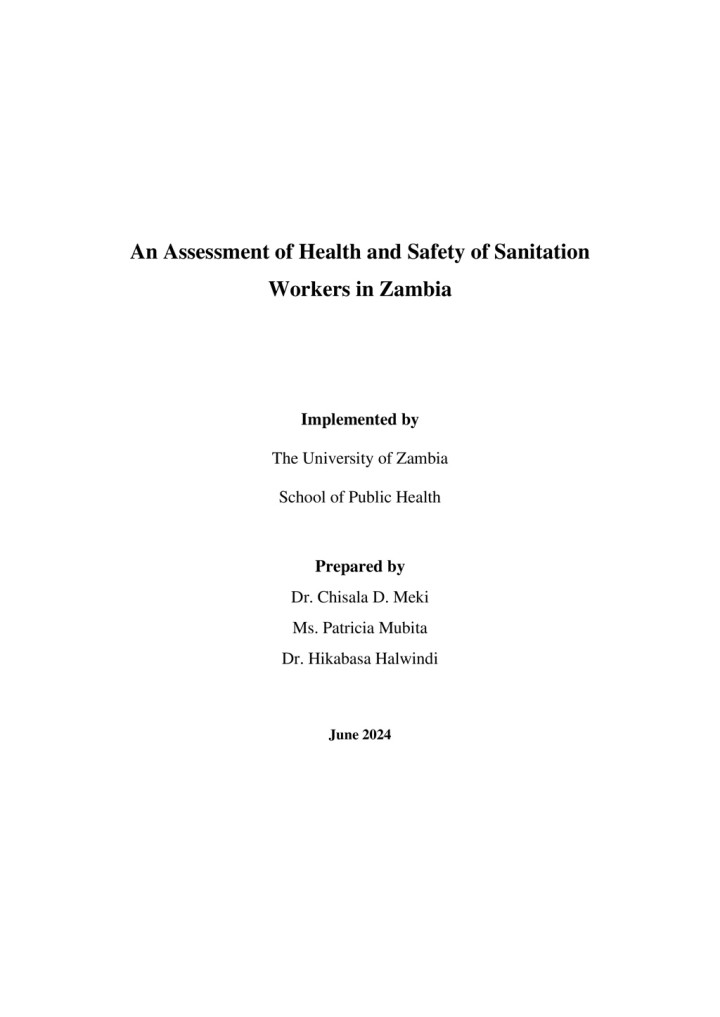
Dr. Chisala D. Meki; Patricia Mubita; Dr. Hikabasa Halwindi (2024) An Assessment of Health and Safety of Sanitation Workers in Zambia
Sanitation is a cornerstone of healthy communities. Pit emptiers play a critical role in maintaining public health and safety by removing waste from pit latrines and septic tanks. Despite their essential work, these individuals often toil in obscurity and face significant challenges accessing adequate health and safety protections, particularly in developing countries. This study investigated the health and safety of sanitation workers in Zambia and found that more than 50% of sanitation workers were informal emptiers facing various physical, biological, chemical, and ergonomic hazards. These workers have limited access to protective equipment, tools, transportation, vaccinations, and medical checkups. Illness was the major cause of absenteeism, with respiratory issues being the most common. The study also revealed that some sanitation companies lacked proper guidelines and safety protocols and that existing sanitation laws are inadequate and poorly enforced. Beyond these issues, sanitation workers struggle with stigma, poor working conditions, limited jobs, limited resources, and unprofitable work.
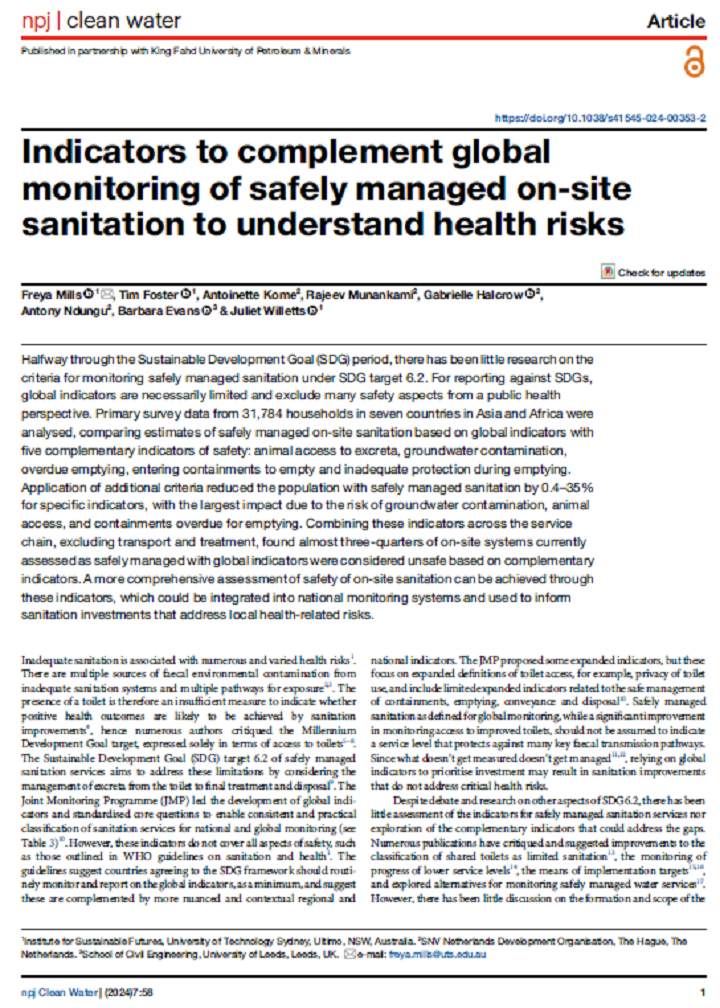
Freya Mills, Tim Foster, Antoinette Kome, Rajeev Munankami, Gabrielle Halcrow, Antony Ndungu, Barbara Evans & Juliet Willetts (2024) Indicators to complement global monitoring of safely managed on-site sanitation to understand health risks
This document highlights significant occupational health and safety risks for sanitation workers during the emptying of on-site sanitation systems. A major concern is the direct exposure to health risks, as many workers enter containments like pits and septic tanks, with only 8% of systems emptied without such entry. Risks are higher in rural areas, where self-emptying is more common, and in urban settings where sanitation systems often pose greater hazards. The authors stresses the need for better enforcement of safety protocols, particularly in promoting the use of mechanical emptying methods and ensuring proper PPE use to protect sanitation workers from health hazards.
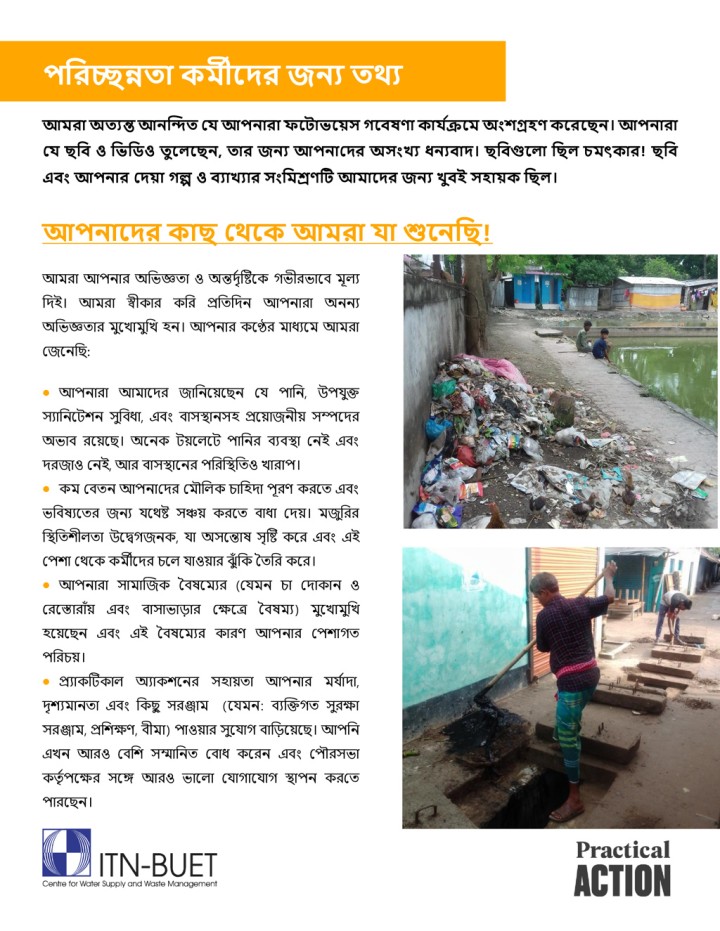
ITN-BUET Centre for Water Supply and Waste Management (2024) পরিচ্ছন্নতা কর্মীদেি জন্য তথ্য
আর্মিা অতযন্তআন্ন্দিত যেআপনারা ফদ াভদ়েস গদেষণা কাে যক্রদর্ম অংশগ্রহণ কদিদেন্।আপনারা যে েরে ও রভরিও তুদেদেন্, তাি জন্য আপন্াদের অসংখ্য ধন্যোে। ছবিগুল া রেে চর্মৎকাি েরে এেং আপন্াি যে়ো গল্প ও েযাখ্যাি সংরর্মশ্রণট আমালের জনয খ্ুেই সহা়েক রেে। আপনালের কাে যথ্দক আর্মিা ো শুদন্রে আমরা আপনার অভিজ্ঞতা ও অন্তর্দৃষ্টিকে গিীরিাকে মূল্য ভর্ই। আমরা স্বীোর েভর প্রভতভর্ন আপনারা অননয অভিজ্ঞতার মুকিামুভি হন। আপনার েকের মাধ্যকম আমরা জেননভি: • আপনারা আমাকর্র জাভনক়েকেন যে পাভন, উপেুক্ত স্যাভনকেশন স্ুভেধ্া, এেং োস্স্থানস্হ প্রক়োজনী়ে স্ম্পকর্র অিাে রক়েকে। অকনে ে়েকল্কে পাভনর েযেস্থা যনই এেং র্রজাও যনই, আর োস্স্থাকনর পভরভস্থভতও িারাপ।
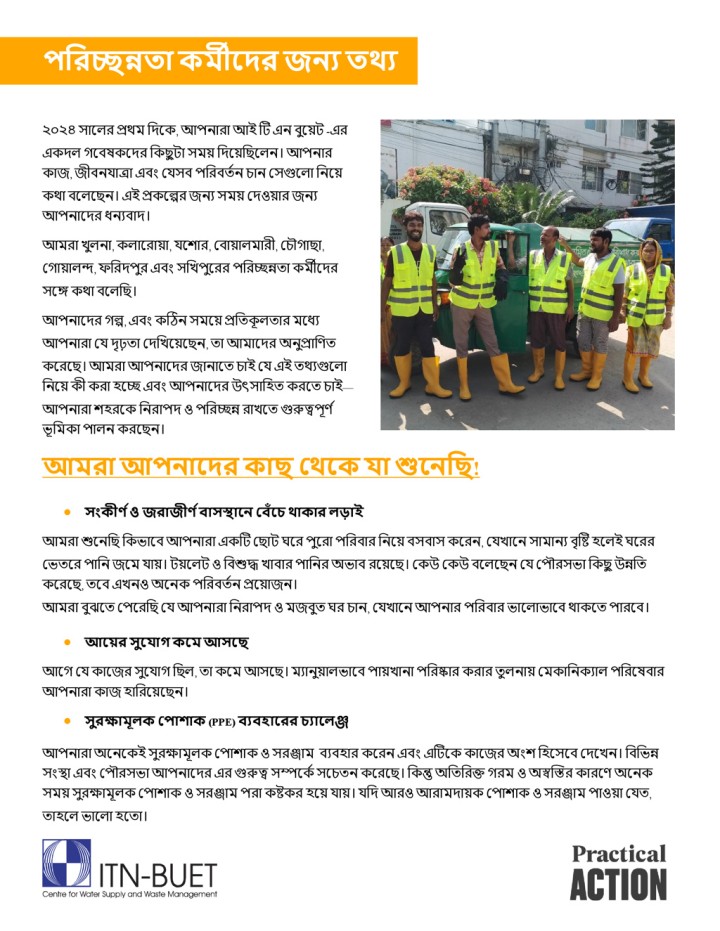
ITN-BUET Centre for Water Supply and Waste Management (2024) পরিচ্ছন্নতা কর্মীদেি জন্য তথ্য
২০২৪ সালের প্রথম দিলে, আপনারা আই টি এন বুয়েি -এর একদল গলেষেলির ককছু িা সমে কদয়েকছয়লন। আপনারো জ, জীেনযাত্রা এেং যযসে পদরের্তন চান যসগুলো দনলেে থা েলেলেন। এই প্রেলের জনয সমে যিওোর জনয আপনালির ধনযোি। আমরা খুেনা, েোলরাো, যল ার, যোোেমারী, যচৌগাো, যগাোেন্দ, ফদরিপুর এেং সদখপুলরর পদরচ্ছন্নর্া েমীলির সলে েথা েলেদে। আপনালির গে, এেং কটিন সময়ে প্রদর্েূ ের্ার মলধয আপনারা যয িৃঢ়র্া যিদখলেলেন, র্া আমালির অনুপ্রাদির্ে লরলে। আমরা আপনালির জানালর্ চাই যয এই র্থযগুলো দনলে েী েরা হলচ্ছ এেং আপনালির উৎসাদহর্ েরলর্ চাই— আপনারা হরলে দনরাপি ও পদরচ্ছন্ন রাখলর্ গুরুত্বপূি ত ভূ দমো পােন েরলেন।
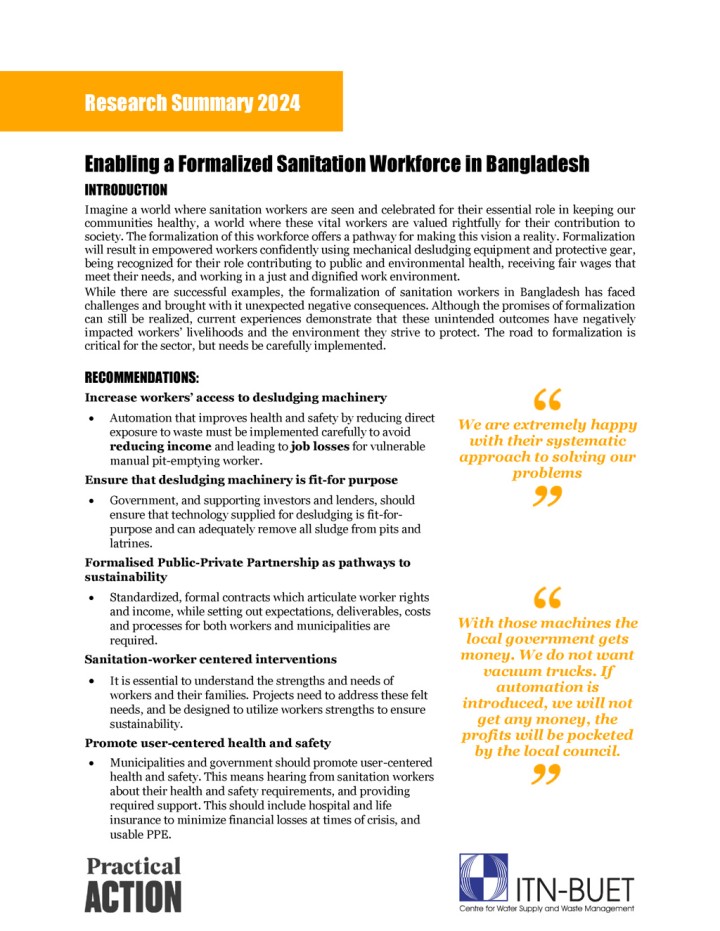
ITN-BUET Centre for Water Supply and Waste Management (2024) Enabling a Formalized Sanitation Workforce in Bangladesh
Imagine a world where sanitation workers are seen and celebrated for their essential role in keeping our communities healthy, a world where these vital workers are valued rightfully for their contribution to society. The formalization of this workforce offers a pathway for making this vision a reality. Formalization will result in empowered workers confidently using mechanical desludging equipment and protective gear, being recognized for their role contributing to public and environmental health, receiving fair wages that meet their needs, and working in a just and dignified work environment.While there are successful examples, the formalization of sanitation workers in Bangladesh has faced challenges and brought with it unexpected negative consequences. Although the promises of formalization can still be realized, current experiences demonstrate that these unintended outcomes have negatively impacted workers’ livelihoods and the environment they strive to protect. The road to formalization is critical for the sector, but needs be carefully implemented.
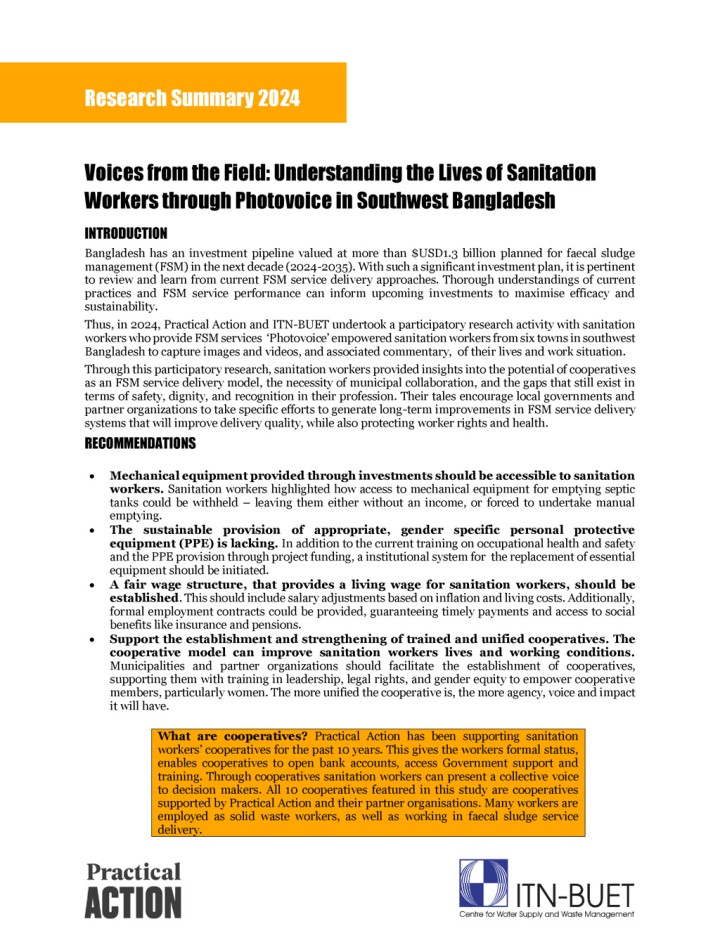
ITN-BUET Centre for Water Supply and Waste Management (2024) Voices from the Field: Understanding the Lives of Sanitation Workers through Photovoice in Southwest Bangladesh
Bangladesh has an investment pipeline valued at more than $USD1.3 billion planned for faecal sludge management (FSM) in the next decade (2024-2035). With such a significant investment plan, it is pertinent to review and learn from current FSM service delivery approaches. Thorough understandings of current practices and FSM service performance can inform upcoming investments to maximise efficacy and sustainability. Thus, in 2024, Practical Action and ITN-BUET undertook a participatory research activity with sanitation workers who provide FSM services ‘Photovoice’ empowered sanitation workers from six towns in southwest Bangladesh to capture images and videos, and associated commentary, of their lives and work situation.Through this participatory research, sanitation workers provided insights into the potential of cooperatives as an FSM service delivery model, the necessity of municipal collaboration, and the gaps that still exist in terms of safety, dignity, and recognition in their profession.
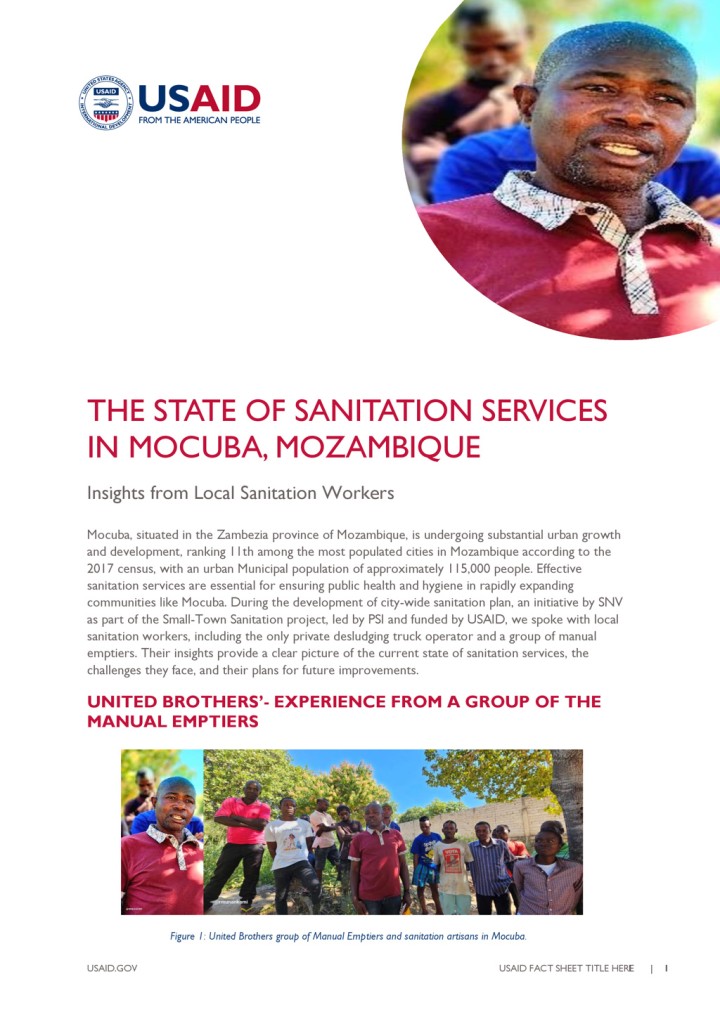
Micaela Rodrigues (2024) Fact Sheet - The State of Sanitation Services in Mocuba, Mozambique
Mocuba, situated in the Zambezia province of Mozambique, is undergoing substantial urban growth and development, ranking 11th among the most populated cities in Mozambique according to the 2017 census, with an urban Municipal population of approximately 115,000 people. Effective sanitation services are essential for ensuring public health and hygiene in rapidly expanding communities like Mocuba. During the development of city-wide sanitation plan, an initiative by SNV as part of the Small-Town Sanitation project, led by PSI and funded by USAID, we spoke with local sanitation workers, including the only private desludging truck operator and a group of manual emptiers. Their insights provide a clear picture of the current state of sanitation services, the challenges they face, and their plans for future improvements.
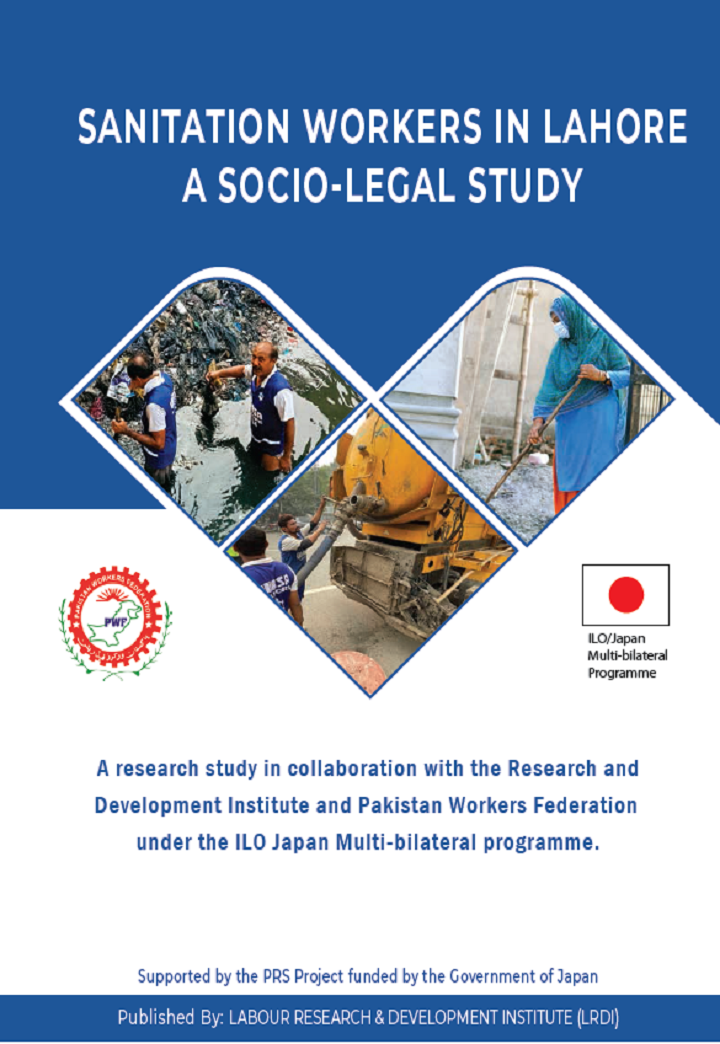
Muhammad Umar Ali, Dr. Muhammad Azeem (2024) Sanitation Workers in Lahore: A Socio-Legal Study
The report provides an in-depth analysis of the working conditions, socio-economic challenges, and legal protections (or lack thereof) faced by sanitation workers in Lahore, Pakistan. Published by the Labour Research & Development Institute (LRDI) in collaboration with the Pakistan Workers Federation, the study is part of the ILO Japan Multi-bilateral Programme. It focuses on issues such as occupational safety, wages, social security, and discrimination, particularly highlighting the precarious situation of sanitation workers, many of whom belong to marginalized communities. The study reveals significant deficits in decent work conditions, including inadequate safety measures, low wages, and lack of social security coverage. The report also examines the impact of caste, religion, and gender on the livelihoods of these workers, calling for urgent reforms in policy and enforcement to improve their working conditions and ensure their rights are protected.
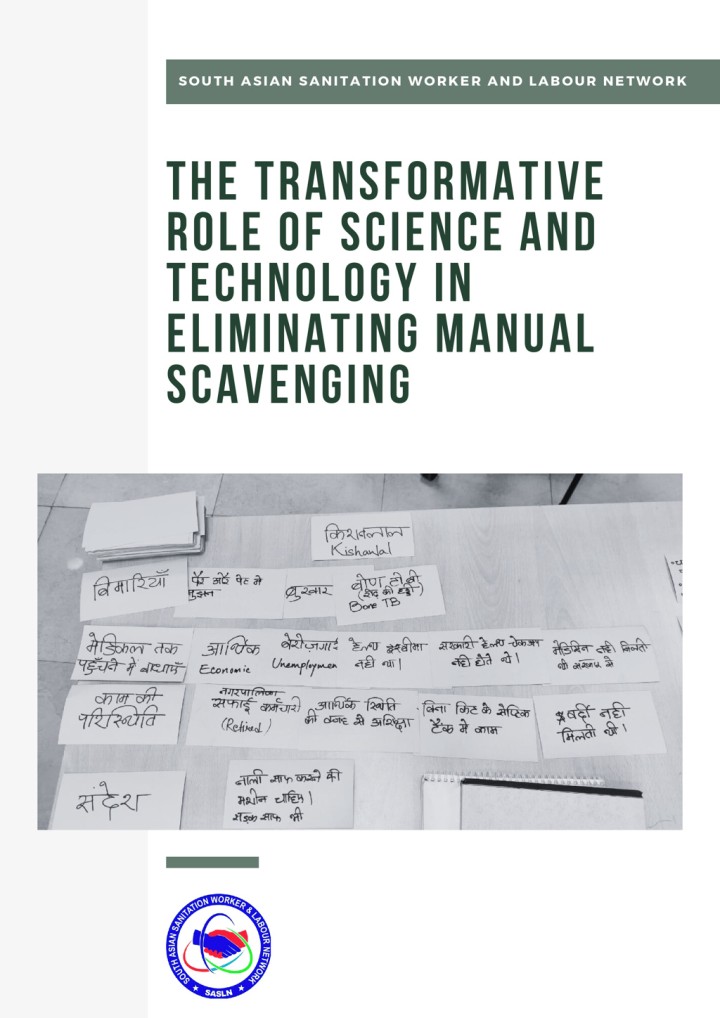
SASLN (2024) The Transformative Role of Science and Technology in Eliminating Manual Scavenging
Indian society is marked by deep- rooted complexities, where identities are shaped not only by religion, and class but also by caste that creates social hierarchies. Among the most dehumanizing manifestations of this structure is the practice of manual scavenging, where one person is forced to clean another' s waste. This report by the South Asian Sanitation Worker and Labour Network (SASLN) explores how science and technology can play a critical role in eliminating manual scavenging in India. Drawing on field research, expert interviews, and technology reviews, the study identifies gaps in policy implementation and highlights the potential of mechanized sanitation tools to replace hazardous manual labour.
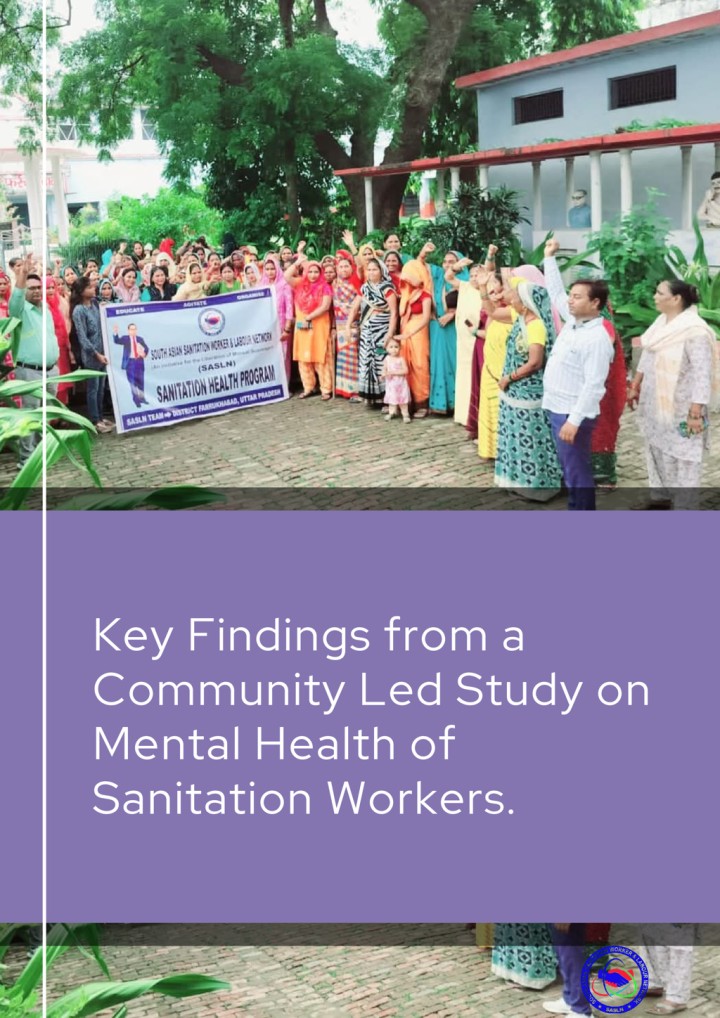
SASLN (2024) Key Findings from a Community Led Study on Mental Health of Sanitation Workers
Sanitation workers in India, predominantly from marginalized communities, play a critical role in maintaining public health and ensuring the cleanliness of urban and rural environments. However, despite their essential contributions, they endure deeply entrenched social, economic, and psychological challenges that severely affect their overall well-being. The report assessed awareness, accessibility, and affordability of mental health support and identified systemic gaps in care and employer practices.
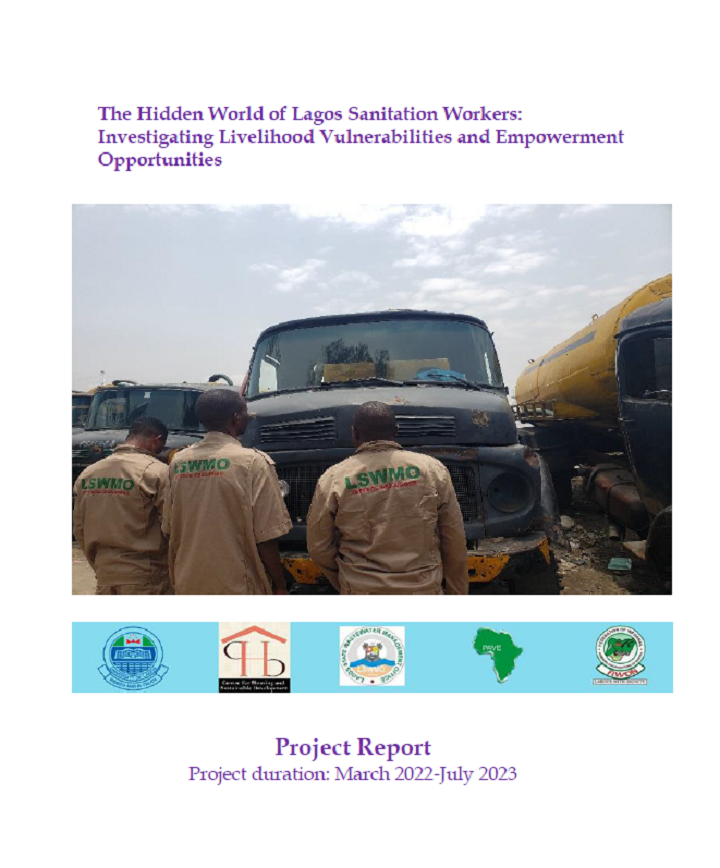
Taibat Lawanson, Basirat Oyalowo and Anthony Akpan (2024) The Hidden World of Lagos Sanitation Workers: Investigating Livelihood Vulnerabilities and Empowerment Opportunities
This publication explores the critical yet underappreciated role of sanitation workers in Lagos, focusing on their contributions to urban management and public health, especially in the wake of COVID-19. The study investigates the socio-economic conditions, challenges, and innovative practices of these workers, highlighting their essential role in waste management and the need for better recognition and support. By aligning with SDG 6 (Clean Water and Sanitation) and SDG 8 (Decent Work), the research aims to enhance the livelihoods of sanitation workers and promote sustainable development. Key findings emphasize the need for improved working conditions, social security, and health insurance access for these vital urban actors.
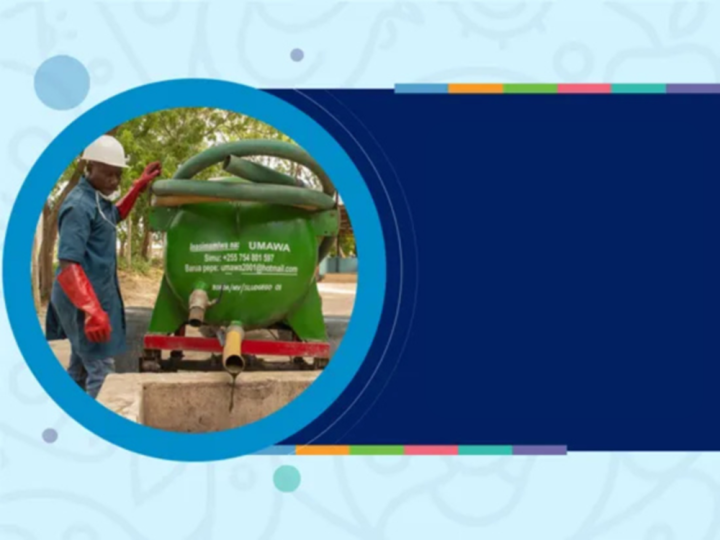
World Health Organization (2024) WHO Academy: Antimicrobial Resistance in the environment: key concepts and interventions
Antimicrobial resistance (AMR) is one of the leading threats to human health. Tackling AMR will require a One Health response, including addressing AMR in the environment. The environmental dimensions of AMR are often neglected in national action plans and investments on AMR. In this course, you will learn why addressing AMR in the environment is essential and gain insights into how action can be taken to prevent and control AMR in the environment at the national level.
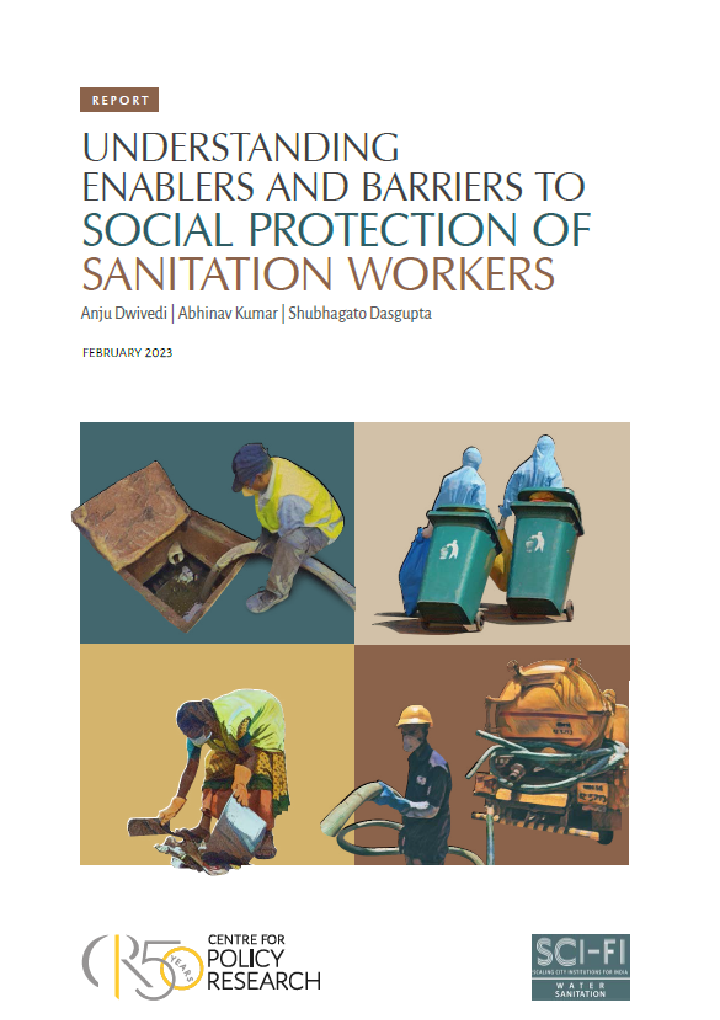
Anju Dwivedi, Abhinav Kumar, Shubhagato Dasgupta (2023) Understanding Enablers and Barriers for Social Protection of Sanitation Workers in Dhenkanal Odisha, India
In the past decade, India's Swachh Bharat Mission has significantly improved sanitation infrastructure, including toilets and treatment plants. However, sanitation workers, essential to maintaining safe sanitation, face hazardous conditions, discrimination, long hours, and low social status. To address these issues, the Government of India and state governments have launched various social protection programs. This study explores the challenges and enablers in accessing these benefits for sanitation workers in Dhenkanal, Odisha. Through interviews with workers and stakeholders, it identifies critical areas for improvement, such as policy support, awareness, and grievance mechanisms, and provides recommendations to enhance the workers' socioeconomic well-being and safety.
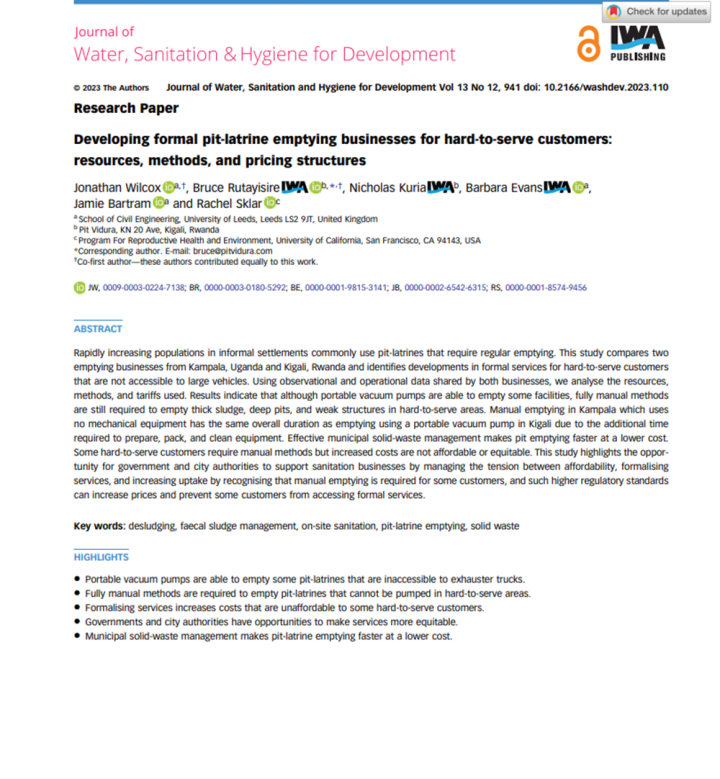
Jonathan Wilcox; Bruce Rutayisire; Nicholas Kuria; Barbara Evans; Jamie Bartram; Rachel Sklar (2023) Developing formal pit-latrine emptying businesses for hard-to-serve customers: resources, methods, and pricing structures
This study compares pit-latrine emptying businesses in Kampala, Uganda, and Kigali, Rwanda, focusing on resources, methods, and tariffs. Empirical data from Forever Sanitation and Pit Vidura show challenges with portable vacuum pumps in hard-to-reach areas, highlighting the need for formal manual emptying for some customers where mechanical methods are not viable. Manual emptying has similar duration to using a portable pump because of the additional time to set up, pack, and clean equipment. Higher regulatory standards can exclude households from using formal services. The study highlights the role of government in managing the tensions between affordability, formalization, and increasing coverage.
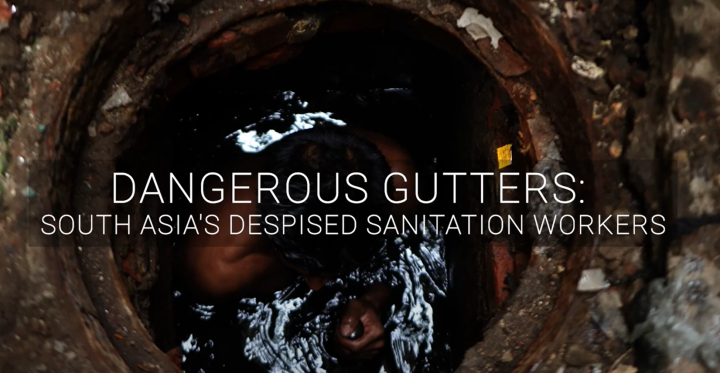
PSI Global Union (2023) Dangerous Gutters: South Asia's Despised Sanitation Workers
Sanitation workers across South Asia, including Bangladesh, face severe challenges in their work, from discrimination, lack of respect, low wages, and dangerous working conditions. In Bangladesh, they live in separate housing compounds in terrible conditions, their children face educational barriers, and malnutrition is common due to insufficient wages. These challenges are exacerbated by socio-cultural issues, such as the caste system, leading to further marginalisation. Mohammad Lokman Hossain shares the harsh reality of working as a sewage cleaner in Bangladesh. Despite the lack of safety equipment and precautions, dangerous working conditions, and social stigma, Lokman continues this work to provide for his family. He describes the daily risks he faces going into manholes with no harness, mask, or gloves, and how he has suffered serious injuries on the job. Lokman explains how sewages workers are despised and denied basic human dignity, even though their labour is essential for society's sanitation. He asks - is it too much for sewage workers to be provided safety gear, fair pay, and respect? This powerful first-hand account sheds light on the thankless job of manual scavenging and the need to recognise sanitation workers as equals.
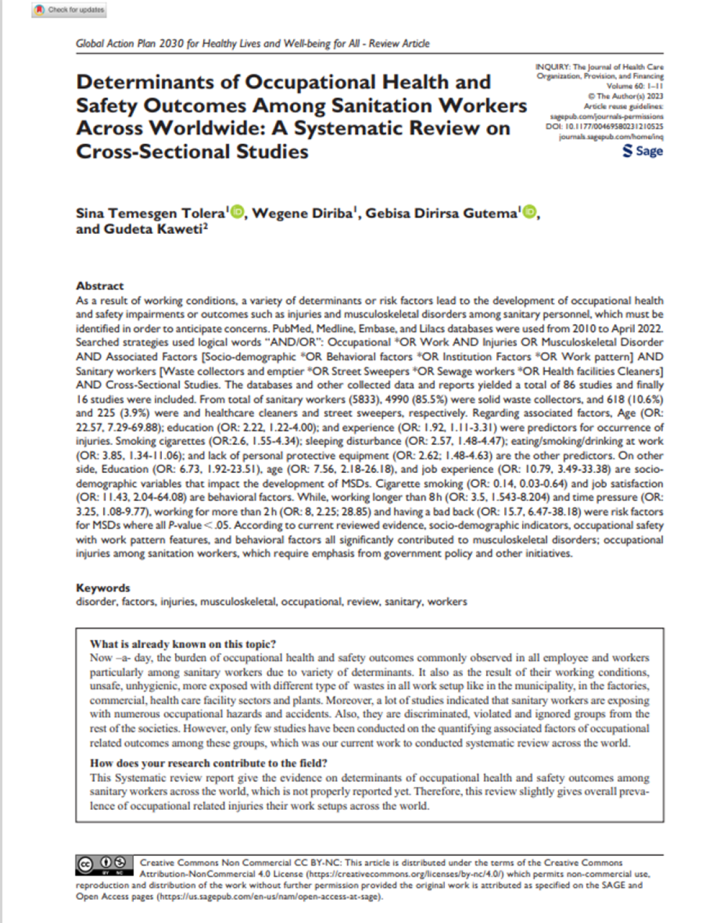
Sina Temesgen Tolera, Wegene Diriba, Gebisa Dirirsa Gutema, and Gudeta Kaweti (2023) Determinants of Occupational Health and Safety Outcomes Among Sanitation Workers Across Worldwide: A Systematic Review on Cross-Sectional Studies
Sanitation workers face occupational health and safety challenges due to unsafe working conditions and exposure to waste. Numerous studies have highlighted the occupational hazards and accidents faced by sanitation workers, who are also frequently subject to discrimination and neglect within societies. However, there has been limited research quantifying the factors associated with occupational outcomes among this group, prompting this study. This Systematic Review provides evidence on global determinants of occupational health and safety outcomes among sanitation workers, filling a gap in the literature and offering insights into injury prevalence across various work settings. The findings of this study suggest that governmental bodies, particularly the Ministries of Health and Social Affairs, along with relevant associations, should revise and incorporate policies, regulations, and guidelines pertaining to occupational health and safety factors for sanitation workers across all types of workplaces. Moreover, there is a need for robust enforcement and monitoring of these amendments to ensure effective implementation across all sectors of employment.
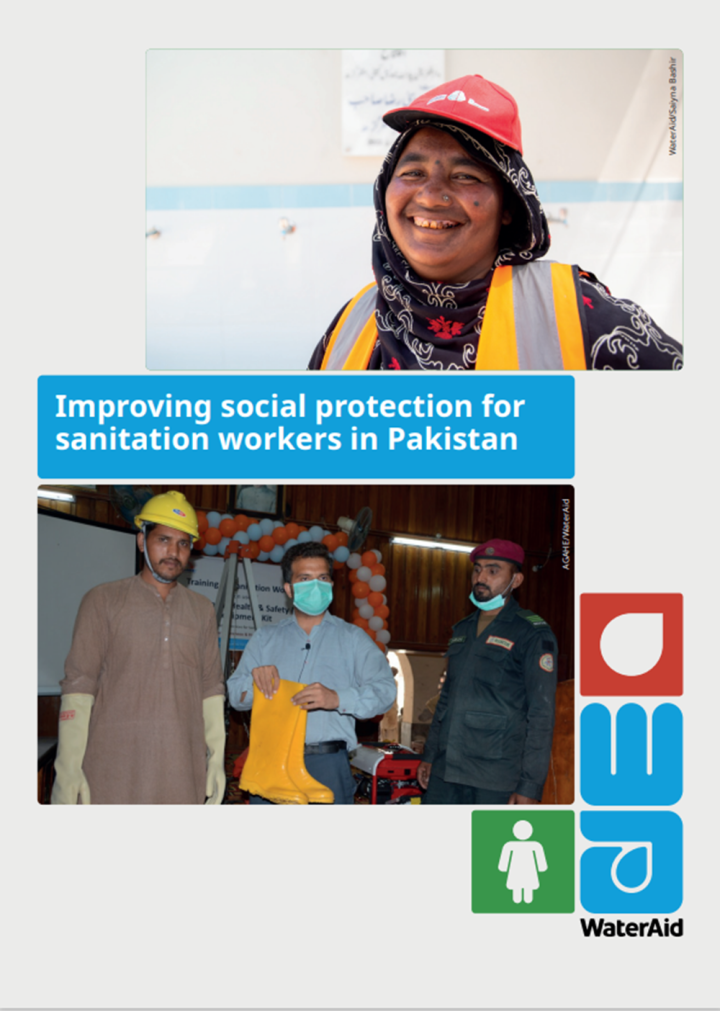
Vanita Suneja, Jaison Thomas and Faysal Abbas, with contributions from Andrés Hueso González, Sterenn Philippe, Julie Fisher, Adnan Hakeem, Arif Jabbar. Supported by Bill & Melinda Gates Foundation (2023) Improving social protection for sanitation workers in Pakistan
Sanitation workers play a vital role in maintaining cleanliness and safety within the sanitation chain, a crucial aspect of achieving Sustainable Development Goal (SDG) 6. However, they often face poor working conditions, social and economic marginalization, and significant health risks, including the threat of infection and injury, sometimes leading to fatalities, compromising their dignity and well-being. Enhancing social protection schemes for sanitation workers is essential to mitigate these inherent risks and challenges associated with their profession. WaterAid Pakistan, with WaterAid Bangladesh and WaterAid Nepal conducted a study across the three countries to evaluate the status of social protection schemes for sanitation workers. The Pakistan Policy brief focuses on key recommendations for the government and other stakeholders based on the study done in Pakistan.
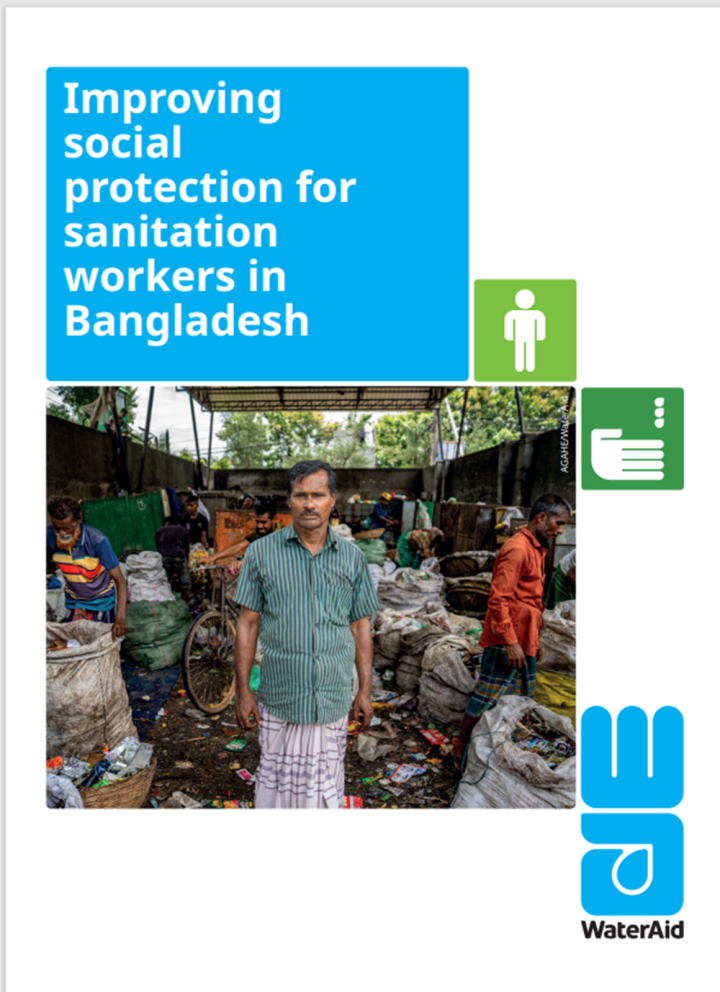
Vanita Suneja, Jaison Thomas and Faysal Abbas, with contributions from Andrés Hueso González, Sterenn Philippe, Julie Fisher, Hossain H. Adib, Mahadi Hasan and Hasin Jaha. Supported by Bill & Melinda Gates Foundation (2023) Improving social protection for sanitation workers in Bangladesh
Sanitation workers play a vital role in maintaining cleanliness and safety within the sanitation chain, a crucial aspect of achieving Sustainable Development Goal (SDG) 6. However, they often face poor working conditions, social and economic marginalization, and significant health risks, including the threat of infection and injury, sometimes leading to fatalities, compromising their dignity and well-being. Enhancing social protection schemes for sanitation workers is essential to mitigate these inherent risks and challenges associated with their profession. WaterAid Bangladesh, with WaterAid Nepal and WaterAid Pakistan conducted a study across Bangladesh, Nepal, and Pakistan to evaluate the status of social protection schemes for sanitation workers. The Bangladesh Policy brief focuses on key recommendations for the government and other stakeholders based on the study done in Bangladesh.
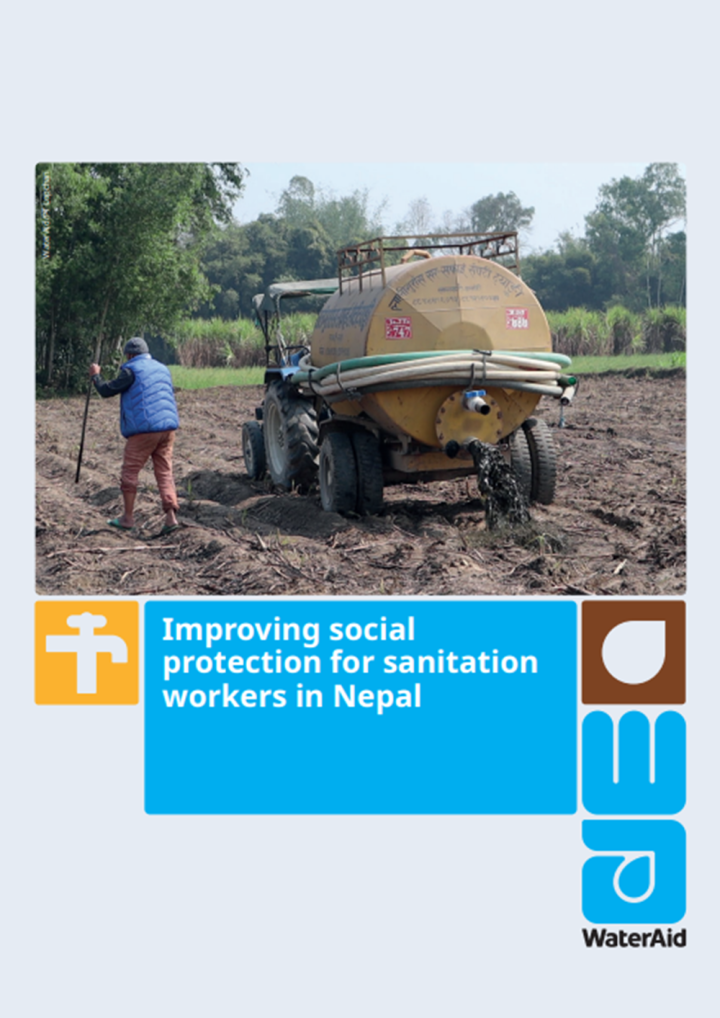
Vanita Suneja, Jaison Thomas and Faysal Abbas, with contributions from Andrés Hueso González, Sterenn Philippe, Julie Fisher, Seema Rajouria, Tripti Rai. Supported by Bill & Melinda Gates Foundation (2023) Improving social protection for sanitation workers in Nepal
Sanitation workers play a vital role in maintaining cleanliness and safety within the sanitation chain, a crucial aspect of achieving Sustainable Development Goal (SDG) 6. However, they often face poor working conditions, social and economic marginalization, and significant health risks, including the threat of infection and injury, sometimes leading to fatalities, compromising their dignity and well-being. Enhancing social protection schemes for sanitation workers is essential to mitigate these inherent risks and challenges associated with their profession. WaterAid Nepal, with WaterAid Bangladesh and WaterAid Pakistan conducted a study across the three countries to evaluate the status of social protection schemes for sanitation workers. The Nepal Policy brief focuses on key recommendations for the government and other stakeholders based on the study done in Nepal.
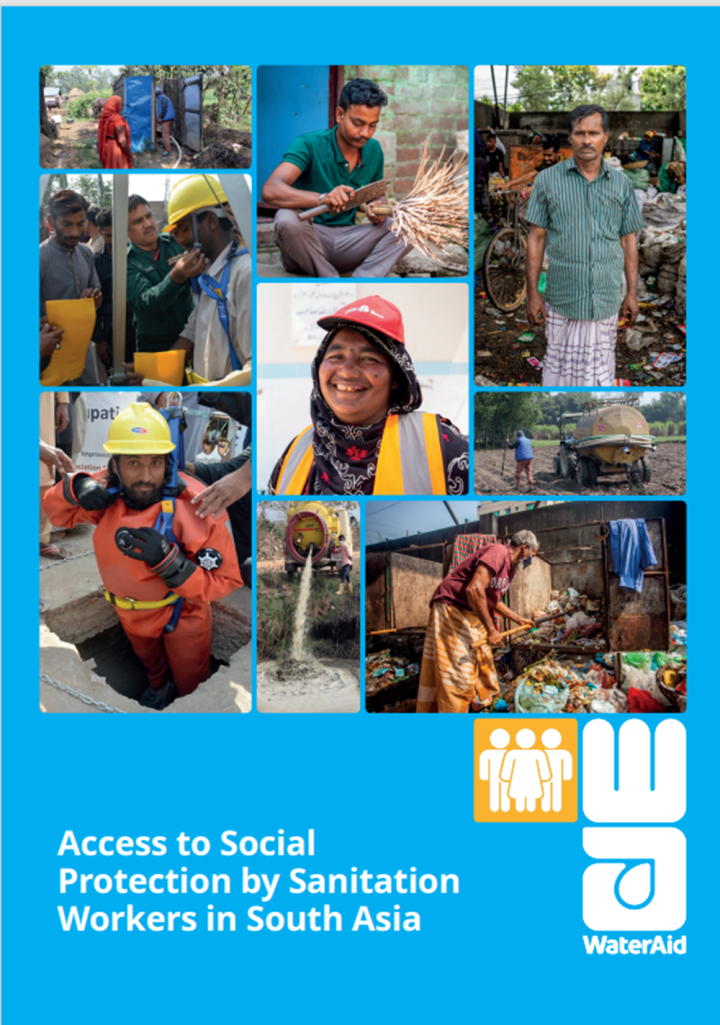
Vanita Suneja, Jaison Thomas and Faysal Abbas, with contributions from Andrés Hueso González, Sterenn Philippe, Julie Fisher. Supported by Bill & Melinda Gates Foundation (2023) Access to Social Protection by Sanitation Workers in South Asia
Sanitation workers provide an essential public service to ensure cleanliness and safety along the sanitation chain. This is key to achieving the ambitious Sustainable Development Goal (SDG) 6, although poor working conditions, social and economic marginalization, high risk of infection and injury even death, mean it is often at the cost of their dignity, health and life. Strengthening social protection schemes for sanitation workers is important to reduce and compensate for the innate risks and impacts of their profession. WaterAid commissioned a study in Bangladesh, Nepal and Pakistan to assess the status of social protection schemes for sanitation workers. More specifically the study looked at access, coverage of these schemes as well as gaps and challenges faced by sanitation workers. The methodology used household surveys and key informant interviews with various stakeholders, including sanitation workers and government officials in all three countries. Based on the findings, study made recommendations for improving social protection for sanitation workers, addressing SDG target 1.3 on universal social protection systems and measures and SDG 8 on the promotion of decent work for all. To know more, kindly go through the following documents: • Synthesis Report on Access to Social Protection by Sanitation Workers in South Asia. This is a comprehensive report brings together the three in-countries studies in all its dimensions using a comparative framework • South Asia Policy brief: focuses on key recommendations on improving social protection for sanitation workers based on the finding from the three in-country studies • Bangladesh Policy brief: focuses on key recommendations for the government and other stakeholders based on the study done in Bangladesh • Nepal Policy brief: focuses on key recommendations for the government and other stakeholders based on the study done in Nepal • Pakistan Policy brief: focuses on key recommendations for the government and other stakeholders based on the study done in Pakistan
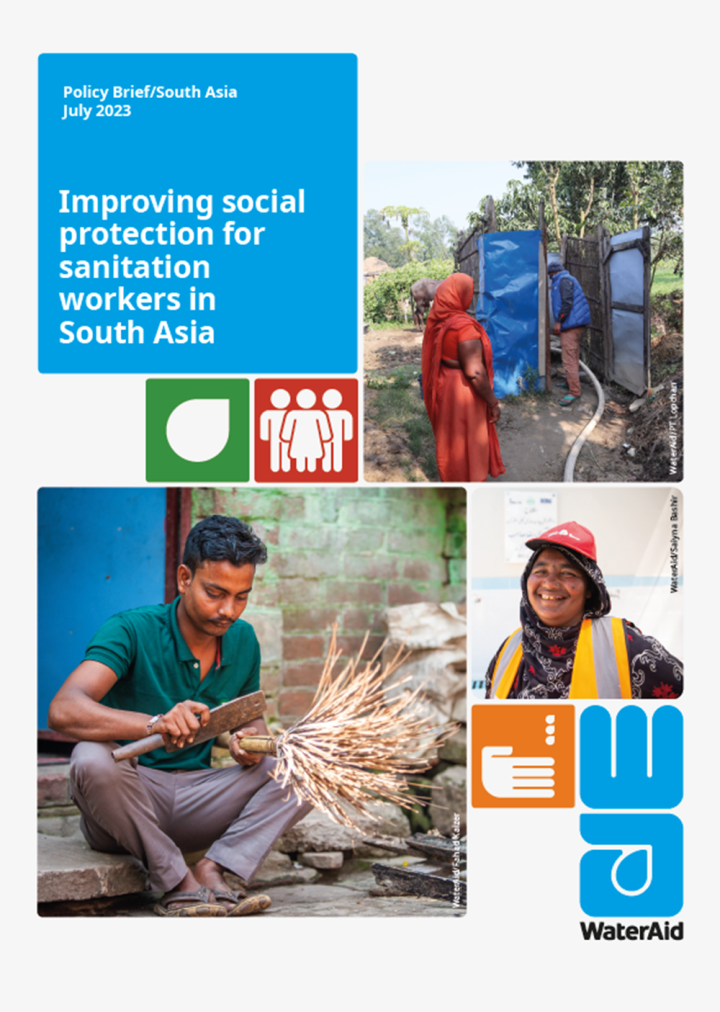
Vanita Suneja, Jaison Thomas and Faysal Abbas, with contributions from Andrés Hueso González, Sterenn Philippe, Julie Fisher. Supported by Bill & Melinda Gates Foundation (2023) Improving social protection for sanitation workers in South Asia
Sanitation workers provide an essential public service to ensure cleanliness and safety along the sanitation chain. This is key to achieving the ambitious Sustainable Development Goal (SDG) 6, although poor working conditions, social and economic marginalization, high risk of infection and injury even death, mean it is often at the cost of their dignity, health and life. Strengthening social protection schemes for sanitation workers is important to reduce and compensate for the innate risks and impacts of their profession. WaterAid commissioned a study in Bangladesh, Nepal and Pakistan to assess the status of social protection schemes for sanitation workers. More specifically the study looked at access, coverage of these schemes as well as gaps and challenges faced by sanitation workers. This South Asia Policy brief focuses on key recommendations on improving social protection for sanitation workers based on the finding from the three in-country studies.
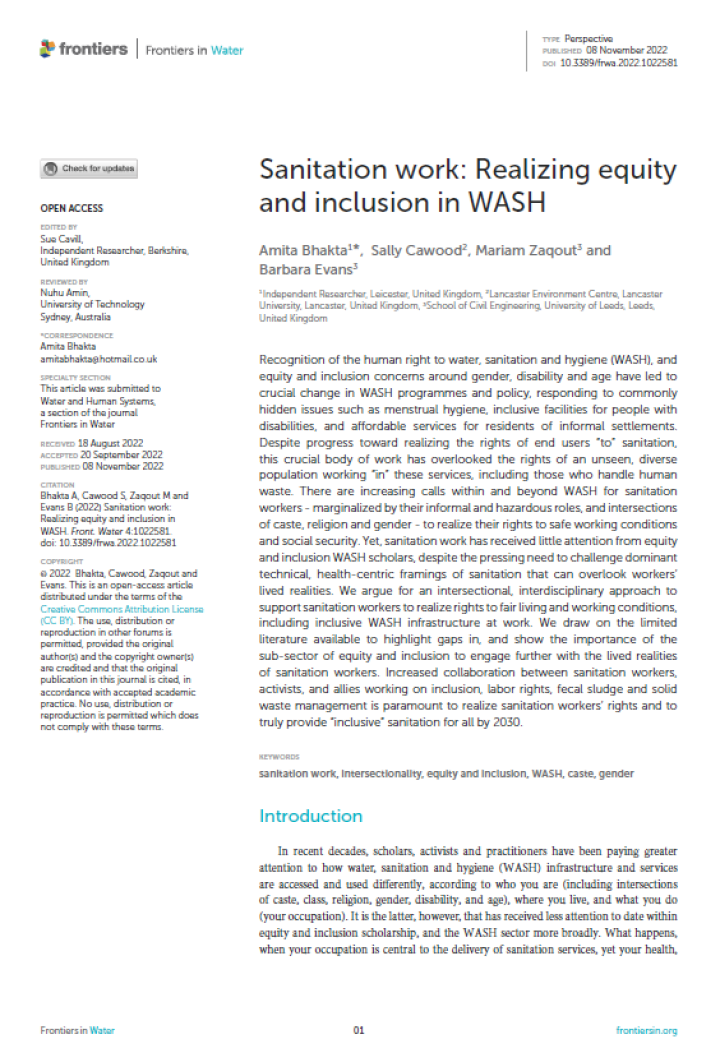
Amita Bhakta, Sally Cawood, Mariam Zaqout and Barbara Evans (2022) Sanitation work: Realizing equity and inclusion in WASH
Recognition of the human right to water, sanitation and hygiene (WASH), and equity and inclusion concerns around gender, disability and age have led to crucial change in WASH programmes and policy, responding to commonly hidden issues such as menstrual hygiene, inclusive facilities for people with disabilities, and affordable services for residents of informal settlements. Despite progress toward realizing the rights of end users “to” sanitation, this crucial body of work has overlooked the rights of an unseen, diverse population working “in” these services, including those who handle human waste. There are increasing calls within and beyond WASH for sanitation workers -marginalized by their informal and hazardous roles, and intersections of caste, religion and gender - to realize their rights to safe working conditions and social security. Yet, sanitation work has received little attention from equity and inclusion WASH scholars, despite the pressing need to challenge dominant technical, health-centric framings of sanitation that can overlook workers’ lived realities. The authors argue for an intersectional, interdisciplinary approach to support sanitation workers to realize rights to fair living and working conditions, including inclusive WASH infrastructure at work. They draw on the limited literature available to highlight gaps in, and show the importance of the sub-sector of equity and inclusion to engage further with the lived realities of sanitation workers. Increased collaboration between sanitation workers, activists, and allies working on inclusion, labor rights, fecal sludge and solid waste management is paramount to realize sanitation workers’ rights and to truly provide “inclusive” sanitation for all by 2030.
Sanitation Workers Forum 2021 (2022) Opening Welcome Address and Keynote (Bezwada Wilson) 29.11.21
Opening welcome address by the Forum organisers, followed by a Keynote by Bezwada Wilson from Safai Karmachari Andolan (SKA), an Indian human rights organisation campaigning for the eradication of manual scavenging.
Sanitation Workers Forum 2021 (2022) Thematic Session 2: Setting the Scene - Lessons from India & Kenya
This session explores the realities of sanitation work in urban settings across India and Kenya. Whilst distinct historically, socially, politically and geographically, hazardous forms of sanitation work (including manual pit or manhole emptying) persist in both countries. Speakers explore the changing realities of sanitation work in each country, including ways to improve working conditions for and with workers. Speakers 1. Samuel Sathyaseelan (PhD Scholar, Jawaharlal Nehru University, New Delhi, India). Talk Title: ‘Sanitation Workers – Expendable lives in times of COVID-19' 2. Dr. Ajay Kumar Koli (Assistant Professor, Vishwakarma University, India). Talk Title: ‘Management of manholes in India. Level of awareness about the manholes-related incidents and deaths’ 3. Natasha Sharma (PhD Scholar, Queen Mary University of London, UK) Talk Title: ‘Working and living conditions of manual scavengers. Worker’s rights and agency in Kolkata’ 4. Yvonne Wairimu (Student, Meru University of Science and Technology, Meru, Kenya) Talk Title: ‘Pit emptying practices challenges and stakeholder preferences in low income high density settlements in Nairobi’ 5. Dr. Joy Riungu (Director, Sanitation Research Centre, Meru University of Science and Technology, Meru, Kenya) Talk Title: ‘The role of informal pit emptiers in providing sanitation in Mukuru and Kibera, and the barriers to achieving improved services’ Chairs: Amita Bhakta & Purva Dewoolkar
Sanitation Workers Forum 2021 (2022) Thematic Session 3: Global Histories of Sanitation Work
This session explores the changing nature of sanitation work from a global and historical perspective. It sets out to challenge misconceptions that sanitation work (including hazardous forms) is confined to the so-called 'Global South', or that the 'Global North' has found the 'solutions' to safe sanitation for all. Drawing on experience in India, Pakistan, the USA and Nigeria, the session highlights the interconnections between sanitation work, colonialism and changing sanitary infrastructures across the world. Speakers 1. Hariprasad V.M (Researcher, Indian Institute of Technology, Bombay, India) Talk Title: ‘Evolution of sanitation work and workers in Alleppey town, India’ 2. Prof. Jo Beale (Emeritus Professor, London School of Economics, UK) Talk Title: 'Plus ça change: Municipal Sweepers in Karachi and Faisalabad 1995-2021' 3. Daniel Gerling (Associate Professor, Augustana University, USA) Talk Title: 'George Waring, King of Sanitation Workers: What Is and What Could Never Be' 4. John Uwa (Researcher/Cultural Archivist, DirtPol Sussex, UK) Talk Title: 'The Histories and Politics of Sanitary Policies in Precolonial, Colonial and Postcolonial Nigeria' Chairs: Jen Barr & Alix Lerebours
Sanitation Workers Forum 2021 (2022) In Conversation With Dr Hemangi Kadlak (Sanitation Workers Forum 2021)
A pre-recorded conversation between Dr Sally Cawood and activist, writer, researcher and teacher Dr Hemangi Kadlak (Assistant Professor, Vellore Institute of Technology, Tamil Nadu and Strivajin Foundation). In this recording, Dr Kadlak discusses the motivations for her research on sanitation workers and manual scavenging in India, with important takeways for us all.
Sanitation Workers Forum 2021 (2022) In Conversation With Dr Sharada Prasad (Sanitation Workers Forum 2021)
A pre-recorded conversation between Dr Jen Barr and consultant, researcher and photographer Dr CS Sharada Prasad, who is behind many of the striking images used by international agencies to highlight the everyday lives of sanitation workers (especially those involved in manual pit latrine, septic tank, sewer, drain or dry latrine cleaning) across India. In this recording, Dr Prasad reflects on some of his most poignant photographs to date, the ethics of photography in documenting sanitation work, and where we go from here.
Sanitation Workers Forum 2021 (2022) Thematic Session 4: Gender, Intersectionality & Sanitation Work
*French with English translation* This session examines the intersectional dimensions of sanitation work relating to gender, caste, class, race and age (including inter-generational change). The speakers cover particular challenges for women sanitation workers in India, Côte d'Ivoire, Madagascar and Senegal, and explore ways in which to visibilise often hidden or unseen working practices and lived experiences. This session examines the intersectional dimensions of sanitation work related to gender, caste, class, race and age (including intergenerational change). Speakers address the particular challenges of women sanitation workers in India, Côte d'Ivoire, Madagascar and Senegal, and explore ways to make work practices and lived experiences that are often hidden or invisible visible. Speakers: Angèle Koué (GEPALEF, Ivory Coast), Jeannine Bola Ramarokoto (SiMIRALENTA, Madagascar) & Mina Harivola Rakotoarindrasata (Gender in Action, Madagascar) [Pre-Recorded] Talk Title: 'Sanitation as a livelihood for women in Abidjan and Antananarivo' Video (with full captions) 2. Ndeye Penda Diouf (OGDF, Senegal) Talk Title: 'Women's invisible work in the sanitation Sector in Saint Louis Senegal' [Pre-Recorded] Video (will full captions) also here:https://youtu.be/iqiIaurSodQ 3. Abhilaasha Nagarajan (Indian Institute for Human Settlements/TNUSSP, India) Talk Title: 'Women sanitation workers: challenges & way forward' Chairs: Alix Lerebours, Nelly Leblond & Maisie-Rose Byrne
Sanitation Workers Forum 2021 (2022) Thematic session 5: Challenges & Opportunities Arising from Covid-19
This session examines the multiple ways in which Covid-19 has affected sanitation workers at their workplace and in their personal lives. The speakers highlight how the pandemic disproportionately impacted sanitation workers who were on the 'frontline', yet often had little to no personal safety equipment, work protections or faced intense work pressure. We discuss potential opportunities arising from the pandemic, including heightened attention on worker safety, including calls for the roll out of vaccinations and social security programmes, to support workers in the long-term. Speakers 1. Solomie Gebrezgabher (International Water Management Institute, Ghana) Talk Title: ‘Sanitation service provision in the face of the pandemic – Insights from vacuum truck operators in Ghana’
Sanitation Workers Forum 2021 (2022) 2nd Keynote Address: Ibra Sow & Alidou Bande
*French with English translation* Keynote address by Ibra Sow from AAAS & PASA (Sénégal) and Alidou Bandé from ABASE (Burkina Faso), followed by a Q&A. Chair: Dr Alix Lerebours
Sanitation Workers Forum 2021 (2022) Thematic Session 6: Occupational Health & Safety (OHS), Policies, Laws and Regulations
This session examines some of the ways in which to enhance Occupational Health and Safety (OHS) of sanitation work, via technical innovations, as well as targeted laws, policies and regulations. The speakers highlight a number of worker-centred avenues to strengthen OHS, as well as key gaps where further participatory research and advocacy is urgently needed. Speakers 1. Froggi VanRiper (Oregon State University, USA) Talk Title: ‘Container-Based Sanitation in Haiti: implications of service expansion on labor and exposure of sanitation workers’ 2. Bruce Rutayisire (Pit Vidura, Rwanda) Talk Title: 'Improving Sanitation Worker Health and Safety through Social Enterprise' 3. Pippa Scott (World Bank Consultant/I-San) Talk Title: ‘World Bank Sanitation Workers Initiative: occupational health and technology gaps’ 4. Rosie Renouf (Independent Consultant, UK) Talk Title: ‘Policies, laws, regulations and other instruments to support safe sanitation: occupational H&S: review, good practices, learning and recommendations’ 5. Gati Wambura (Washington State University, USA) Talk Title: ‘Formalisation of manual pit emptiers (Sanergy, Kenya): Mtaa Fresh Program. Before and after joining the programme’ Chairs: Mariam Zaqout & Amita Bhakta
Sanitation Workers Forum 2021 (2022) Traversing the Path of Making Manual Pit Cleaning Safer in LMICs
Thousands of lives of sanitation workers are endangered and lost in low and middle income countries (LMICs) while manually cleaning confined spaces like septic tanks and sewer lines. These deaths are avoidable if we take corrective measures. Join us to discuss leading practices that cities can observe to make work safer for sanitation workers! Speakers Prabal Bhardwaj, PMU- SBM, Ministry of Housing & Urban Affairs, India Huzir Rizal Mokhtar, Manager Health & Safety, O&M Department, IWK Malaysia Emily Banda, Sanitation Business Advisor, SNV Zambia Eva Muhia, Deputy President of Pan African Sanitation Actors (PASA) and Chair, Kenya Sanitation Actors Association Chair: Meghna Malhotra, Deputy Director, Urban Management Centre
Sanitation Workers Forum 2021 (2022) Good Practices Workshop: Garima Scheme, India (Sanitation Workers Forum 2021)
Includes reflections on the Garima Scheme in Odisha, India from G. Mathivathanan (Principal Secretary to Govt Housing & Urban Development Department, Government of Odisha, India), Manvita Baradi (Director, Urban Management Centre) and Meghna Malhotra (Deputy Director, Urban Management Centre). About Garima The Garima scheme for Safety and Dignity of Core Sanitation Workers was launched in 2020 by the Housing and Urban Development Department, government of Odisha in India. This landmark scheme aims to ensure the economic safety and social dignity of sanitation workers in the state. For more information, refer: http://www.urbanodisha.gov.in/pdf/GAR...
Sanitation Workers Forum 2021 (2022) Final Keynote Address: Mary James Gill
Keynote address by Mary James Gill from the Centre for Law and Justice (Pakistan), followed by Q&A.
Sanitation Workers Forum 2021 (2022) Looking Deeper: A Research Agenda to Advance the Health, Safety & Dignity of Sanitation Workers
Sanitation workers provide essential services often at cost of their health and dignity. Little research has been done and there is an urgent need for evidence for policy and programs. Participants in this workshop will hear from moderators on challenges and contribute to setting a global published research agenda by proposing research questions. Chairs: Kate Medlicott & Abisola Osinuga (World Health Organisation)
Sanitation Workers Forum 2021 (2022) In Conversation With Dr Amita Bhakta
A pre-recorded conversation between Dr Sally Cawood and independent consultant and researcher Dr Amita Bhakta.
Sanitation Workers Forum 2021 (2022) Connecting Labour Rights & Sanitation Workshop
Polite notice: This session includes detail (through the documentary film and presentations) about real-life cases of sanitation worker deaths and injuries, which some viewers/attendees may find upsetting* Workshop to connect key learnings from the labour and human rights sectors (on occupational health and safety, formalisation, collectivisation, worker entitlements and responding to labour violations) to ongoing advocacy on sanitation work in the Water, Sanitation and Hygiene (WASH) sector. Speakers 1. Carlos Carrión-Crespo (International Labour Organisation) 2. David Kapya (International Labour Organisation) 3. David Boys (Public Services International) 4. Documentary film introduced by Harsh Mander (Centre for Equity Studies) and Natasha Badhwar (Writer, Filmmaker & Activist), with Anam Sheikh and Sandeep Yadav 5. Vidit Verma, Suresh Garimella & Utkarsh Mishra (Centre for Equity Studies, India) Chairs: Dr Sally Cawood & Organising Committee
Sanitation Workers Forum 2021 (2022) Learning from Other Sectors Workshop
Workshop to connect key learnings from other sectors (for example, solid waste management, waste picking) to advocacy and research on sanitation work (human waste management) across the world. Speakers 1. Sonia Dias (WIEGO's Global Waste Expert) 2. Christy Braham (WIEGO, Belgium) 3. Lakshmi Narayan (KKPKP Waste Pickers Union, India) 4. Nalini Shekar (Hasiru Dala, India) 5. Dr Isack Rugemalila (U.G Mazingira Waste Pickers' Association, Mazingira Cooperative Society, Tanzania) Chair: Andrés Hueso González
Sanitation Workers Forum 2021 (2022) Sanitation Workers Forum 2021: Closing Remarks
Closing address including key learnings (from rapporteur), feedback from attendees and next steps.
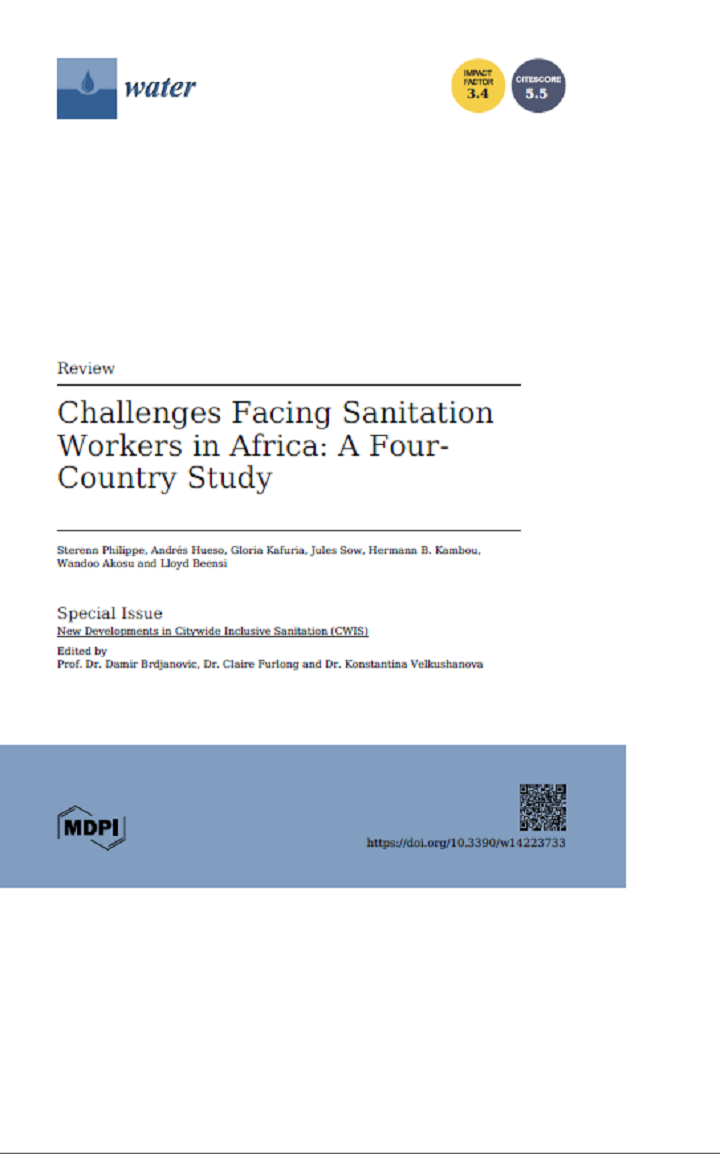
Sterenn Philippe, Andrés Hueso, Gloria Kafuria, Jules Sow, Hermann B. Kambou, Wandoo Akosu and Lloyd Beensi (2022) Challenges Facing Sanitation Workers in Africa: A Four-Country Study
Sanitation workers encounter significant challenges that jeopardize their dignity and health, crucial for achieving Sustainable Development Goals (SDGs). Despite their vital role, many governments in low- and middle-income countries neglect support for this workforce due to insufficient understanding of their needs and obstacles. The paper explores challenges faced by sanitation workers in Africa, including health risks, inadequate pay, legal vulnerability, and social stigma. Assessments conducted in Burkina Faso, Nigeria, Tanzania, and Zambia reveal widespread issues such as insufficient protective gear and healthcare access. Manual emptiers and informal workers are particularly vulnerable. The study calls for tailored government action plans, informed by national assessments and collaboration with worker groups, to improve conditions and support workers' well-being and dignity in line with SDGs.
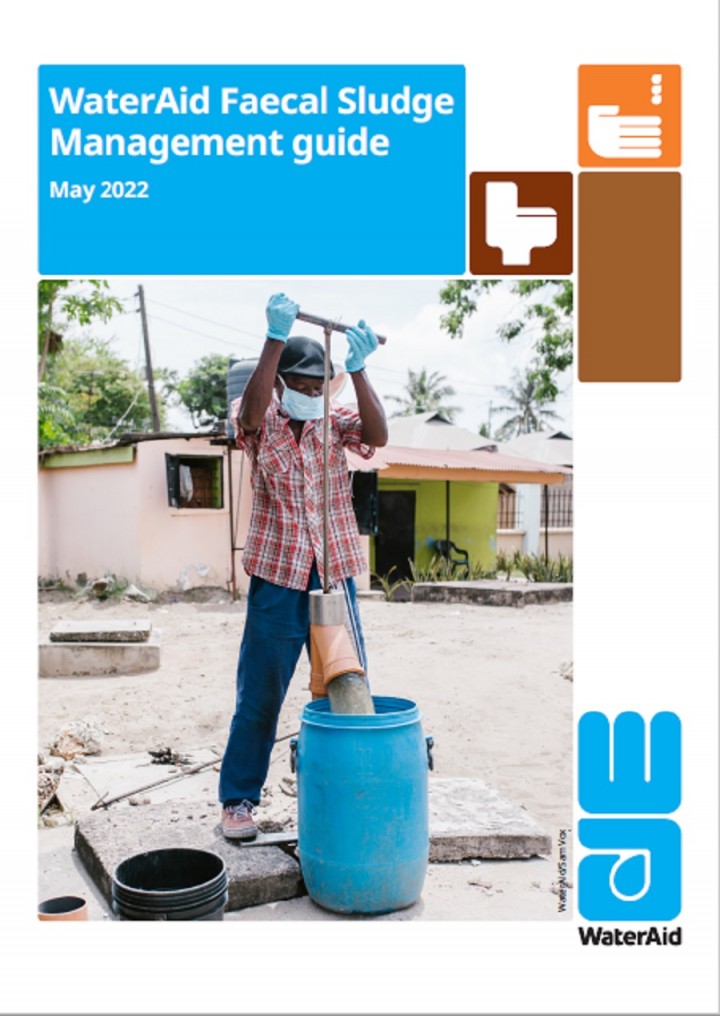
WaterAid (2022) Faecal sludge management guide
Faecal sludge management is the collection, transport, treatment and reuse or disposal of faecal sludge from pit latrines, septic tanks and other on-site sanitation technologies, and is crucial to achievement of the Sustainable Development Goals. You can use this guide as a reference document to help create better sanitation programmes, specifically to make sure sanitation is safely managed for everyone, everywhere. This guide does not replace the wealth of existing resources on faecal sludge management, but rather offers a subjective selection of approaches, principles, tools, technologies and projects.
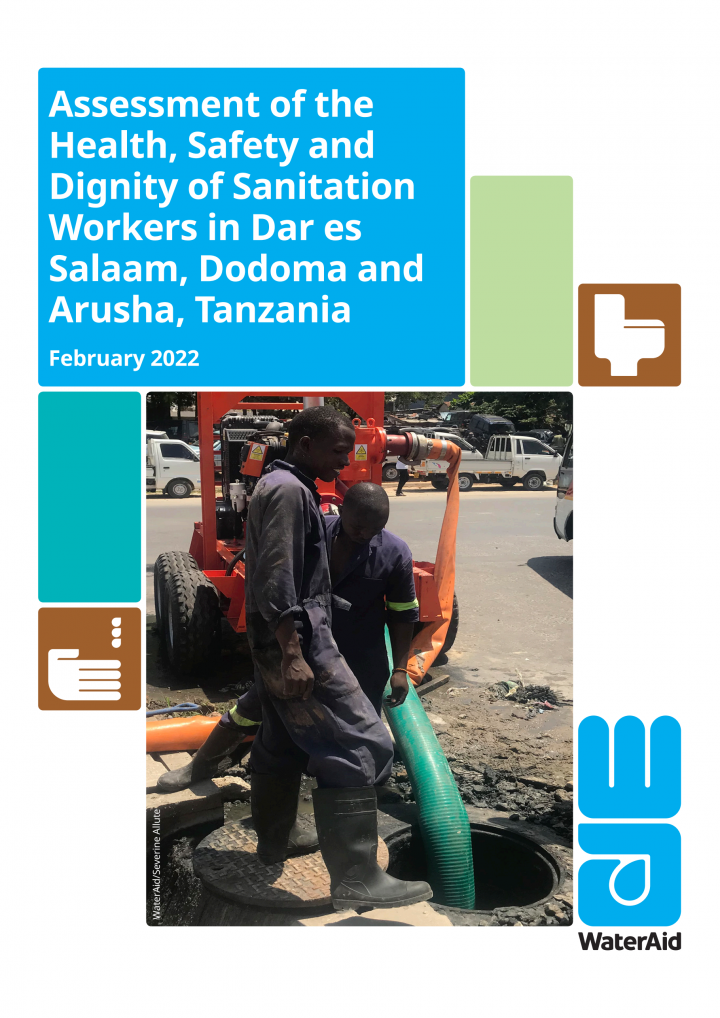
WaterAid (2022) Assessment of the Health, Safety and Dignity of Sanitation Workers in Dar es Salaam, Dodoma and Arusha, Tanzania
Sanitation workers provide an essential public service to reach Sustainable Development Goal 6.2, but often at the cost of their dignity, safety, health, and living conditions. A key barrier to providing support for this profession is the insufficient data on sanitation workers and their work environment. As such, the aim of this assessment was to explore opportunities to support sanitation workers in Tanzania, including strengthening the enabling environment. The methodology included a literature review and 19 Key Informant Interviews (KIIs) including sanitation workers, local government, and regulatory authorities. The assessment focused on three regions: Dar es Salaam, Dodoma, and Arusha. The assessment identified three major types of sanitation workers: (1) government employed workers, (2) private service providers, and (3) informal workers. Sanitation workers face different levels of challenges concerning stigma, discrimination, social security, financial security, legal recognition, and occupational hazards that can lead to illnesses and injuries. The assessment also confirmed that faecal sludge in Tanzania is extensively disposed of untreated into the environment. As such, the assessment identified the following recommendations to support sanitation workers and strengthen the enabling environment: • Advocate for the recognition of sanitation workers. • Develop the capacity of Local Government Authorities to register sanitation service providers. • Develop a suitable model for the formalisation of sanitation worker groups. • Promote innovative desludging equipment. • Develop an appropriate economic support model for sanitation workers. • Promote adherence to health and safety requirements. • Develop national guidelines on safe sanitation services.
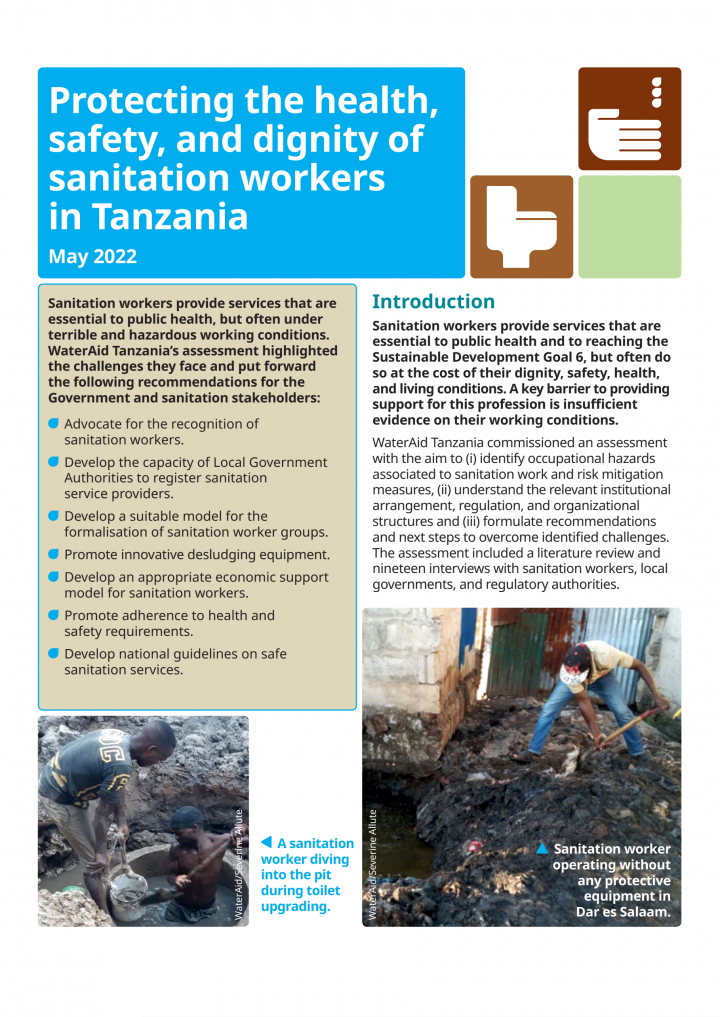
WaterAid (2022) Protecting the health, safety, and dignity of sanitation workers in Tanzania
Sanitation workers provide services that are essential to public health, but often under terrible and hazardous working conditions. WaterAid Tanzania’s assessment highlighted the challenges they face and put forward the following recommendations for the Government and sanitation stakeholders: • Advocate for the recognition of sanitation workers. • Develop the capacity of Local Government Authorities to register sanitation service providers. • Develop a suitable model for the formalisation of sanitation worker groups. • Promote innovative desludging equipment. • Develop an appropriate economic support model for sanitation workers. • Promote adherence to health and safety requirements. • Develop national guidelines on safe sanitation services.
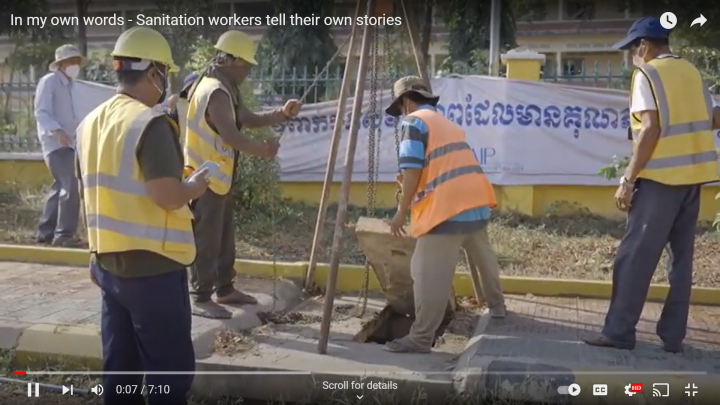
WaterAid Cambodia (2022) In my own words - Sanitation workers tell their own stories
Though a lot of efforts and supports have been provided to sanitation workers, still their nature of works are critical and dangerous to their health and hygiene, and most of the time lack of respect, support and collaboration from local people. Sanitation workers of in Battambang city have full right like other citizens. They are key workers that shall be treated with respect, recognition, appreciation and support from local government and citizens. This is the foundation for stopping stigmatisation and enabling safe and dignified working conditions for sanitation workers. WaterAid Cambodia with strong support from the Provincial Department of Public Works and Transport in Battambang is working to contribute to tackle the challenges that sanitation workers face and ensure their health, safety and dignity.
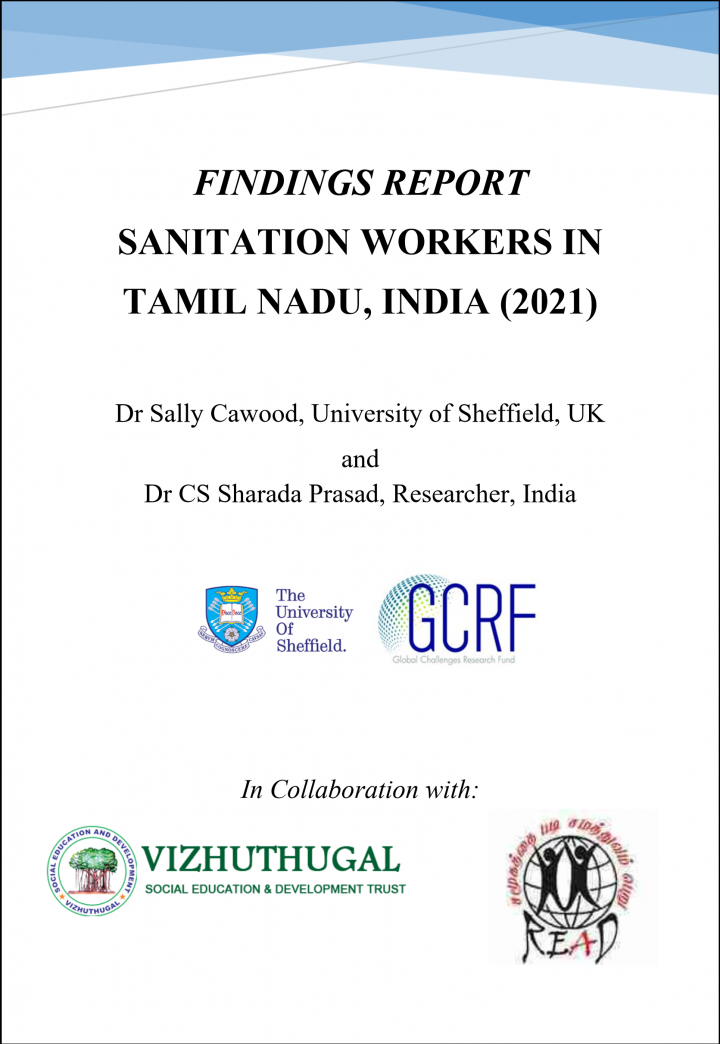
Cawood, S., Prasad, CS. S. (2021) Findings Report Sanitation Workers in Tamil Nadu, India
The overall aim of the project was to identify the ways in which sanitation workers can improve and/or move out of hazardous and degrading forms of sanitation work – specifically pit latrine, septic tank, drain and sewer cleaning and emptying – in urban areas (small towns and large cities). The dire working conditions of sanitation workers – men, women and children engaged in the handling and management of faecal matter – are gaining increasing attention in research, policy and practice. The challenges facing workers such as poor health and safety; low, irregular pay and limited access to finance, social stigma and discrimination, are increasingly well documented, leading to calls for the promotion of decent work, skill development and rehabilitation across the sector (WHO 2018; World Bank 2019; Zaqout et al 2020). Despite progress, hazardous and degrading forms of sanitation work, such as manual scavenging, persist in many countries, including India, where it remains largely unseen and unheard by planners, politicians and wider society (Prasad and Ray 2019). Within this setting, greater understanding is needed of the intersections between gender, caste, religion and livelihoods in shaping pathways into and out of degrading forms of sanitation work. The project will develop recommendations on pathways to exit degrading manual sanitation work, in collaboration with local partner organisations, to be shared via global forums, and regionally across South Asia, where sanitation work persists as a caste-based occupation.
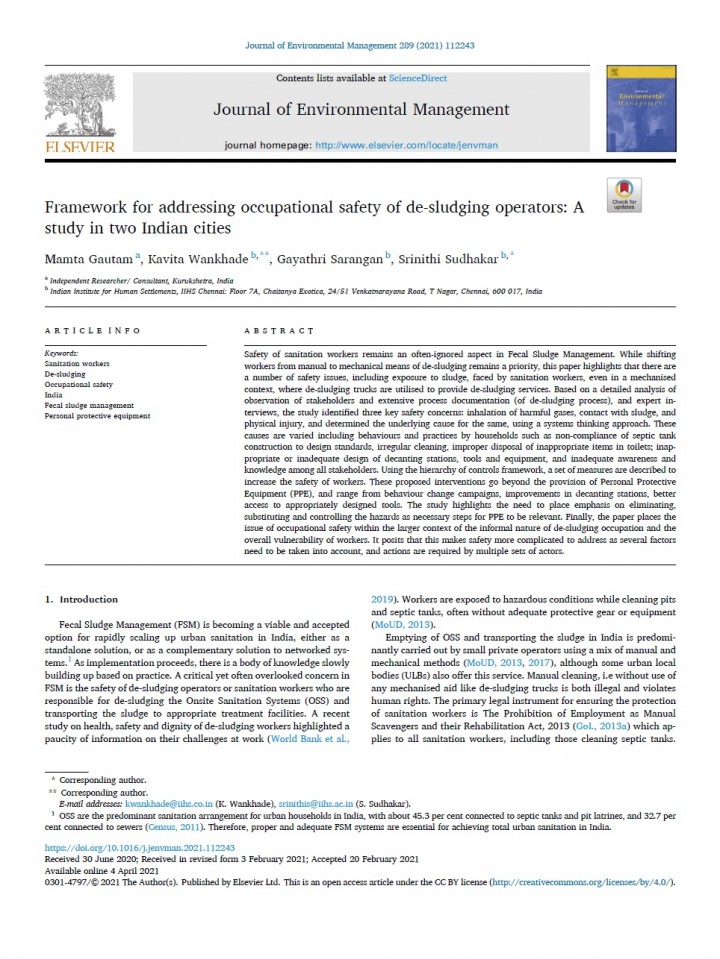
Gautam, M., Wankhade, K., Sarangan, G., Sudhakar, S. (2021) Framework for addressing occupational safety of de-sludging operators: A study in two Indian cities
Safety of sanitation workers remains an often-ignored aspect in Fecal Sludge Management. While shifting workers from manual to mechanical means of de-sludging remains a priority, this paper highlights that there are a number of safety issues, including exposure to sludge, faced by sanitation workers, even in a mechanised context, where de-sludging trucks are utilised to provide de-sludging services. Based on a detailed analysis of observation of stakeholders and extensive process documentation (of de-sludging process), and expert interviews, the study identified three key safety concerns: inhalation of harmful gases, contact with sludge, and physical injury, and determined the underlying cause for the same, using a systems thinking approach. These causes are varied including behaviours and practices by households such as non-compliance of septic tank construction to design standards, irregular cleaning, improper disposal of inappropriate items in toilets; inappropriate or inadequate design of decanting stations, tools and equipment, and inadequate awareness and knowledge among all stakeholders. Using the hierarchy of controls framework, a set of measures are described to increase the safety of workers. These proposed interventions go beyond the provision of Personal Protective Equipment (PPE), and range from behaviour change campaigns, improvements in decanting stations, better access to appropriately designed tools. The study highlights the need to place emphasis on eliminating, substituting and controlling the hazards as necessary steps for PPE to be relevant. Finally, the paper places the issue of occupational safety within the larger context of the informal nature of de-sludging occupation and the overall vulnerability of workers. It posits that this makes safety more complicated to address as several factors need to be taken into account, and actions are required by multiple sets of actors.
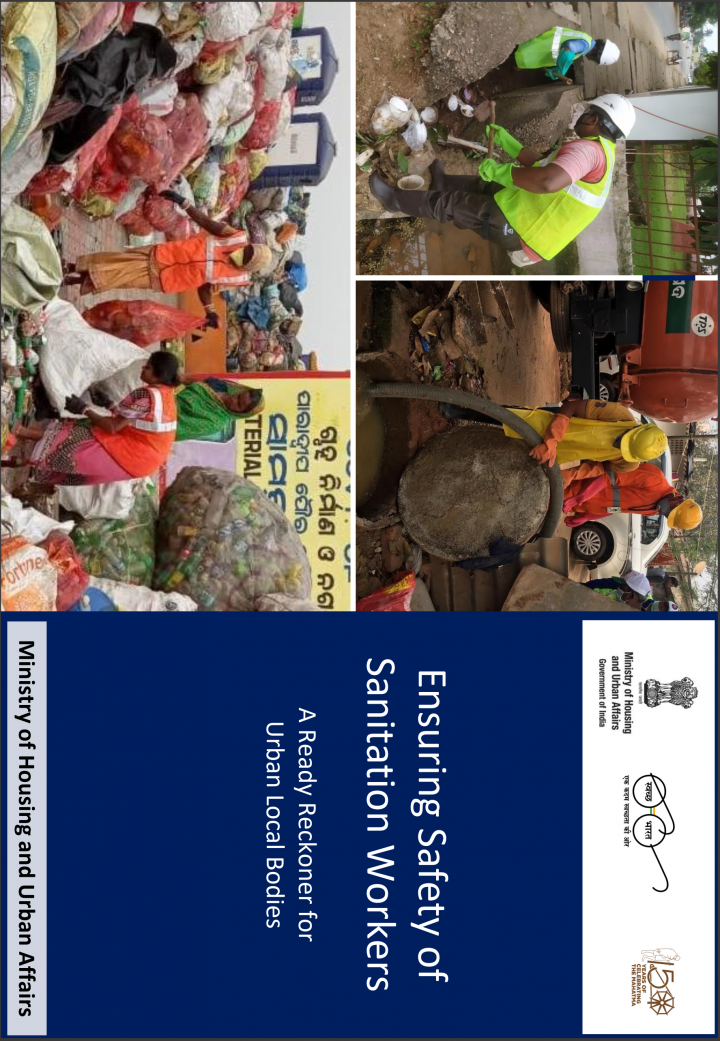
Ministry of Housing and Urban Affairs, Government of India (2021) Ensuring Safety of Sanitation Workers
Sanitation workers have been the foundation of the sanitation improvement story of urban India. Sanitation sector and various services provided under it are hazardous in nature — some are moderately hazardous while many of them are extremely hazardous. The working environment puts sanitation workers to a wide range of health risks and diseases due to exposure to harmful pathogens, chemicals and sharp objects. Consequently, there is an urgent need to ensure safety and humane working condition in all aspects and activities of sanitation.
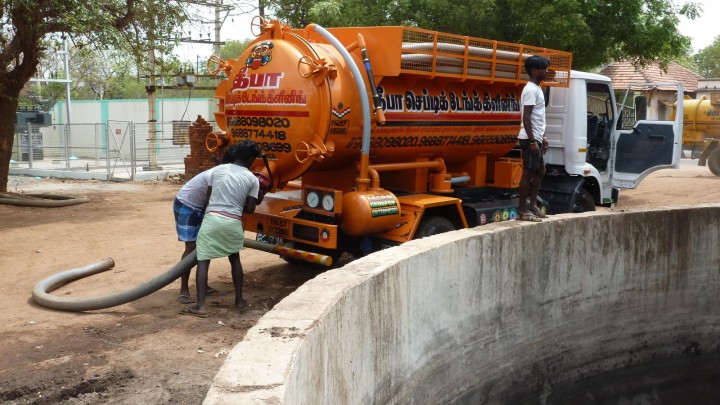
Peal, A. and Kapulu, C. (2021) City-level quantification and profiling of sanitation workers
Sanitation workers are a vital workforce, key to Sustainable Development Goal 6, and yet they are often denied their rights to safe work. But how can working conditions be improved, if authorities know nothing about them? This report presents options for how to carry out a quantification and profiling through assessments of workers at city level. The report contains the suggested scope for a sanitation worker assessment, the dimensions to be assessed, questionnaires that could be used to generate data on these different dimensions, and possible options for presentation of both quantitative and qualitative data. The focus of the latter is on infographics that are visually informative, a widely recognised strength of the SFD graphic.
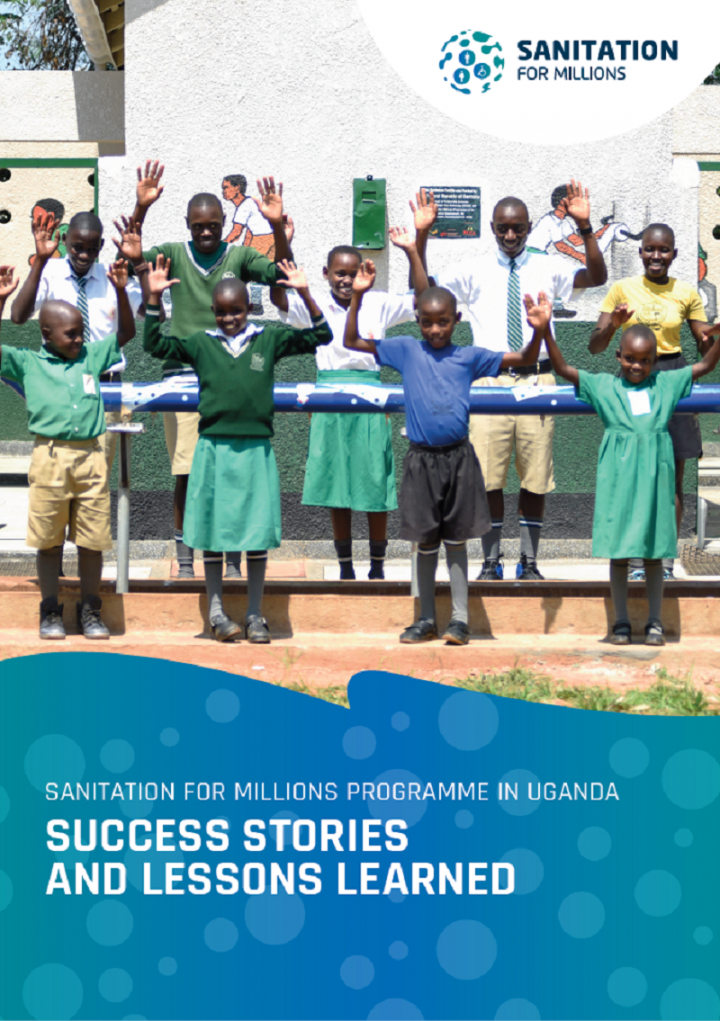
Sanitation for Millions Uganda implementation team (2021) Sanitation for Millions Programme in Uganda- Success stories and lessons learned
Sanitation for Millions is a global multi-donor programme to improve access to safe sanitation and hygiene with a focus on vulnerable and disadvantaged groups. More than one million people in 14 countries have already benefitted directly from Sanitation for Millions’ measures that include the construction of sanitary facilities, capacity development to ensure adequate use, operation and maintenance, behaviour change measures towards safe hygiene as well as improved wastewater management. Sanitation for Millions was commissioned in 2016 by the German Federal Ministry for Economic Cooperation and Development (BMZ) as lead donor and is co-financed by the Bill & Melinda Gates Foundation, Water Unite, the Hungarian Ministry of Foreign Affairs and Trade and the Inter-American Development Bank. The Deutsche Gesellschaft für Internationale Zusammenarbeit (GIZ) GmbH implements the programme in close cooperation with local partners. In Uganda, programme activities have started in 2017 and centred on schools and healthcare facilities (HCFs) as entry points. The activities have been broadened to encompass financing mechanisms and community-wide sanitation with a focus on household on-site sanitation (OSS) and faecal sludge management (FSM). Sanitation for Millions targets improvementsin the sanitation and hygiene situation in various towns in Uganda. The programme operates in Kampala, the capital city, as well as in smaller towns in the North of the country. Interventions are implemented in direct partnership with the Kampala Capital City Authority (KCCA), Apac Municipal Council (MC), the Town Councils of Aduku and Ibuje and the Ministry of Water and Environment (MWE), with support from the Ministry of Education and Sports (MoES) and the Ministry of Health (MoH).
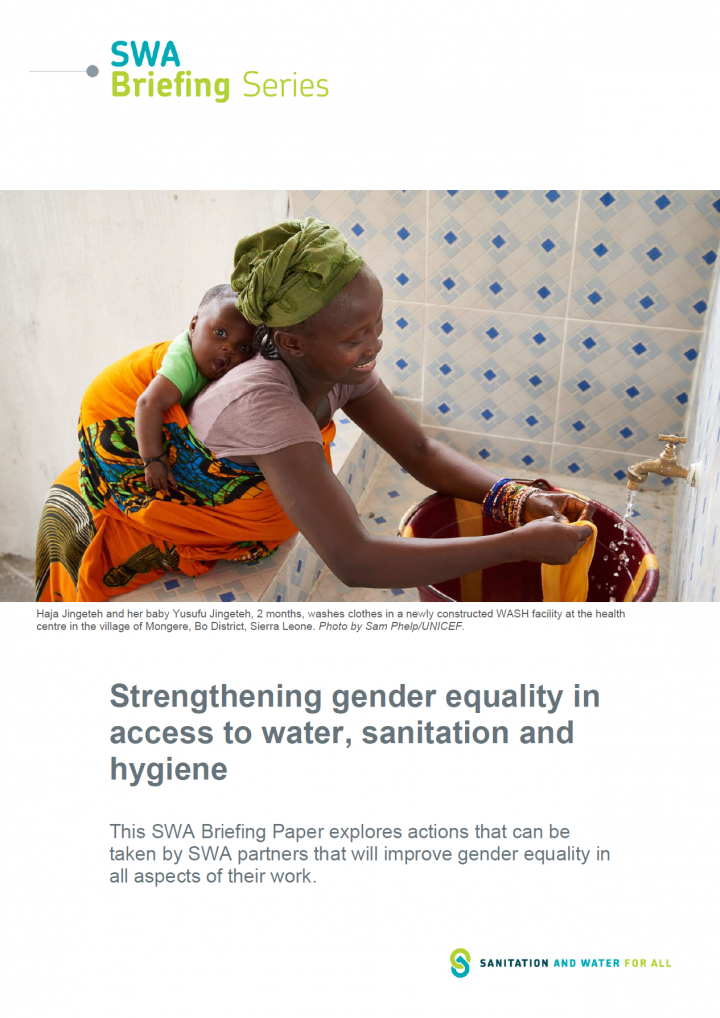
SWA (2021) Strengthening gender equality in access to water, sanitation and hygiene
This SWA Briefing Paper explores actions that can be taken by SWA partners that will improve gender equality in all aspects of their work. While there has been significant progress over the last few decades, gender inequality continues to be one of the most pervasive human rights violations throughout the world. Despite considerable attention and commitment, including through the SDGs’ gender equality goal, no country has yet successfully eliminated this form of discrimination. As in all sectors, there are gender inequalities regarding access to water, sanitation and hygiene. These inequalities are a result both of social constructions of gender, which rely on harmful stereotypes about women’s and girls’ roles and responsibilities in the household and community, and of biological factors which only impact women and girls. Social constructions of gender often dictate women’s domestic tasks, such as collecting water and caring for the family, as well as women’s roles as community and health workers, where women comprise 70 per cent of the health workforce, while holding only 25 per cent of senior roles. Social constructions also include the stereotypes of ‘femininity’, for example regarding the perceived need for female modesty, which can impact how and where women and girls are able to access sanitation.
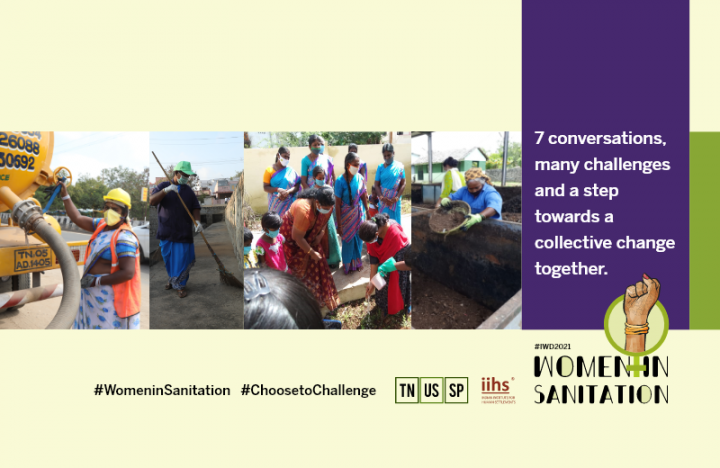
TNUSSP (2021) Women in Sanitation Campaign 2021
To celebrate the occasion of International Women’s day on March 8 th , the Tamil Nadu Urban Sanitation Support Programme (TNUSSP) and the Indian Institute for Human Settlements (IIHS) has launched a social media campaign on women in sanitation. The stories being shared on social media raises important questions, not just to women but also to men who are playing different roles across the full cycle of sanitation. This year’s theme #ChoosetoChallenge, features seven stories of women and men fighting gender bias and stereotypes to move towards an equal world. The videos feature community workers, sanitation workers and women from Self-Help Groups (SHG) who highlight their challenges and the need to bring about equity for change. Aravalli, Kavya, Vani, Vinitha, Sangeetha and Prema were the women featured in the videos, and Ambalavannan talks about his journey of working with sanitation workers, especially women and marginalised groups and empowering them through alternate livelihoods. The stories will serve as an eye-opener to not only the sanitation community but to all communities of work on existing gender biases, the need to #choosetochallenge, and to celebrate women’s achievements. At the end of each video, the stakeholders pledged to #ChoosetoChallenge to create an inclusive world.
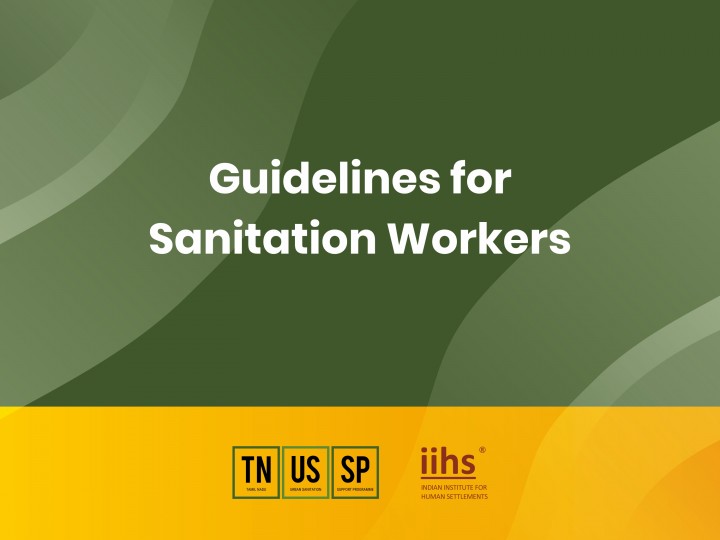
TNUSSP (2021) Guidelines for Sanitation Workers
Sanitation has been declared one of the essential services during the COVID-19 crisis. Sanitation workers are an integral part of sanitation service delivery and TNUSSP team has been engaging with them with the objective of improving their safety, health and welfare. In response to the current public health crisis, TNUSSP has developed a set of guidelines for different categories of sanitation workers such as community/public toilet cleaners, de-sludging operators and FSTP operators based on their nature of work. These guidelines cover i) general preventive and mitigation measures, ii) hand washing and iii) appropriate use and disposal of personal protective equipment. Additionally, we have also prepared a guideline for the safe and sustained operation of the Fecal Sludge Treatment Plants (FSTPs). These guidelines are in line with the latest WHO and government protocols. They may change as new information emerges.
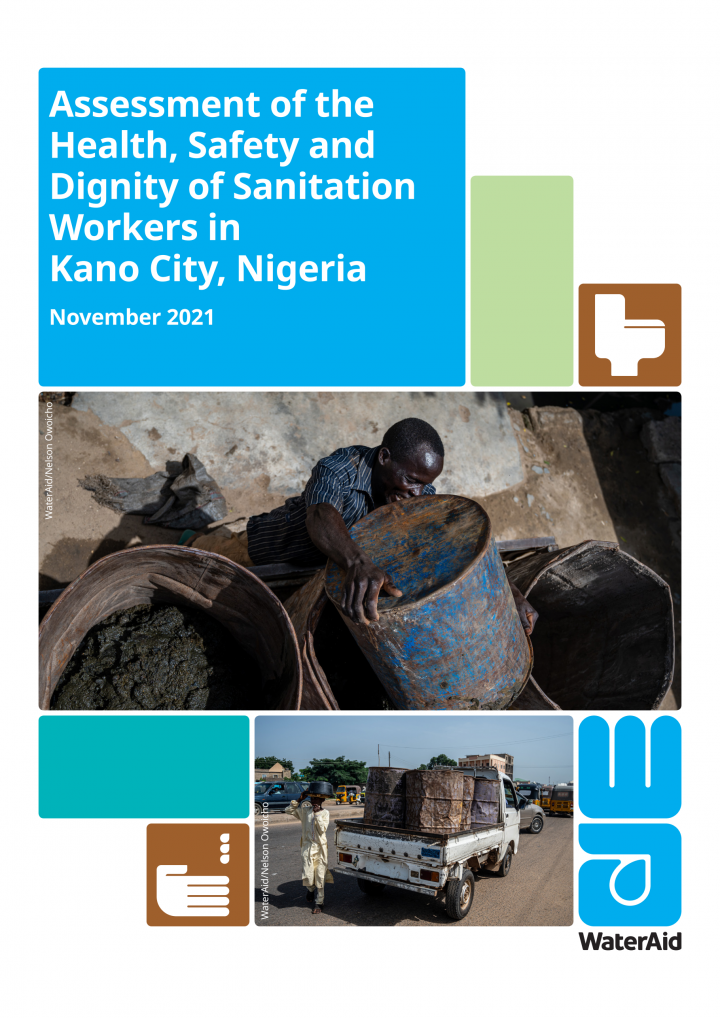
WaterAid (2021) Assessment of the Health, Safety and Dignity of Sanitation Workers in Kano City, Nigeria
Sanitation workers provide an essential public service to reach Sustainable Development Goal 6.2, but often at the cost of their dignity, safety, health, and living conditions. A key barrier to providing support for this profession is the insufficient data on sanitation workers and their work environment. As such, the aim of this assessment was to explore opportunities to support sanitation workers in Nigeria, including strengthening the enabling environment. The assessment focused on Kano City and the methodology included a literature eview, Focus Group Discussions (FGDs), Key Informant Interviews (KIIs), and In-Depth Interviews (IDIs). The majority of the 45 participants were sanitation workers and officials from the Manual Pit Emptiers Association and the Vacuum Trucks Owners Association. Other participants included relevant government officials, traditional and religious leaders, and academics. The assessment identified two major types of sanitation workers in Kano City: Manual emptiers (50 groups) and mechanical/gully emptiers (12 private companies). 94% of sanitation workers were forced into this profession due to economic hardship. Sanitation workers are aware of the risk attached to their profession, yet only 25% reported to have used Personal Protective Equipment (PPE), while 75% don’t use any. Sanitation workers in Kano City face various challenges, including access to office and parking space, the use of old tools and vehicles, and occupational hazards that can lead to illnesses, injuries, or even death. In addition, the current enabling environment does not support sanitation workers, with a weak institutional arrangement and legal framework and access to only three designated faecal sludge disposal sites. The assessment confirmed that faecal sludge in Kano City is extensively disposed of untreated into the environment. Disposal practices vary depending on the season but include sanitation workers dumping faecal sludge into drains on the city’s outskirts. As such, the assessment identified the following recommendations to support sanitation workers and strengthen the enabling environment: • Reform policies, regulations, guidelines, and institutional arrangement. • Construct, operate and maintain faecal sludge treatment plants (FSTPs). • Provide support to sanitation workers (e.g., financial tools, equipment). • Improve health and safety for sanitation workers. • Revisit the health and safety guidelines for sanitation workers. • Register and license the sanitation workers’ organisations. • Develop and implement a behaviour change campaign on the rights • and dignity of sanitation workers. • Establish partnerships with various stakeholders.
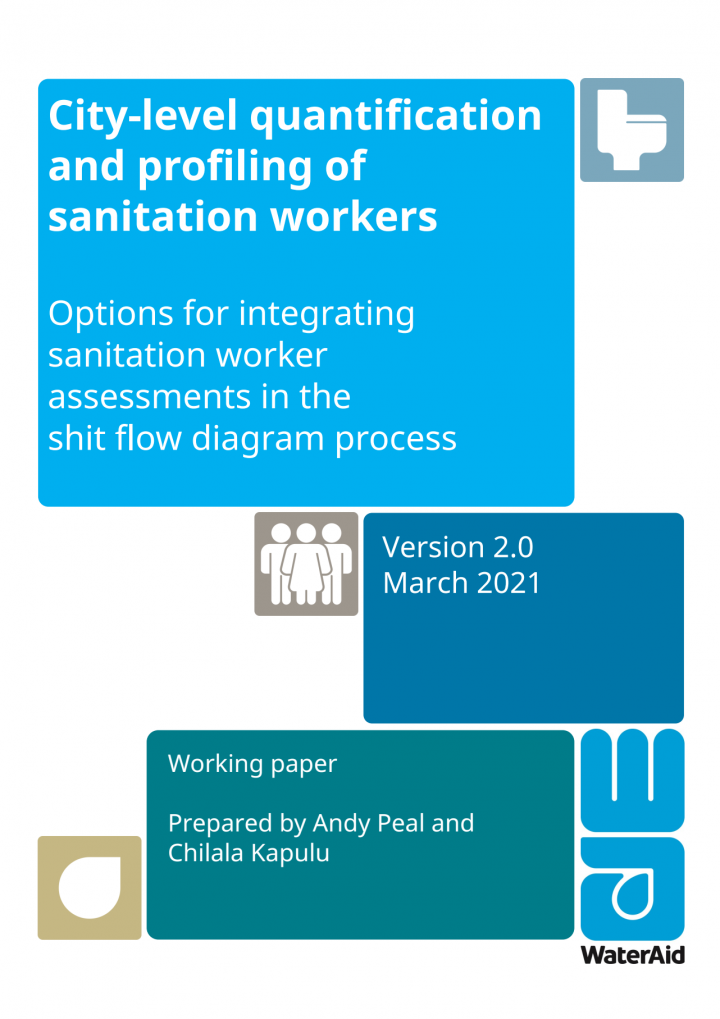
WaterAid (2021) City-level quantification and profiling of sanitation workers : Options for integrating sanitation worker assessments in the shit flow diagram process
This report presents options for how to carry out a quantification and profiling through assessments of workers at city level. The report contains the suggested scope for a sanitation worker assessment, the dimensions to be assessed, questionnaires that could be used to generate data on these different dimensions, and possible options for presentation of both quantitative and qualitative data. The focus of the latter is on infographics that are visually informative, a widely recognised strength of the SFD graphic
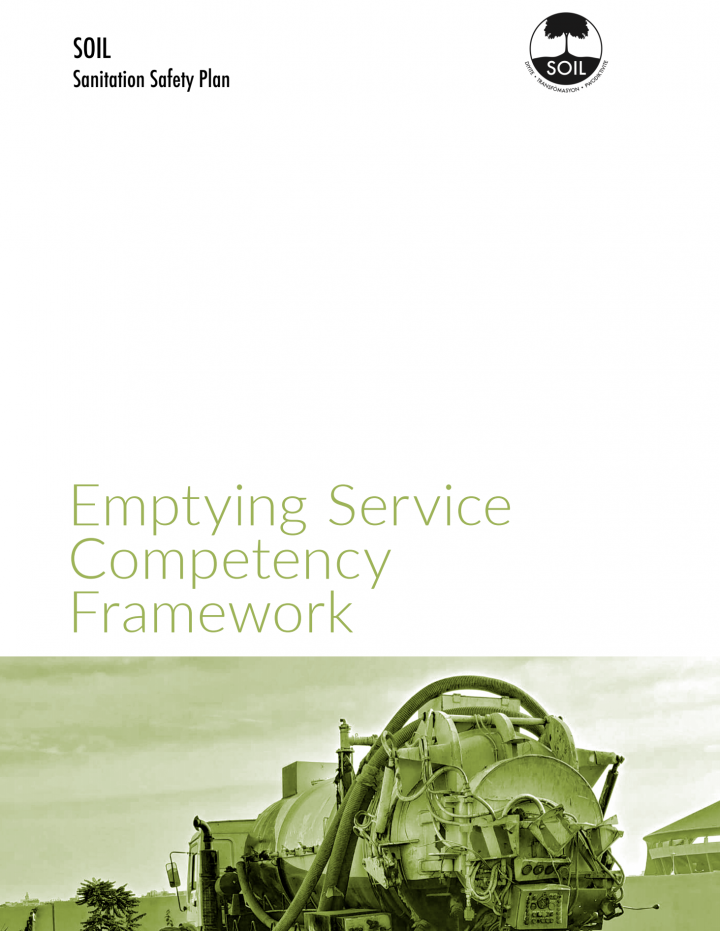
CAWST (2020) Emptying Service Competency Framework
This competency framework is designed to be a tool for emptying service providers, and the capacity development organizations that work with them, to understand the knowledge, skills, and abilities required to deliver a high-quality service. This competency framework can be used by: 1. Emptiers and capacity development organizations to structure professional development activities for emptying service providers, by outlining required knowledge, skills, and abilities. 2. Municipalities and utilities to begin thinking about the certification of emptying businesses by outlining all that is required to deliver a high-quality emptying service.
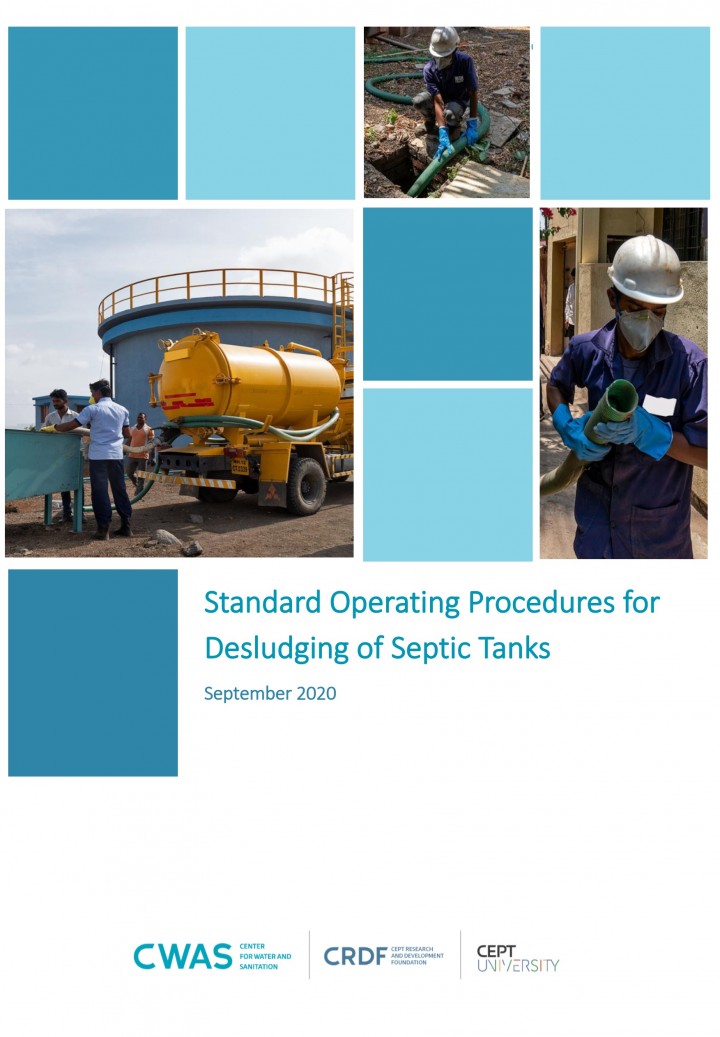
Center for Water and Sanitation CRDF; CEPT University (2020) Standard Operating Procedures for Desludging of Septic Tanks
It is known that eradicating open defecation is only half the battle. For improving sanitation, faecal sludge and wastewater also needs to be safely managed. It is in this context that Government of India, Ministry of Housing and Urban Affairs (MoHUA) issued a National Faecal Sludge and Septage Management (FSSM) Policy3 . It recommends regular desludging of septic tanks through a systematic extraction and collection procedure which will be essential to check environmental pollution. CPHEEO suggests septic tanks should be cleaned at least once in two - three years4
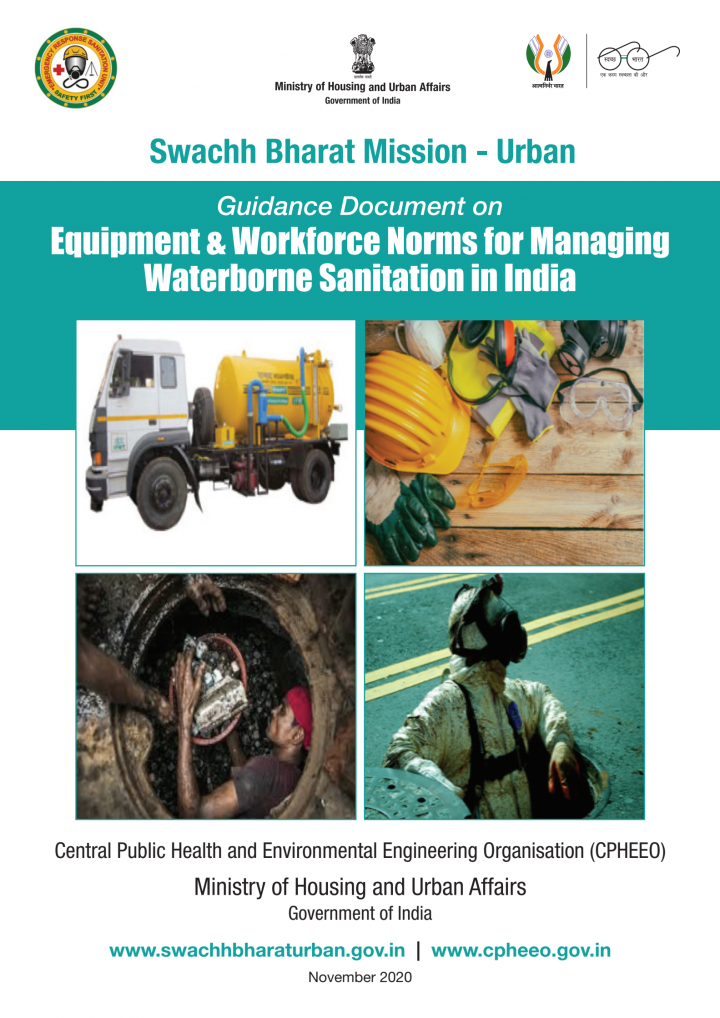
Central Public Health and Environmental Engineering Organisation (CPHEEO) (2020) Guidance Document on Equipment & Workforce Norms for Managing Waterborne Sanitation in India
This Guidance Document on Equipment & Workforce Norms for Managing Waterborne Sanitation in India is prepared keeping in view the Safai-mitra Suraksha Challenge, 2021. All sanitary structures like sewer and septic tanks which manage sewage are susceptible to getting choked at some point of time due to ingress and settling of solids and require regular cleaning or maintenance. Cleaning of sewer and septic tank sometimes require manual entry and if done without personal protective equipment & safety gears leads to injury to the sanitary worker and even death. To eradicate this heinous act of hazardous cleaning, Govt. of India is adopting multi-pronged approach which includes regulatory and programmatic approaches. This guidance document contains inter-alia, norms for procurement by ULBs in respect of inspection equipments, cleaning equipment, norms for workmen for septic tank & sewer cleaning etc. It also contains norms for specially trained sewer entry professional as well as management of emergency cleaning requirements namely - setting up of Responsible Sanitation Authority and Sanitation Response Unit etc.
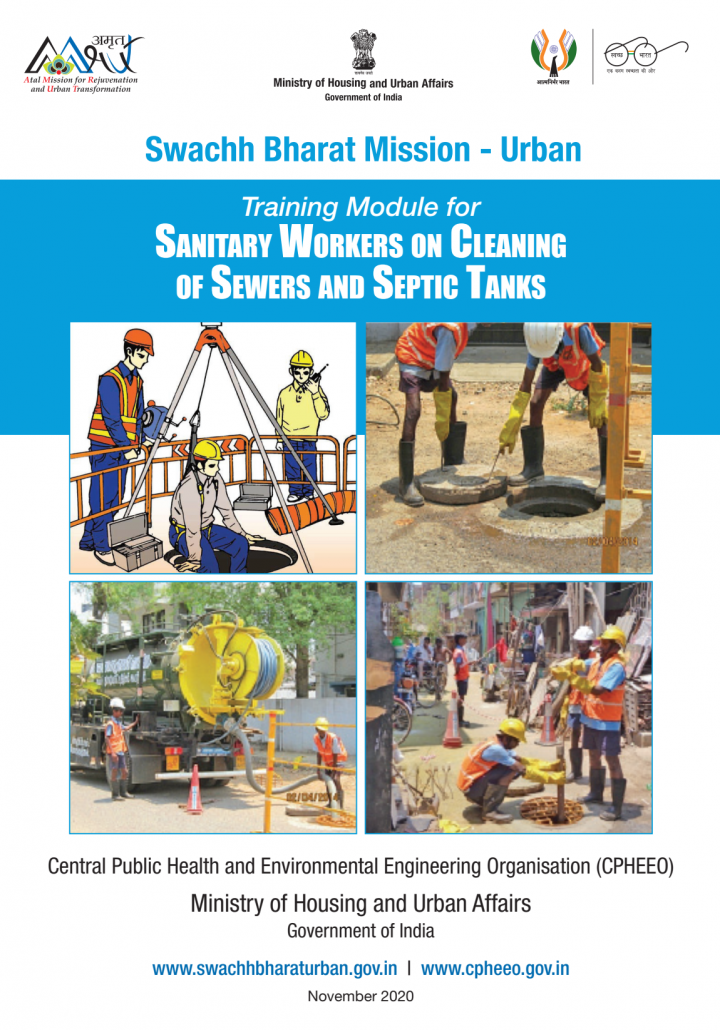
Central Public Health and Environmental Engineering Organisation (CPHEEO) (2020) Training Module for Sanitary WorkerS on Cleaning of SeWerS and SeptiC tankS
• Prohibition of Employment as Manual Scavengers and their Rehabilitation Act 2013 bans hazardous cleaning of sewer/ septic tanks. • Definition: Hazardous cleaning by an employee, in relation to a sewer or septic tank, means its manual cleaning by such employee without the employer fulfilling his obligations to provide protective gear and other cleaning devices and ensuring observance of safety precautions, as may be prescribed or provided in any other law, for the time being in force or rules made thereunder. • Hazardous cleaning exposes employee to incidents like falls/ slips, fire or explosion, oxygen depletion, gas poisoning, heat stress, drowning, in some extreme cases, loss of life as well.
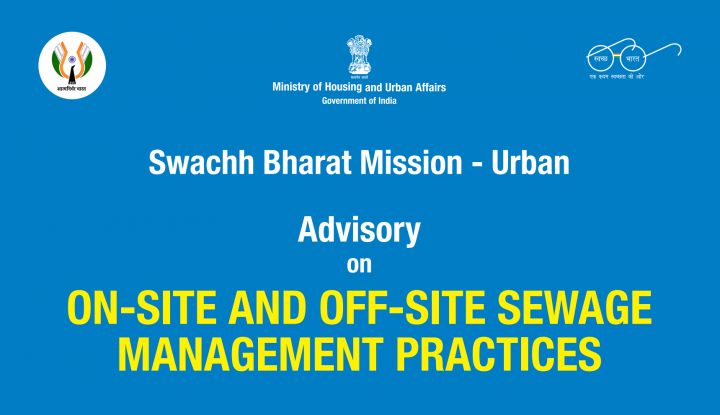
Central Public Health and Environmental Engineering Organisation (CPHEEO) (2020) Advisory on On-Site and Off-Site Sewage Management Practices
The fast pace of urbanization – primarily due to the quest for good quality education, healthcare facilities, job opportunities, rapid changes in lifestyle and growing aspirations in urban areas– coupled with spurt in economic activities has compounded the sanitation challenges in urban areas, as creation of sanitation infrastructure could not keep pace with urbanization. India is signatory to SDGs requiring sustainable sanitation for all by 2030. Contrary to the goal, only 40% of urban population is serviced with sewerage system and the remaining 60% of the urban population is dependent on sub-optimally regulated On-site Sanitation systems.
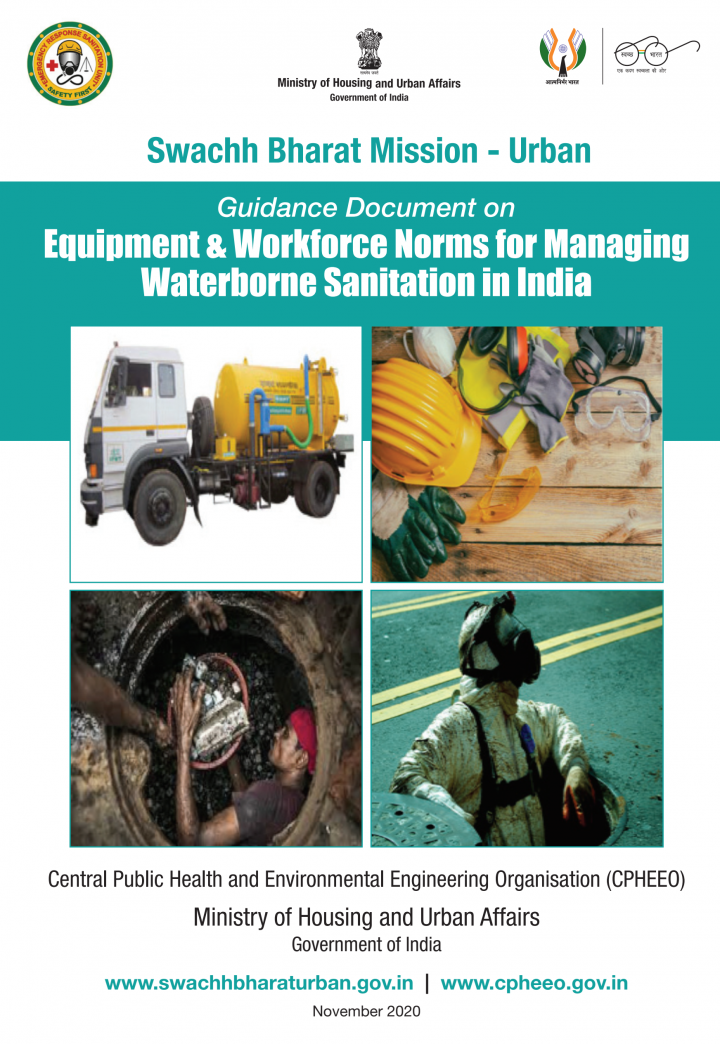
Central Public Health and Environmental Engineering Organisation (CPHEEO) (2020) Guidance Document on Equipment & Workforce Norms for Managing Waterborne Sanitation in India
This Guidance Document on Equipment & Workforce Norms for Managing Waterborne Sanitation in India is prepared keeping in view the Safai-mitra Suraksha Challenge, 2021. All sanitary structures like sewer and septic tanks which manage sewage are susceptible to getting choked at some point of time due to ingress and settling of solids and require regular cleaning or maintenance. Cleaning of sewer and septic tank sometimes require manual entry and if done without personal protective equipment & safety gears leads to injury to the sanitary worker and even death. To eradicate this heinous act of hazardous cleaning, Govt. of India is adopting multi-pronged approach which includes regulatory and programmatic approaches. This guidance document contains inter-alia, norms for procurement by ULBs in respect of inspection equipments, cleaning equipment, norms for workmen for septic tank & sewer cleaning etc. It also contains norms for specially trained sewer entry professional as well as management of emergency cleaning requirements namely - setting up of Responsible Sanitation Authority and Sanitation Response Unit etc.
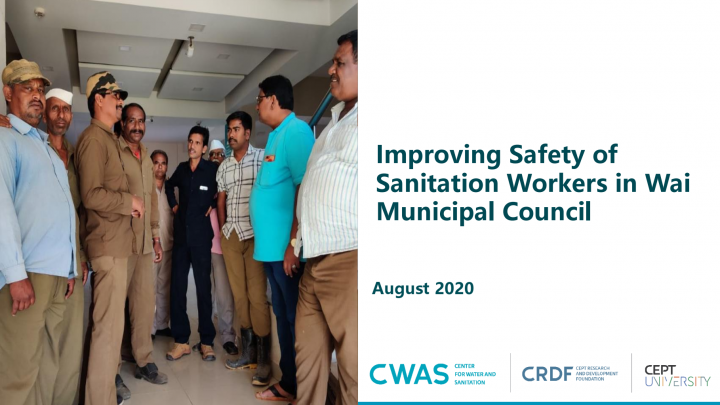
CWAS (2020) Improving Safety of Sanitation Workers in Wai Municipal Council
In 2018, Wai was chosen as one of the eight cities across the globe for the City Wide Inclusive Sanitation Program (CWIS) funded by Bill & Melinda Gates Foundation (BMGF). The municipal council of Wai (WMC) with support from Center of Water and Sanitation (CWAS), CRDF, CEPT University (CEPT) is aiming to implement the CWIS goals and principles in Wai. Under the CWIS framework, one of the aspects is Safety. As a part of our work on safety and inclusivity, a study on understanding the sanitation workers was conducted. The study focused on use of Personal Protective Equipment (PPE). The findings of this study were used to draft recommendations for WMC. The recommendations were implemented by WMC, resulting in an overall improvement in the working conditions of all sanitation workers in Wai. The report showcases how sanitation worker safety has been institutionalized in Wai.
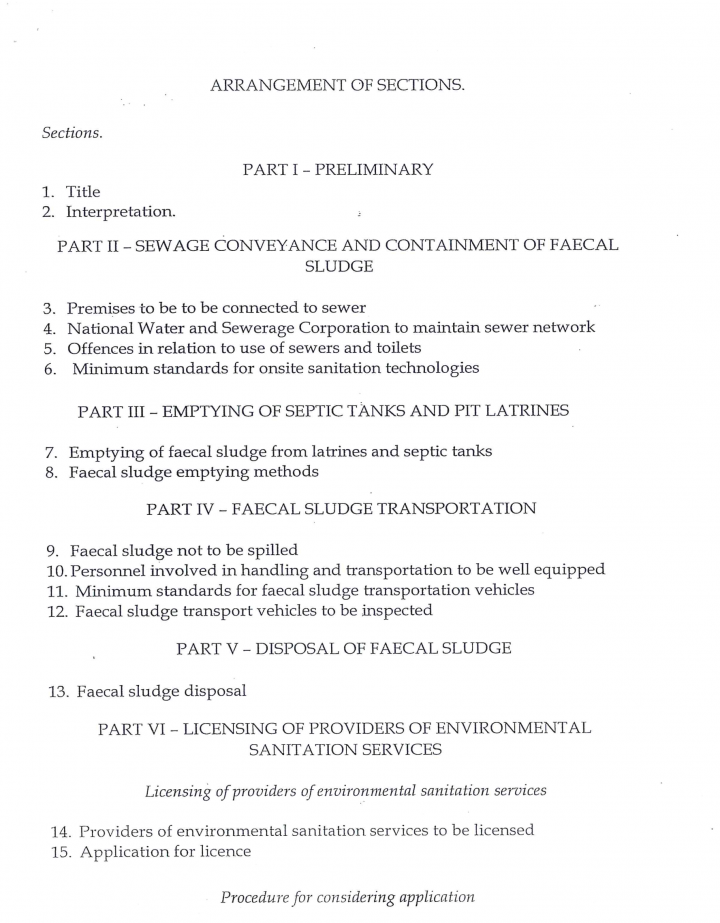
Kampala Capital City Authority (2020) Sewerage and FSM Ordinance
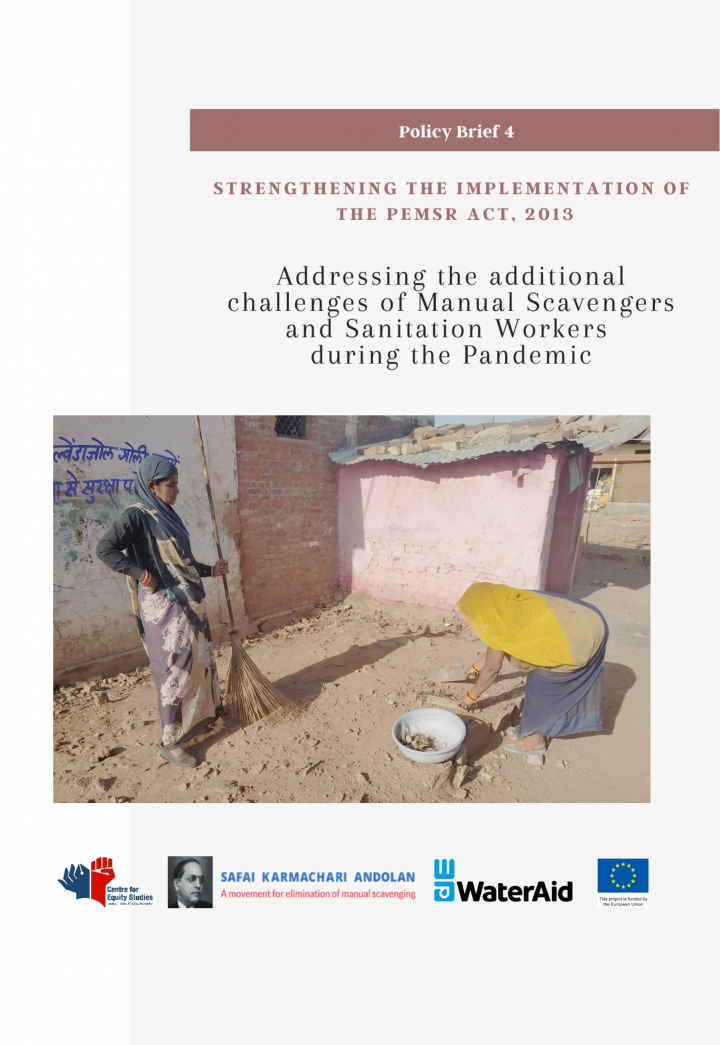
Mander, H., Kumbhare, S., Bhattacharya, A., Chanchani, M. (2020) Addressing the additional challenges of Manual Scavengers and Sanitation Workers during the Pandemic
Sanitation workers in India, usually belonging to the most vulnerable and marginalized caste groups and communities, had already been facing several challenges including health risks, low and irregular wages, financial struggles, societal discrimination, and lack of access to social security measures. The COVID-19 pandemic resulted in additional struggles for them, as some of them were required to continue work on the frontline even during the lockdown. On the other hand, those who were engaged in informal work, such as cleaning of dry latrines, and rag/waste picking, lost their livelihoods and faced severe financial distress and hunger.
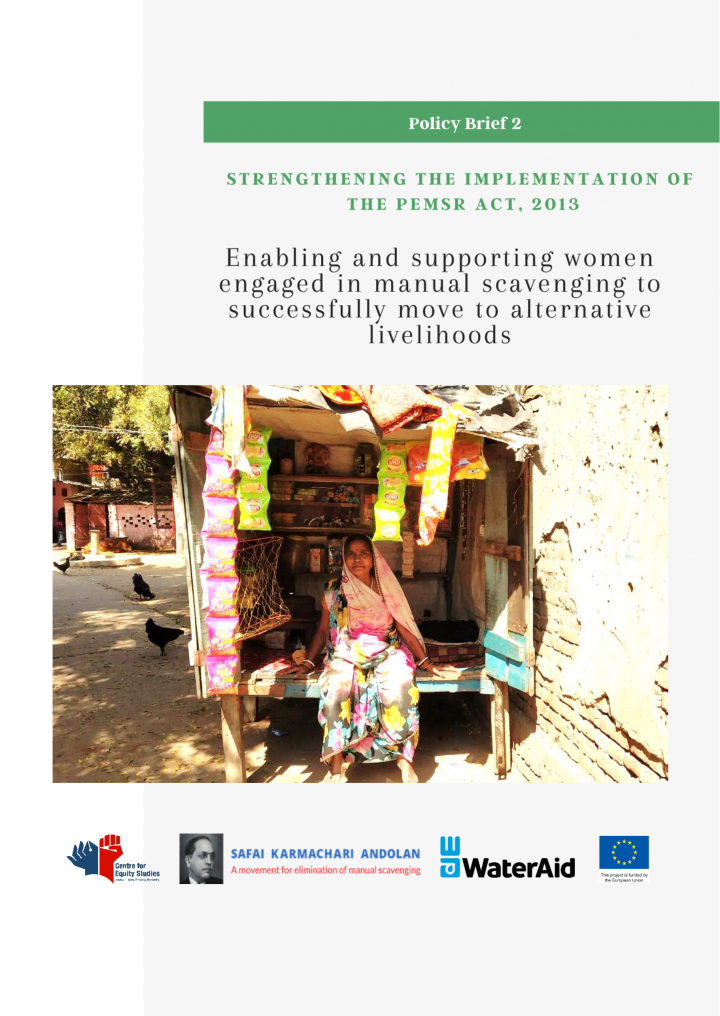
Mander, H., Kumbhare, S., Bhattacharya, A., Chanchani, M. (2020) Enabling and supporting women engaged in manual scavenging to successfully move to alternative livelihoods
In India, gender and caste plays a dominant role in the kinds of jobs that women in the workforce are employed in. It is well established that caste and patriarchy are the main compulsive factors that force people, especially women of the specific scheduled caste communities, into manual scavenging. They are into different forms of manual scavenging, mainly cleaning the insanitary dry latrines and carrying and disposing the human faeces thereof and assisting male folks in carrying and disposing the waste from septic tanks and other sources. Safai karamchari women are discriminated against, due to the fact that they are poor, Dalits and women. They are not only discriminated against by society and administrative systems at large, but also within their own communities where patriarchy persists. A number of studies have shown that more women are engaged in manual scavenging than men.
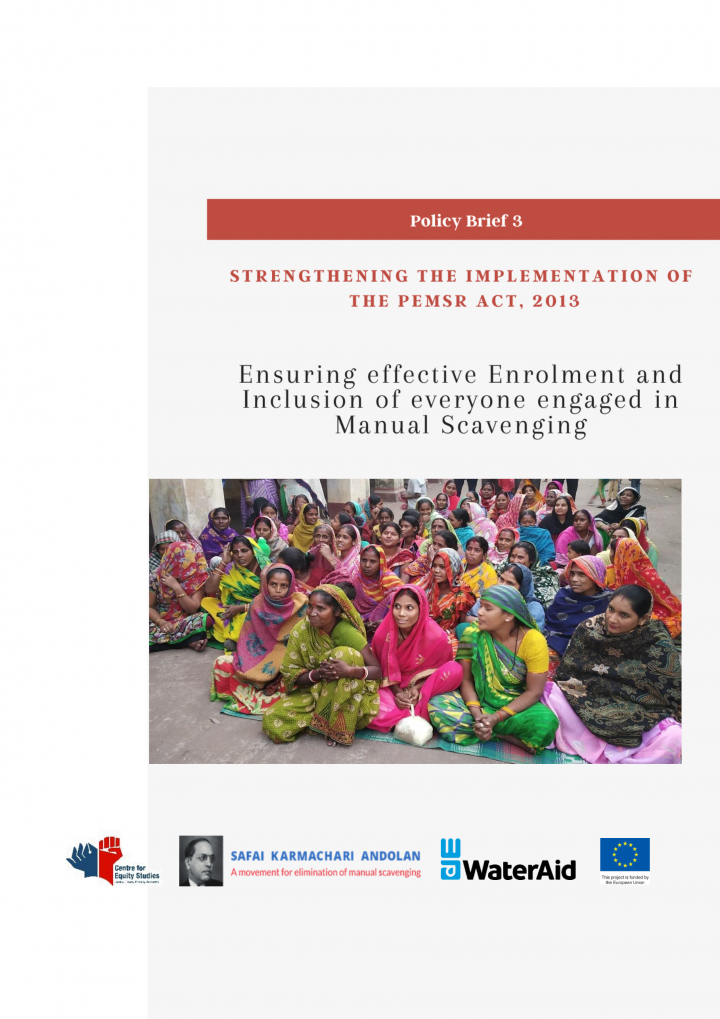
Mander, H., Kumbhare, S., Bhattacharya, A., Chanchani, M. (2020) Ensuring effective Enrolment and Inclusion of everyone engaged in Manual Scavenging
In the 64th year of the Republic the nation, it was recognized formally through a legislative act, for the second time after the initial 1993 act, that the “dehumanising practice of manual scavenging, arising from the continuing existence of insanitary latrines and a highly iniquitous caste system” that “still persists in various parts of the country” needs to be eradicated and those in this work need to be rehabilitated. It recognized that the existing law of 1993 have not proved adequate in eliminating the “twin evils of insanitary latrines and manual scavenging” and finally considered it imperative that the “historical injustice and indignity suffered by the manual scavengers” be corrected through a process of rehabilitation to a sustainable life of dignity.
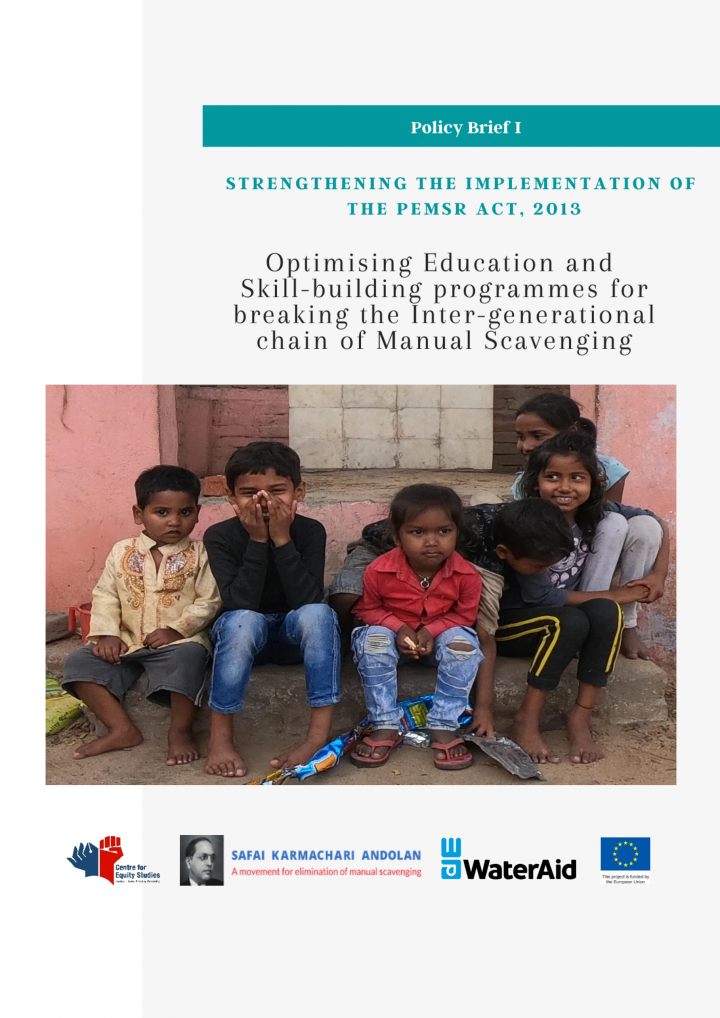
Mander, H., Kumbhare, S., Bhattacharya, A., Chanchani, M. (2020) Optimising Education and Skill-building programmes for breaking the Inter-generational chain of Manual Scavenging
The Preamble to the Indian Constitution secures to all citizens of India equality of status and opportunity. Equality of opportunity means to give equal chance to every individual for the development of his/her capacity. Education is a Fundamental Right under Article 21 (A) of the Constitution of India. The Constitution of India under Directive Principles as well as Fundamental Duties also provides for universal, free and compulsory education for all children. India has a Right to Education Act as well, that sets up clear mandates for governments and authorities at different levels, in ensuring these rights.
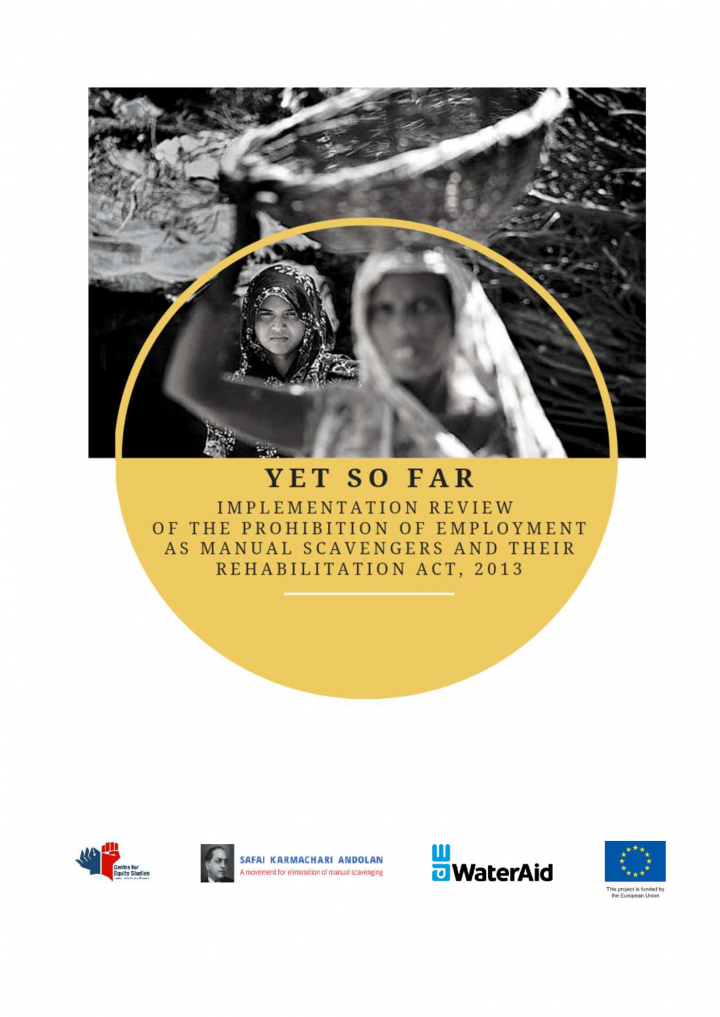
Mander, H., Kumbhare, S., Bhattacharya, A., Halder, B,. Chanchani, M., Poyam, A., Qaiyum, A. (2020) Implementation Review of the Prohibition of Employment of Manual Scavengers & Rehabilitation Act, 2013
There are twin tragedies that are involved in the continued prevalence of manual scavenging in our society. And one tragedy makes the other more tragic. Firstly, it is unfortunate that a country which boasts to be the world’s biggest democracy is still impervious to the fact that we have allowed people (largely women) to be involved with the practice of manual scavenging and cleaning of sewers, drains and septic tanks with bare hands and bare bodies, even allowing them to die drowning in our shit while we boast of technological leaps in the 21st century. The second tragedy is that while large sections of the upper-caste community cry hoarse about affirmative action, like reservation, that “favour” the under-privileged, they do not find any fault in a reality where the job of cleaning our gutters continues to be reserved for only the Dalits. Even as the urban middle class empathise and tweet about Black Lives Matter, they conveniently invisibilise the Dalits in such degrading lives. The fact that they matter so less, in turn informs the lack of technological initiatives in the field of cleaning and the lack of effort in the rehabilitation of these sections.
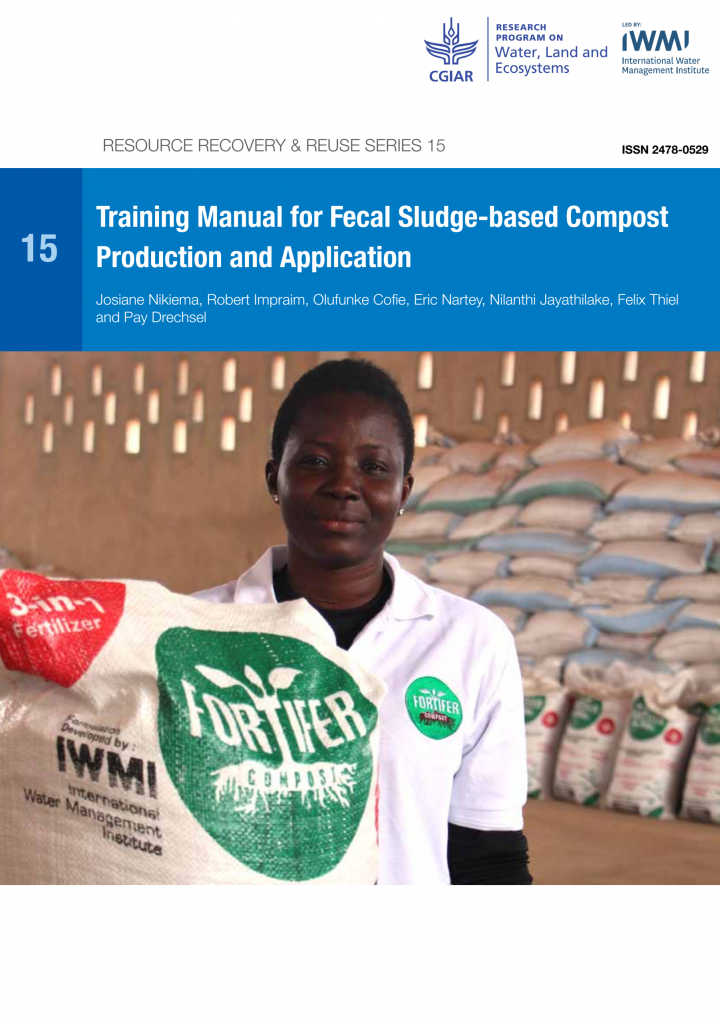
Nikiema, J; Impraim, R; Cofie, O; Nartey, E; Jayathilake, N; Thiel, F; Drechsel, P (2020) Training Manual for Fecal Sludge-based Compost Production and Application
Fecal sludge (FS) from on-site sanitation systems has to be well composted to reduce its pathogenic risk for reuse in agriculture, forestry or landscaping. Over the last decade, the International Water Management Institute (IWMI) has explored the use of FS in combination with other organic waste sources to optimize the FS treatment and composting or co-composting process for the production of a safe organic fertilizer, which can – depending on demand – be enriched with crop nutrients or pelletized for volume reduction, delayed decomposition or easier application. Based on IWMI’s experience, in particular in the Accrabased ‘Fortifer’ production plant, this training manual has been compiled for plant managers and trainers to help ensure that staff involved in FS treatment and production, and application of an FS-based co-compost adopt best practices in all processes involved. The manual can be adapted to local needs as required. ‘Best practice’ in this context comprises aspects related to health and environmental safety as well as technical knowledge related to operation and maintenance. The manual comprises the steps needed as well as the ‘do's and don'ts’ for the following topics: safety measures and compliance, FS reception and the use of drying beds, selection of appropriate co-composting materials, the composting process, product enhancement (enrichment, pelletizing), labeling, recording and storage. The manual also includes information on compost registration and certification, as well as guidelines for co-compost application in the field.
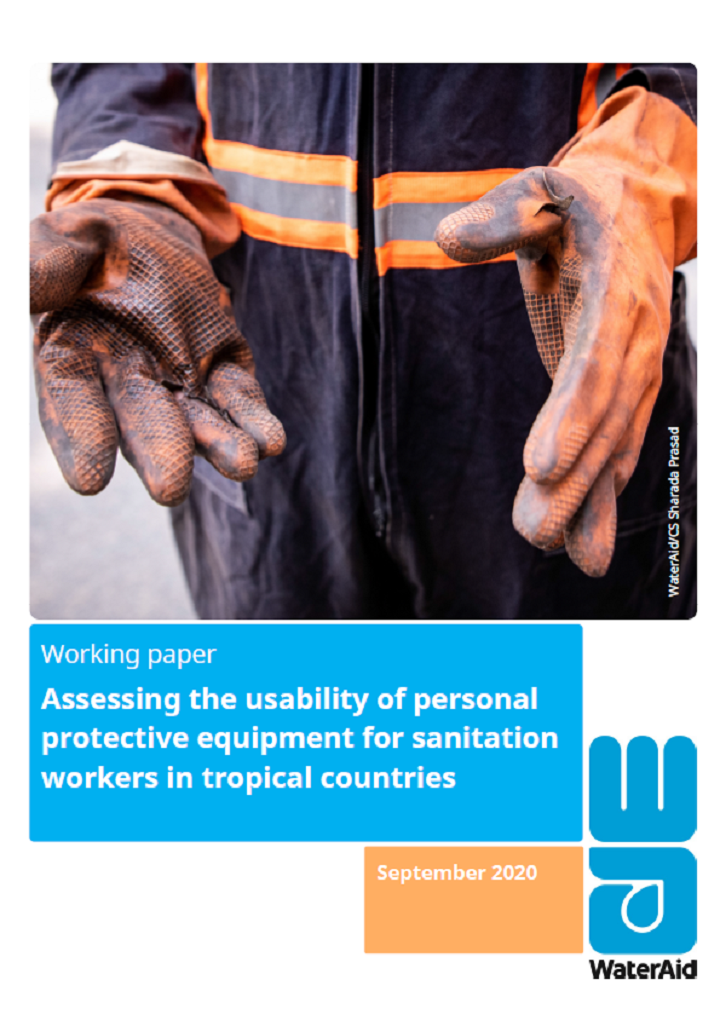
Prerana Somani and Andrés Hueso González (2020) Assessing the usability of personal protective equipment for sanitation workers in tropical countries
Efforts to meet SDG target 6.2 overlook sanitation workers' health and safety. In low- and middle-income countries (LMICs), workers lack proper personal protective equipment (PPE), leading to risks of injury and illness. Even when available, PPE is inconsistently used. This study examines PPE usability for sewer cleaners and tank emptiers in tropical countries, finding inadequate design and materials contribute to low usage. To address this, governments must establish clear PPE standards and foster innovation for redesigning PPE to better suit tropical conditions. This requires extensive research and a human-centric design approach to identify suitable product features, materials, and manufacturing techniques.
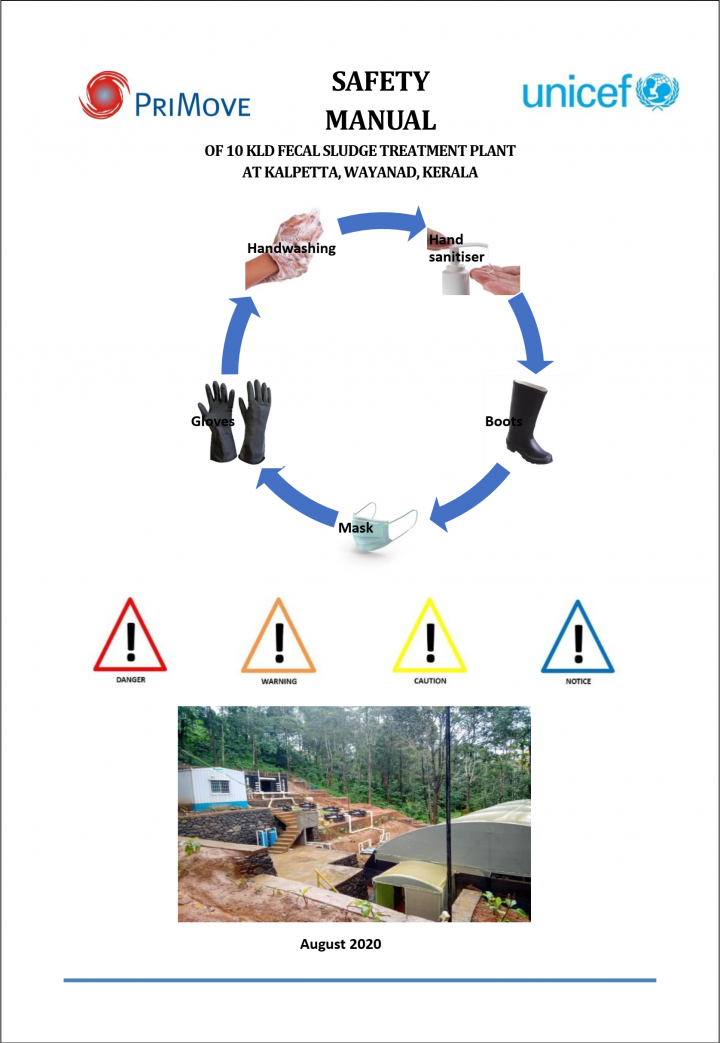
PriMove (2020) Safety Manual Of 10 Kld Fecal Sludge Treatment Plant at Kalpetta, Wayanad, Kerala
This Manual is needed for the technical persons to be trained as Operators and helpers at the FSTP site at Waynad. It contains Technical Guidelines for carrying out the works. A series of manuals are made, Operation and maintenance manual and Operator Instruction manual are the others. This Health and Safety Rulebook is presented for the use of all employees of the Faecal Sludge Treatment plant (FSTP) to assist in the administration of our safety program and to provide means and methods that will aid in the performance of various assignments in a safe and efficient manner. Safety is an integral part of everyone’s duties and responsibilities.
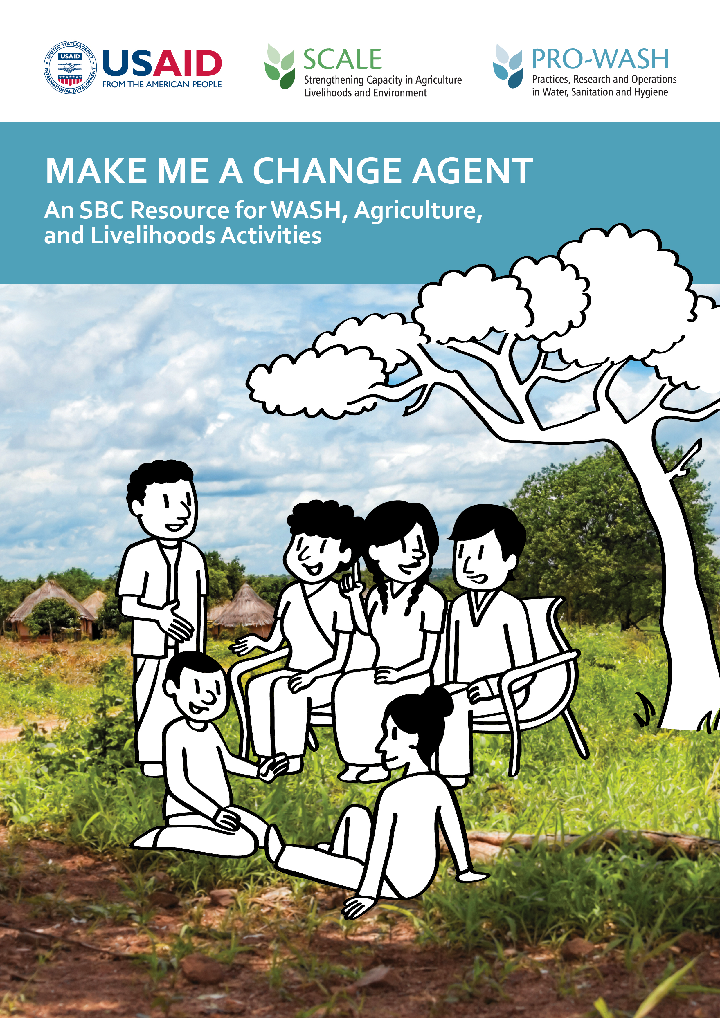
SCALE, PRO-WASH, USAID (2020) Make Me A Change Agent: An SBC Resource For WASH, Agriculture, And Livelihood Activities
Make Me a Change Agent: An SBC Resource for WASH, Agriculture, and Livelihoods Activities is an adapted version of the Make Me a Change Agent: A Multisectoral SBC Resource for Community Workers and Field Staff guide (produced in 2015 under The TOPS Program) and was co-created by the USAID Office of Food for Peace (FFP)-funded SCALE and PRO-WASH awards. This adapted Make Me a Change Agent (MMCA) training manual focuses on the training of trainers specifically for community-level workers and focuses on interventions related to water, sanitation, and hygiene (WASH), agriculture, and livelihoods. This resource seeks to build the skills of community-level workers in order for them to promote behavior change in their communities and includes necessary skills that can help a development worker in any sector become more effective as an agent of behavior change.

Sharada Prasad, C. S. (2020) Photo essay on sanitation workers in India
This is a photo-essay on the lives of sanitation workers in India. It depicts their working conditions and calls attention to the need to improve this.
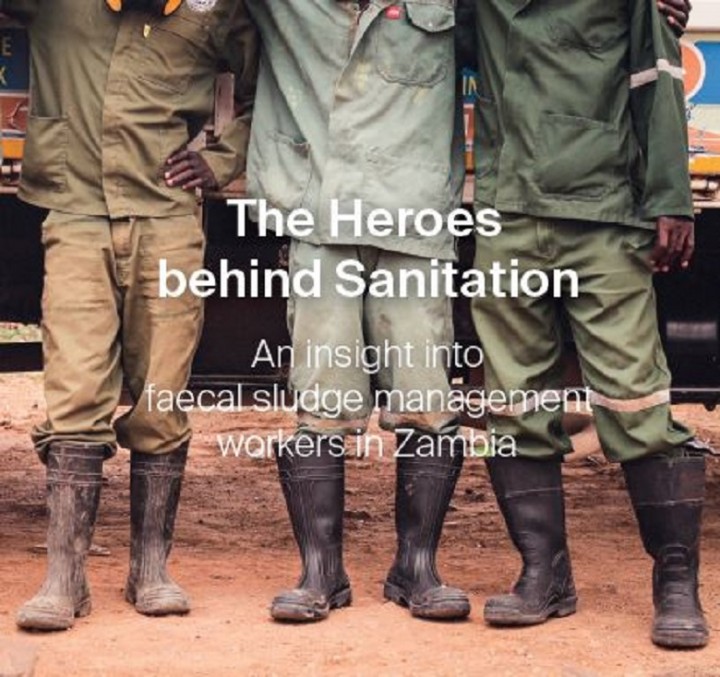
Sperandeo, L., Srinivasan, S. (2020) The Heroes behind Sanitation
The sanitation workforce provides an essential public service to all. They clean and empty pit latrines, septic tanks, sewers and other sanitation systems, transport faecal sludge, remove contaminants from the sludge and process the sludge for disposal or reuse. Constantly exposed to faecal microorganisms, hazardous waste and harsh chemicals, sanitation workers are susceptible to several operational and health risks. Owing to a public lack of awareness, the career choice and valuable service of a sanitation worker are often a subject of ridicule. In terms of the UN Sustainable Development Goals (SDGs), improving the working conditions of sanitation workers contributes not only to one (SDG 6) but four of the seventeen SDGs: to SDG 1 by promoting access to basic services for the poor; to SDG 3 by improving occupational safety; to SDG 6 by ensuring availability and sustainable management of water and sanitation for all; and to SDG 8 by focusing on decent work. We continue to see initiative and progress towards streamlining processes within the water and sanitation sector. This photo story captures the working process of a small group of pit emptiers and service providers from public utilities in Zambia, highlighting their lives, ordeals, opinions and dreams, the people they serve, and the unserved.
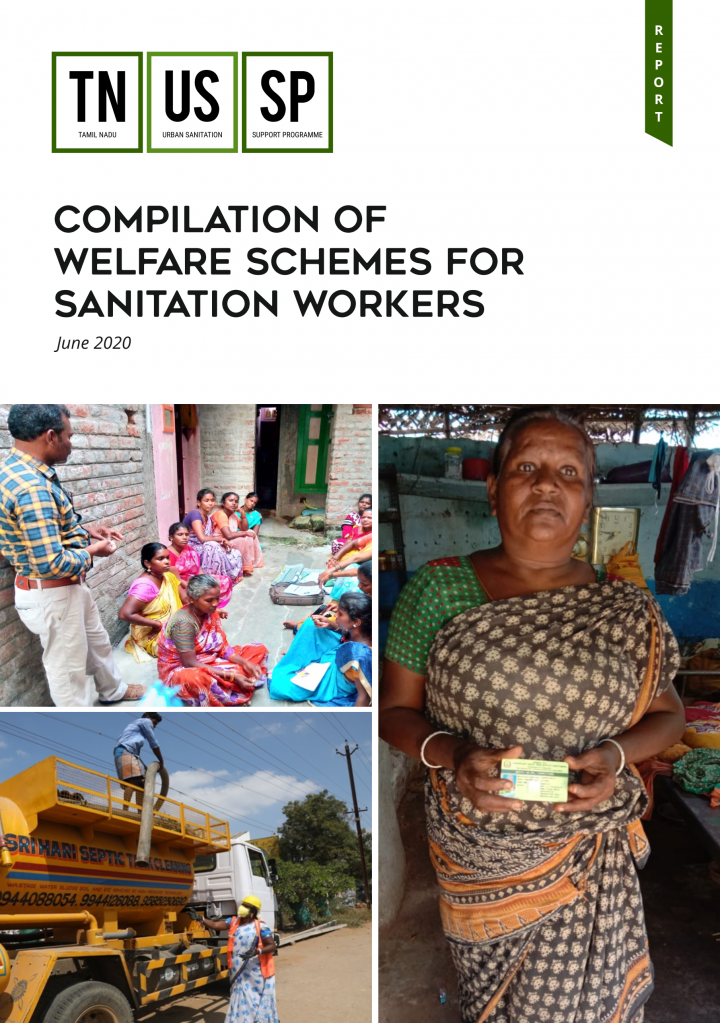
TNUSSP (2020) Compilation of Welfare Schemes for Sanitation Workers
Sanitation workers are the backbone of the public hygiene and waste management system. Despite providing an essential public service, their work is often unrecognised. A majority of the workers too are unaware of the social security and welfare schemes instituted by both the Central and State governments for their wellbeing, which prevents them from availing the benefits such as pension, differently-abled and education and women welfare assistance, among others. This document furnishes the details of the social security and welfare schemes implemented by the Central and State governments, the eligibility criteria and benefits, and how sanitation workers can access them.
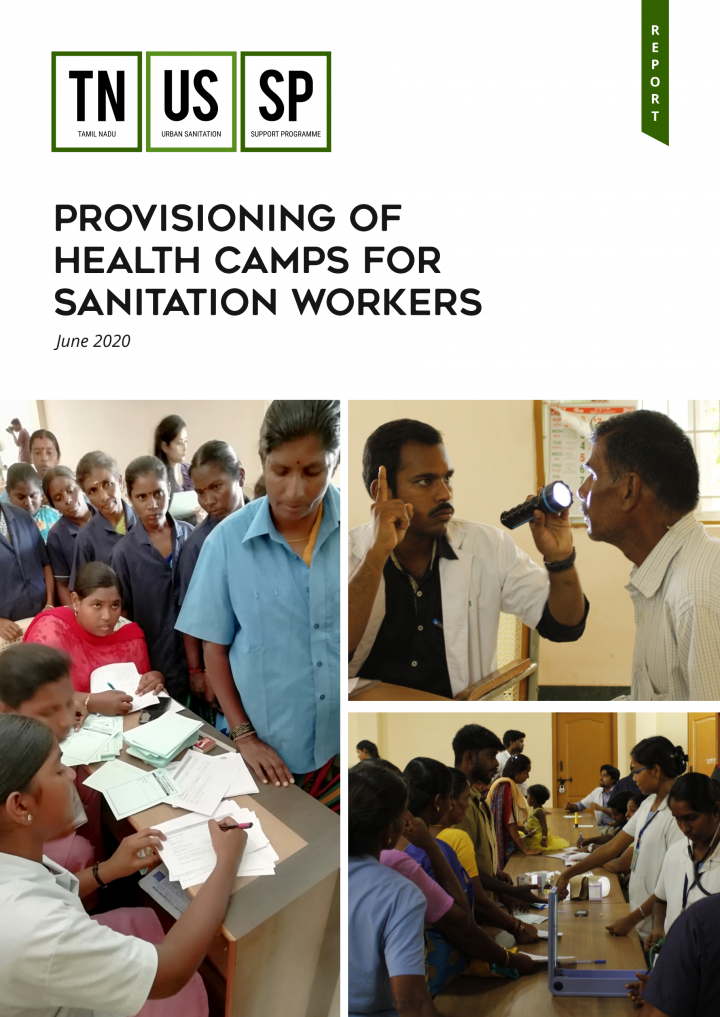
TNUSSP (2020) Provisioning of Health Camps for Sanitation Workers
The Tamil Nadu Urban Sanitation Support Programme (TNUSSP) has been supporting the Government of Tamil Nadu (GoTN) in achieving total sanitation in the state, and are demonstrating innovations in two model urban locations – Tiruchirappali Corporation, and Periyanaicken-palayam (PNP) and Narasimhanaicken-palayam (NNP) town panchayats. The Bill and Melinda Gates Foundation (BMGF) is supporting the GoTN through TNUSSP. One of the key focus areas of TNUSSP is improving the occupational health and safety of sanitation workers, who play a crucial role in the sanitation chain. The nature of their work exposes them to various occupational and environmental hazards, putting their health at serious risk. While existing policies, laws and government programmes emphasise the importance of regular health screening and vaccination, the reality is often different. Though comprehensive preventive healthcare of sanitation workers is mandated under the Prohibition of Employment as Manual Scavengers and their Rehabilitation Rules (2013), availability and their access to healthcare is negligible. While sanitation workers in larger urban local bodies (ULB) manage to receive sporadic healthcare, those in smaller towns and informal sectors are often neglected. The COVID-19 pandemic has further jeopardised their already-vulnerable health and safety. In an effort to change the status quo, TNUSSP organised regular health camps for both formal and informal sanitation workers and their family members in PNP and NNP, in collaboration with private trust hospitals. The health camps were gradually extended to the nearby Veerapandi, Gudalur and Karamadai town panchayats. This report documents the experiences of the 11 health camps organised over the last three years in Coimbatore district and proposes a way forward to institutionalising regular health camps that specifically address the needs and risks faced by sanitation workers.
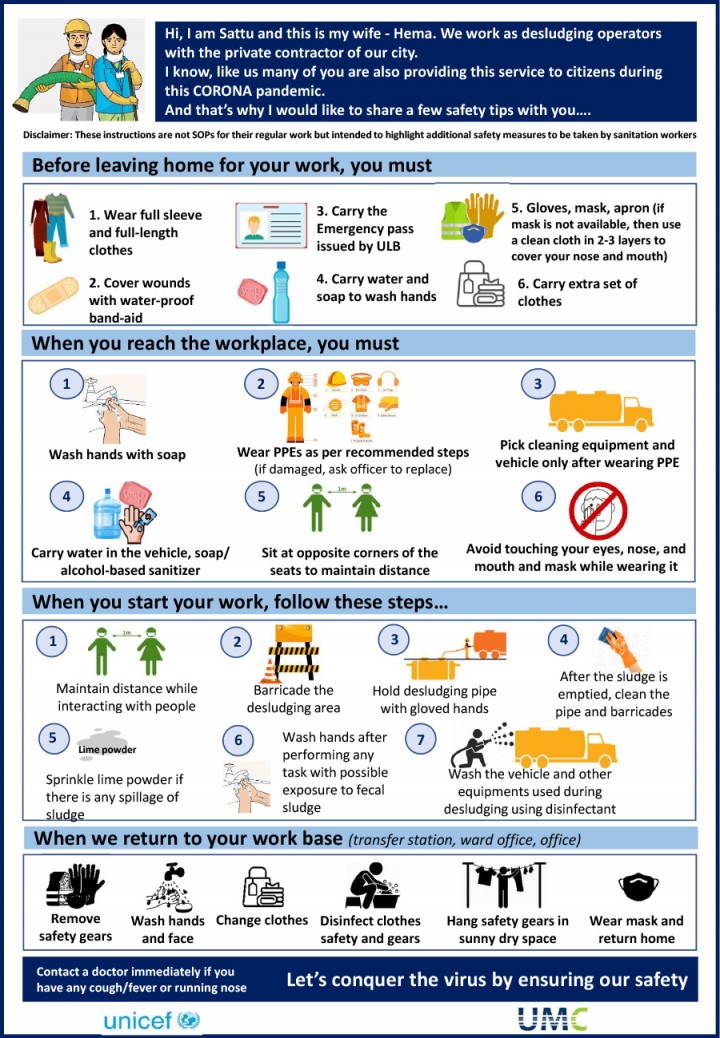
UMC and UNICEF (2020) COVID-19 and Safety of Sanitation Workers
These poster summarise safety procedures for Sanitation Workers keeping the COVID-19 pandemic in mind. The following are included: 1. Desludging operators 2. FSTP plant workers 3. Drain Cleaners
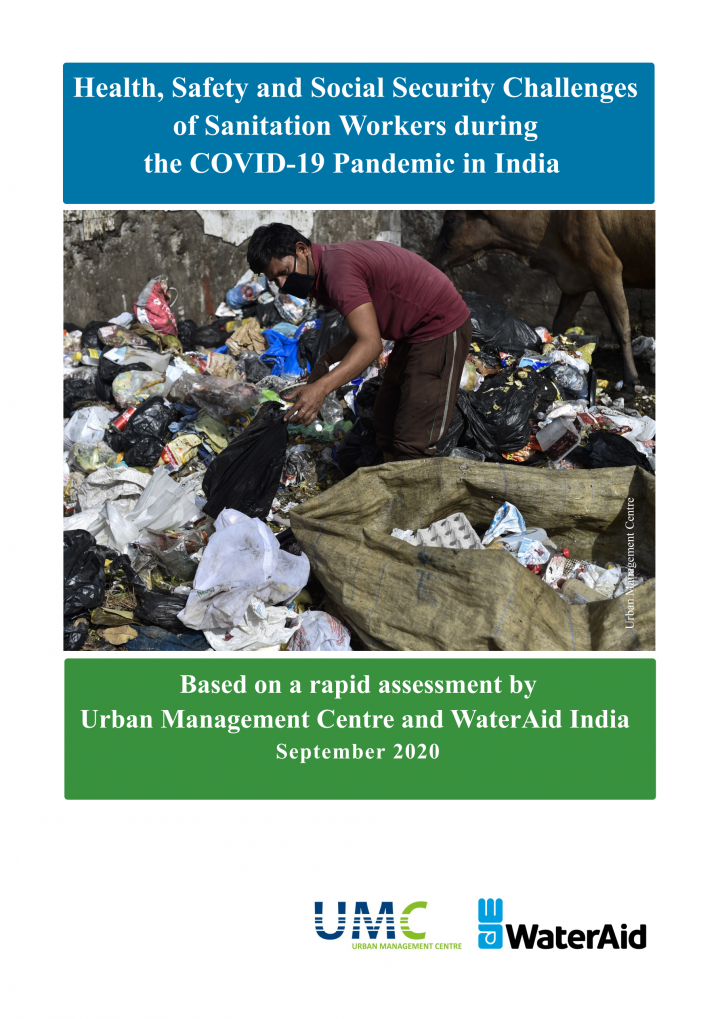
UMC, WaterAid (2020) Health, Safety and Social Security Challenges of Sanitation Workers during the COVID-19 Pandemic in India
While sanitation workers already face several health and safety risks, financial challenges and stigma due to the nature of their work and caste-based discrimination, the COVID-19 pandemic has further added to their challenges and vulnerabilities. The Urban Management Centre and WaterAid India jointly conducted a rapid assessment to understand the health, safety and social security challenges faced by sanitation workers in cities/towns across India during the COVID-19 pandemic. This involved telephonic and face-to-face interviews of 95 sanitation workers and 12 urban local body (ULB) officials from 18 cities/towns across 9 States/Union Territories (UTs) of India, conducted between 26 May and 8 June 2020. In addition, a secondary review of government guidelines and advisories, and media reports was undertaken.
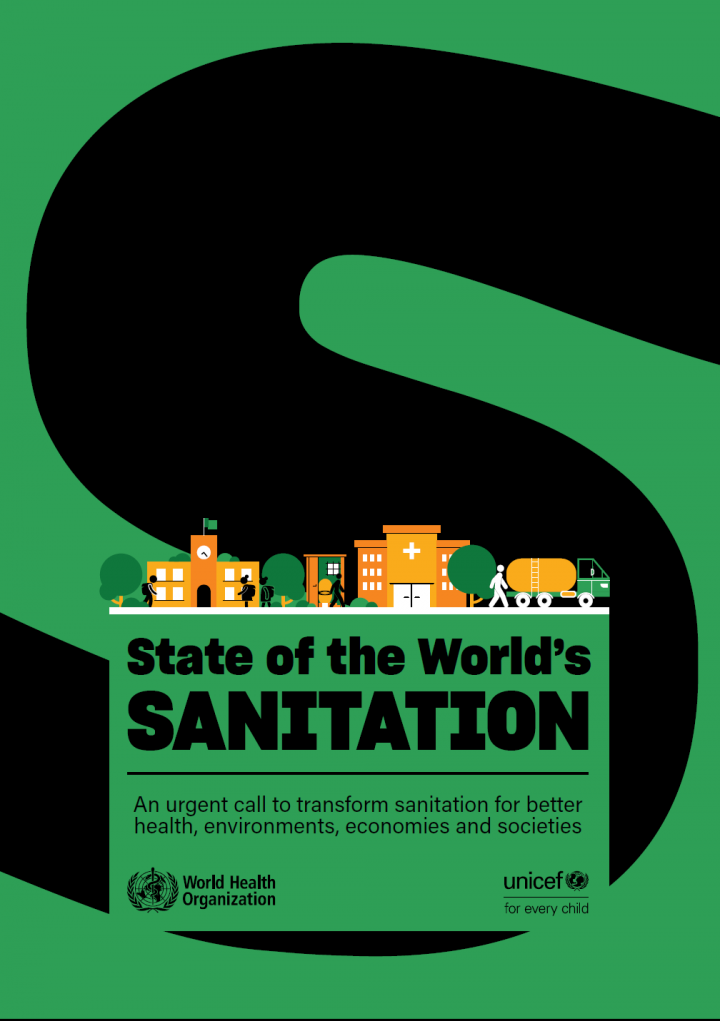
UNICEF, WHO (2020) State of the World’s Sanitation
The world is alarmingly off-track to deliver sanitation for all by 2030. Despite progress, over half of the world’s population, 4.2 billion people, use sanitation services that leave human waste untreated, threatening human and environmental health. An estimated 673 million people have no toilets at all and practise open defecation, while nearly 698 million school-age children lacked basic sanitation services at their school. The consequences of poor sanitation are devastating to public health and social and economic development. With only 10 years left until 2030, the rate at which sanitation coverage is increasing will need to quadruple if the world is to achieve the SDG sanitation targets. At the current rate of progress, it will be the twenty-second century before sanitation for all is a reality. Clearly this is too slow. While the challenge is significant, history shows that rapid progress is possible. To accelerate progress, sanitation must be defined as an essential public good – one that is foundational for a healthy population and prosperous society. Many countries have made rapid progress in sanitation coverage within a generation, transforming lives, the environment and the economy. Every country that has made rapid progress has had strong political leadership, with government playing an important role in policy, planning, mobilizing investment and regulating services. Sanitation is a human right. Everyone is entitled to sanitation services that provide privacy, ensure dignity and safety, and that are physically accessible and affordable. Sanitation is also a public good, providing benefits across society in improved health as well as economic and social development. The lack of safe sanitation leads to illness and disease that disproportionately affect children, including diarrhoea, worm infections and stunting. But poor sanitation affects everyone, and a polluted environment impacts the entire community, whether or not an individual household has a sanitation facility. In addition to hard-to-quantify effects on dignity, safety and gender equality, there are significant financial costs related to lack of sanitation, including increased health care costs, lost income, forgone educational opportunities and costs resulting from pollution. Poor sanitation disproportionately affects the most vulnerable and disadvantaged, particularly women and people living with disabilities. Sanitation workers, often stigmatized and marginalized, face unacceptable health risks and indignities in an unhealthy and unregulated environment. Achieving universal access to safe sanitation will be expensive, but inaction brings greater costs. Investments in sanitation – particularly safely managed sanitation services – generate positive externalities across society. The economic benefits of sanitation have been estimated at about five times the cost – a cost-benefit ratio greater than that of water supply. Strong government leadership is key to accelerating coverage of sanitation services and to ensuring that all of society reaps the benefits. Investment in five key ‘accelerators’ – governance, financing, capacity development, data and information, and innovation – identified under the UN-Water SDG 6 Global Acceleration Framework – can be a pathway towards achieving universal and safe sanitation for all.
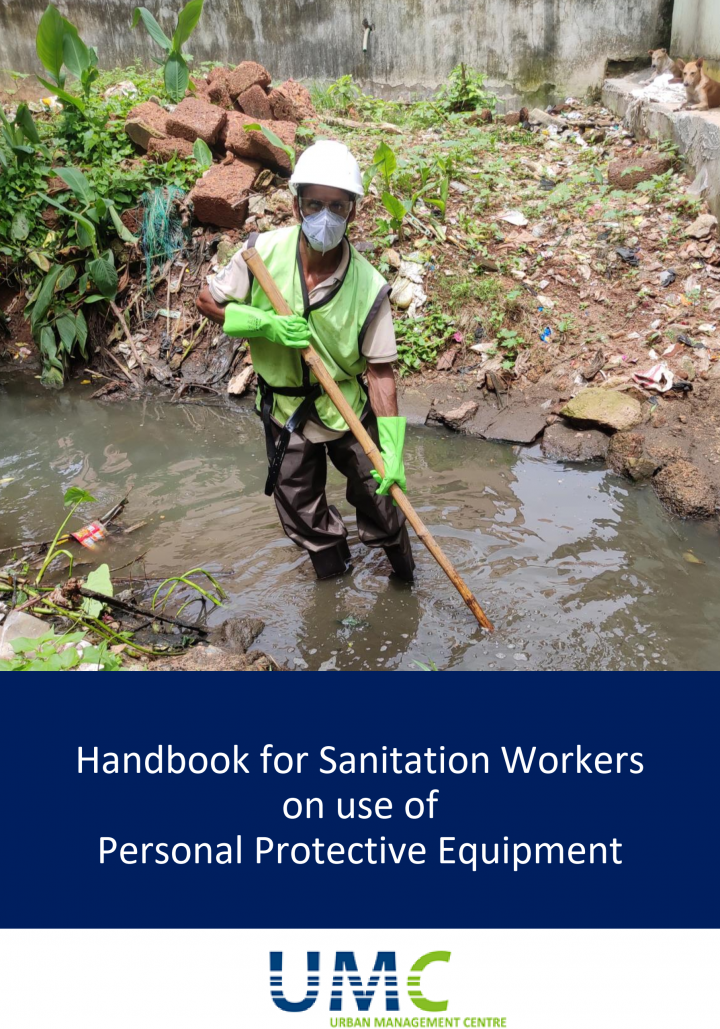
Urban Management Centre (UMC) (2020) Handbook for Sanitation Workers on use of Personal Protective Equipment
• You, as a sanitation worker, are exposed to occupational health and safety hazards. The work involves risk of coming in contact with hazardous biological and chemical agents • PPEs are a crucial barrier between you and disease-causing agents at the work site • It has been observed that the usage of PPEs is low. Fellow sanitation workers of yours have shared major reasons for this- wearing PPE causes discomfort, reduces efficiency to perform work, involves additional cost and maintenance • Due to the COVID-19 pandemic, everyone has started wearing masks regularly. Even though it was uncomfortable initially, we have developed a habit in order to protect ourselves. Similarly, there is a need to make the habit of using other personal protective equipment as well • Workers in other industries who work in difficult situation like yours also wear PPEs for their protection. For example, miners, construction workers etc. Sanitation work is also hazardous in nature. Hence, it is essential that you wear PPEs during work-hours • It might take some time to get used to working while wearing PPEs. But it will protect you from injuries and diseases. Your safety and good health is of prime importance
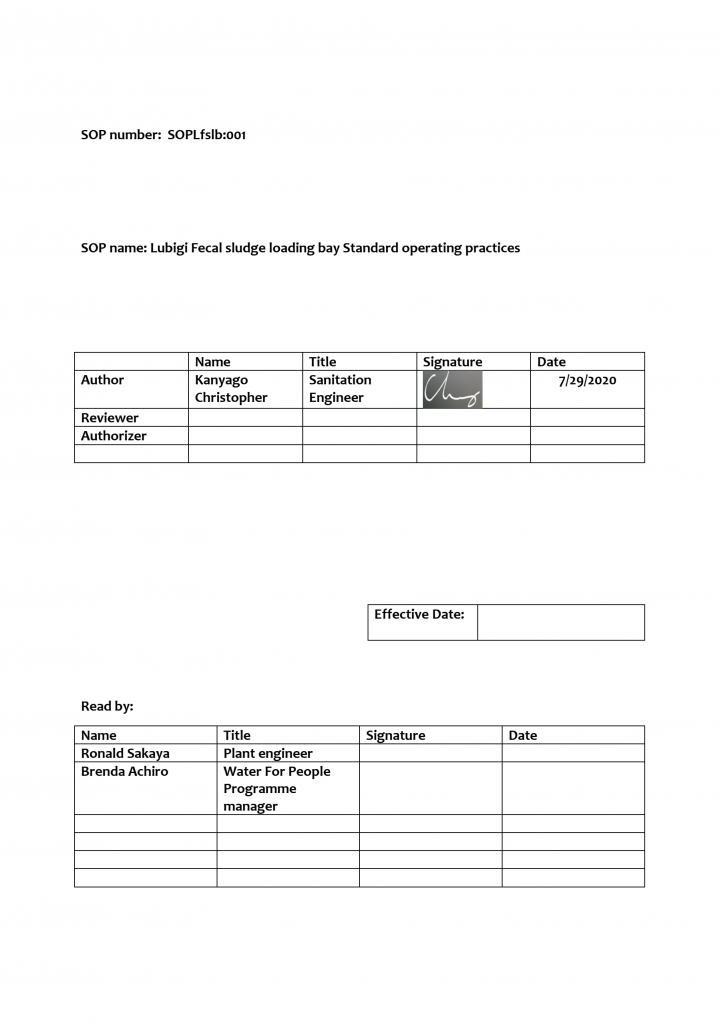
Water for People (WfP) (2020) Lubigi Fecal sludge loading bay Standard operating practices
Faecal Sludge Plants (FSPs) require ongoing and appropriate operation and maintenance (O&M) activities in order to ensure long-term functionality. O&M activities are at the interface of the technical, administrative, and institutional frameworks that enable sustained FSPs function. “Operationdz refers to all the activities that are required to ensure that a FSP delivers services as designed, and dz maintenancedz refers to all the activities that ensure long-term operation of equipment and infrastructure. Proper O&M of FSPs requires a number of crucial tasks to be carried out regardless of the size of the plant, and complexity of the technological setup. Having skilled workers perform these tasks in a timely manner and in accordance with best practices and will maximize the value of the Plant and ensure its long-term performance.
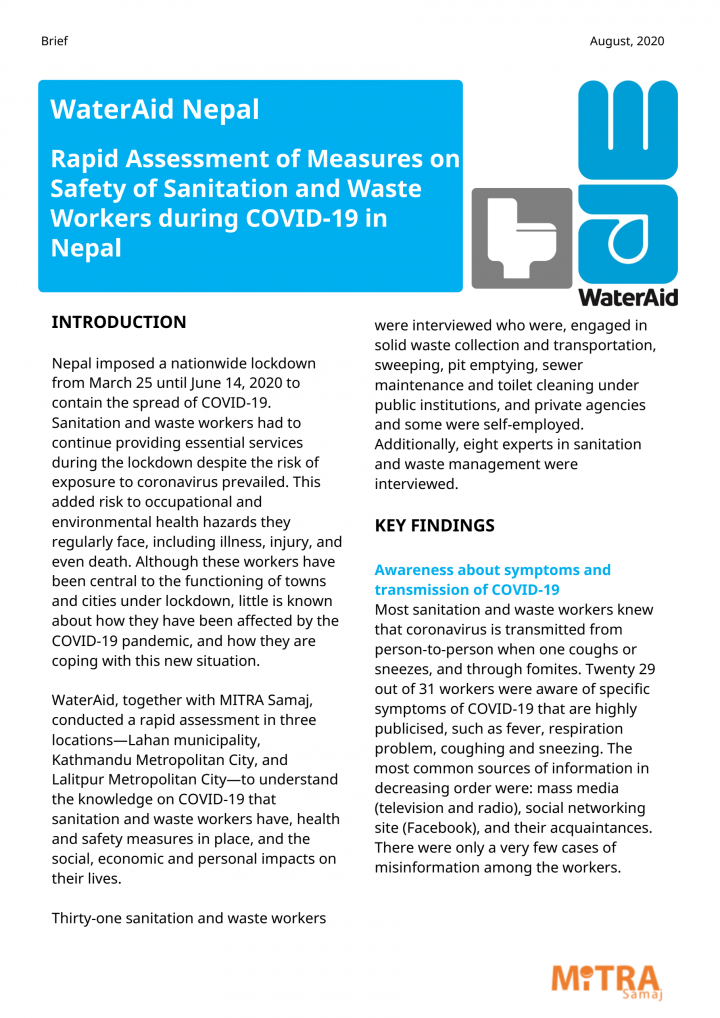
WaterAid (2020) Rapid Assessment of Measures on Safety of Sanitation and Waste Workers during COVID-19 in Nepal
Nepal imposed a nationwide lockdown from March 25 until June 14, 2020 to contain the spread of COVID-19. Sanitation and waste workers had to continue providing essential services during the lockdown despite the risk of exposure to coronavirus prevailed. This added risk to occupational and environmental health hazards they regularly face, including illness, injury, and even death. Although these workers have been central to the functioning of towns and cities under lockdown, little is known about how they have been affected by the COVID-19 pandemic, and how they are coping with this new situation. WaterAid, together with MITRA Samaj, conducted a rapid assessment in three locations—Lahan municipality, Kathmandu Metropolitan City, and Lalitpur Metropolitan City—to understand the knowledge on COVID-19 that sanitation and waste workers have, health and safety measures in place, and the social, economic and personal impacts on their lives. Thirty-one sanitation and waste workers WaterAid Nepal Rapid Assessment of Measures on Safety of Sanitation and Waste Workers during COVID-19 in Nepal Brief August, 2020 were interviewed who were, engaged in solid waste collection and transportation, sweeping, pit emptying, sewer maintenance and toilet cleaning under public institutions, and private agencies and some were self-employed. Additionally, eight experts in sanitation and waste management were interviewed.
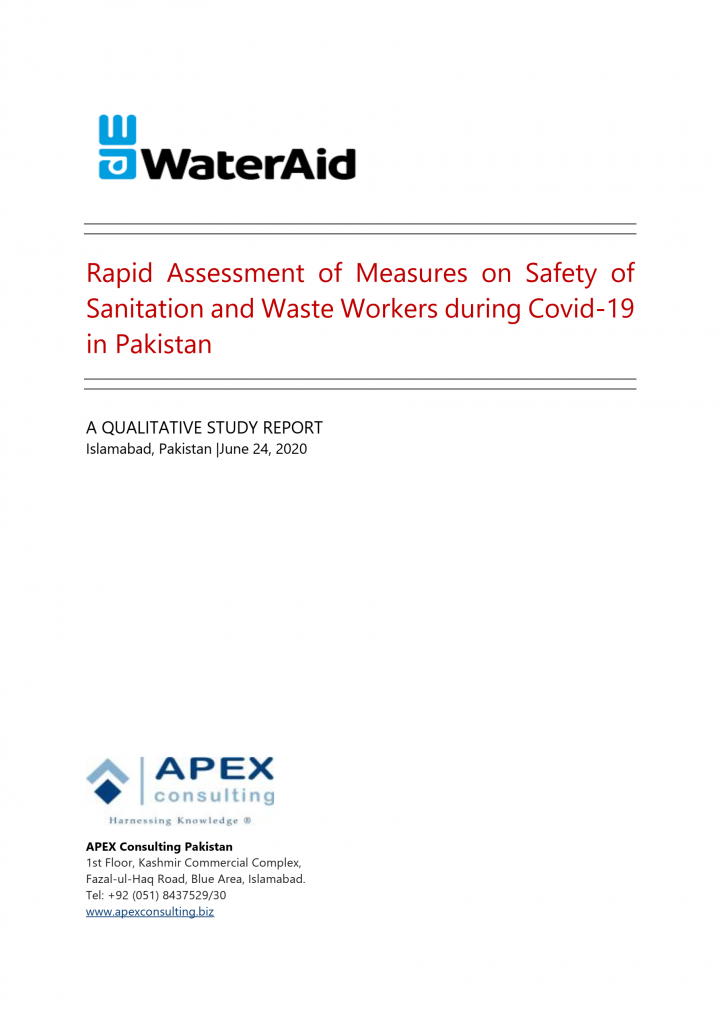
WaterAid (2020) Rapid Assessment of Measures on Safety of Sanitation and Waste Workers during Covid-19 in Pakistan
WaterAid Pakistan commissioned this rapid assessment research on the knowledge, practices and perspectives of sanitation workers and solid waste collectors about Covid-19 pandemic in Pakistan. The specific objectives of research were to understand the knowledge, practices and concerns of sanitation and waste workers regarding coronavirus, and; to find out the gaps and come up with recommendations to improve the health and safety of sanitation and waste workers during the pandemic. The research was carried out in May – June 2020 in Sindh, Punjab, Balochistan, Islamabad Capital Territory (ICT), Khyber Pakhtunkhwa (KP), Azad Jammu & Kashmir (AJ&K) and Gilgit Baltistan (GB). The primary data for this qualitative research consisted of 56 KIIs and seven IDIs. Information was collected through semi-structured questions with three categories of respondent groups: solid waste collectors, sanitation workers (employed at homes, offices and public department), and solid waste collectors at Health Care Facilities (HCF) involved in Covid-19 testing and treatment.
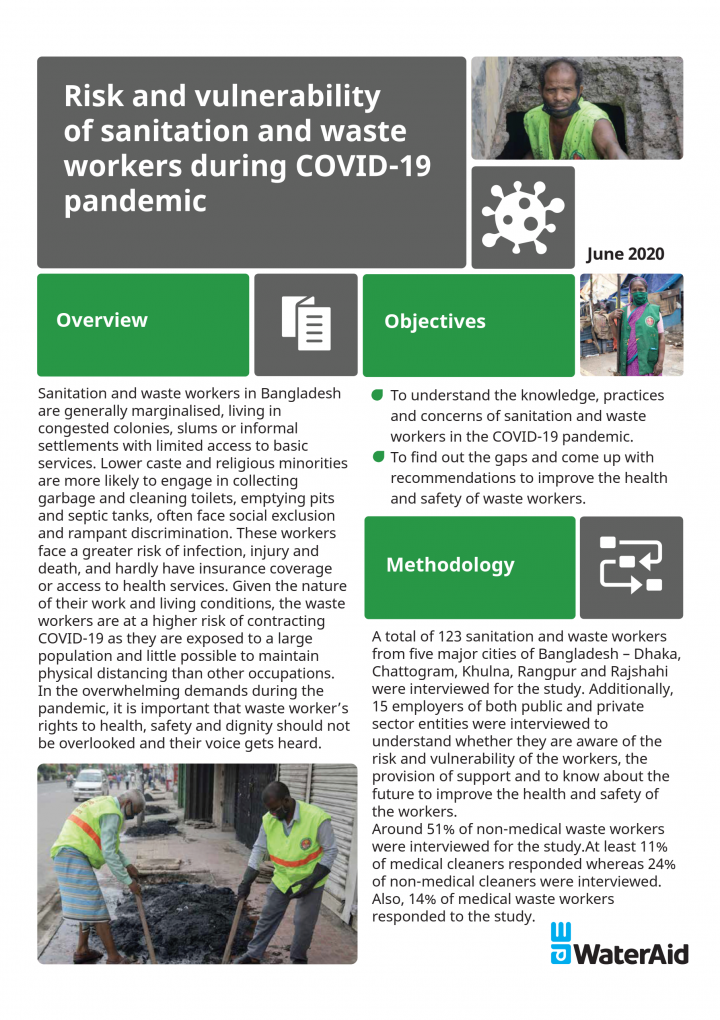
WaterAid (2020) Risk and vulnerability of sanitation and waste workers during COVID-19 pandemic
Sanitation and waste workers in Bangladesh are generally marginalised, living in congested colonies, slums or informal settlements with limited access to basic services. Lower caste and religious minorities are more likely to engage in collecting garbage and cleaning toilets, emptying pits and septic tanks, often face social exclusion and rampant discrimination. These workers face a greater risk of infection, injury and death, and hardly have insurance coverage or access to health services. Given the nature of their work and living conditions, the waste workers are at a higher risk of contracting COVID-19 as they are exposed to a large population and little possible to maintain physical distancing than other occupations. In the overwhelming demands during the pandemic, it is important that waste worker’s rights to health, safety and dignity should not be overlooked and their voice gets heard.
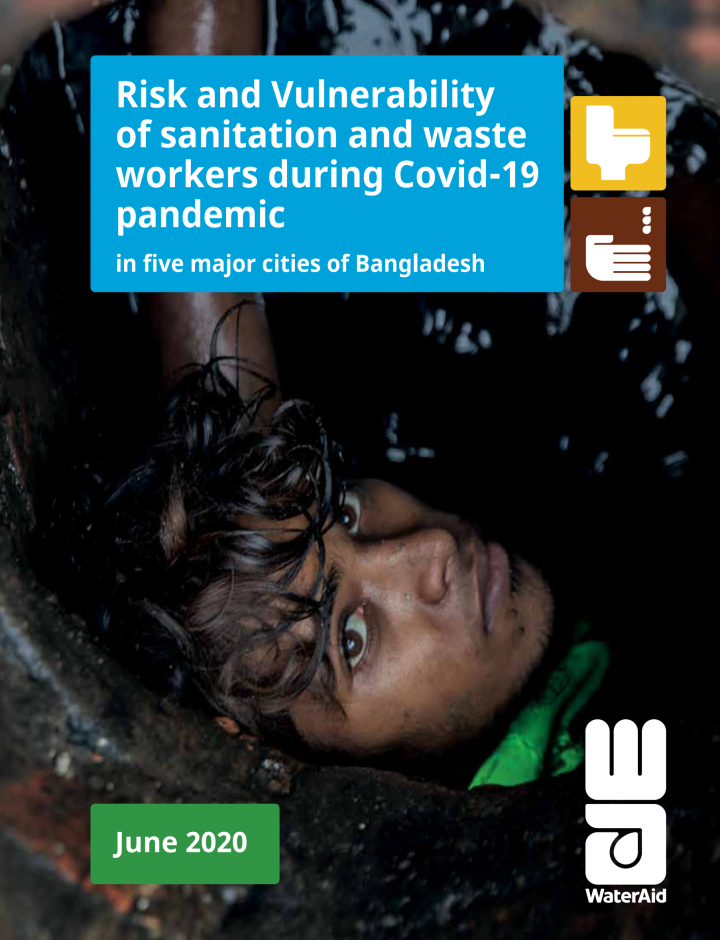
WaterAid (2020) Risk and Vulnerability of sanitation and waste workers during Covid-19 pandemic in five major cities of Bangladesh
Bangladesh has been identified as one of the 20 most vulnerable countries to be affected by the COVID-19 pandemic. Its high population density, poor infrastructure, and low levels of awareness of basic preventive measures culminate in a highly vulnerable and fragile country on the brink of a major crisis, with severe ramifications for public health, the economy and social cohesion. The recent surge in confirmed cases in the country poses serious concerns. The first three known cases were reported on 8 March 2020 by the country’s epidemiology institute, Institute of Epidemiology, Disease Control and Research (IEDCR). Infections remained low until the end of March but saw a steep rise in April. As of 10 June 2020, there have been a total of 74,865 confirmed cases in the country, with 15,900 recoveries and 1,012 deaths. All available predictions indicate that the situation is going to deteriorate further if no serious measures are taken.
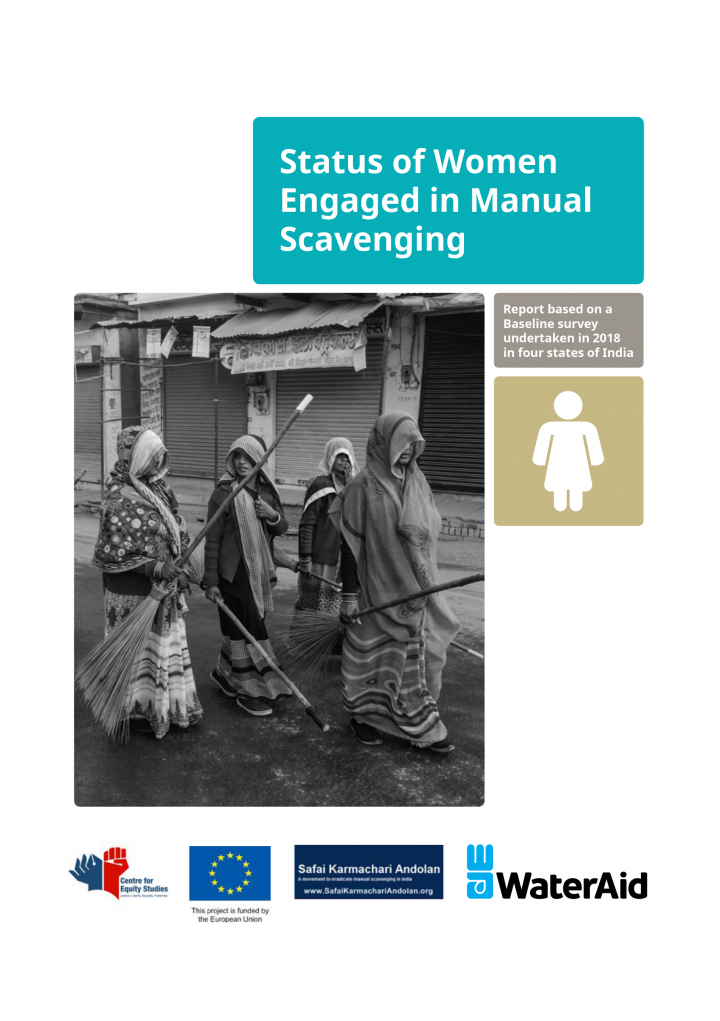
WaterAid (2020) Status of Women Engaged in Manual Scavenging
The baseline survey was conducted in the four states of Bihar, Madhya Pradesh, Uttar Pradesh and Jharkhand. This report has analysed the data generated for the following areas: a. Manual scavenging (MS) and dry latrines b. Prevalence of stigma, discrimination, untouchability, gender and caste-based discrimination and violence c. Participation in community led initiatives for rights and dignity d. Aspirations for economic and social empowerment e. Linkages/ inclusion with/in government institutions, banks, government schemes f. Awareness and access to rights and entitlements under ‘Prohibition of Employment as Manual Scavengers and their Rehabilitation Act 2013 (MSA 2013), The Scheduled Castes and Scheduled Tribes (Prevention of Atrocities) Amendment Act, 2015 (1 of 2016) and any other constitutional guarantees and provisions
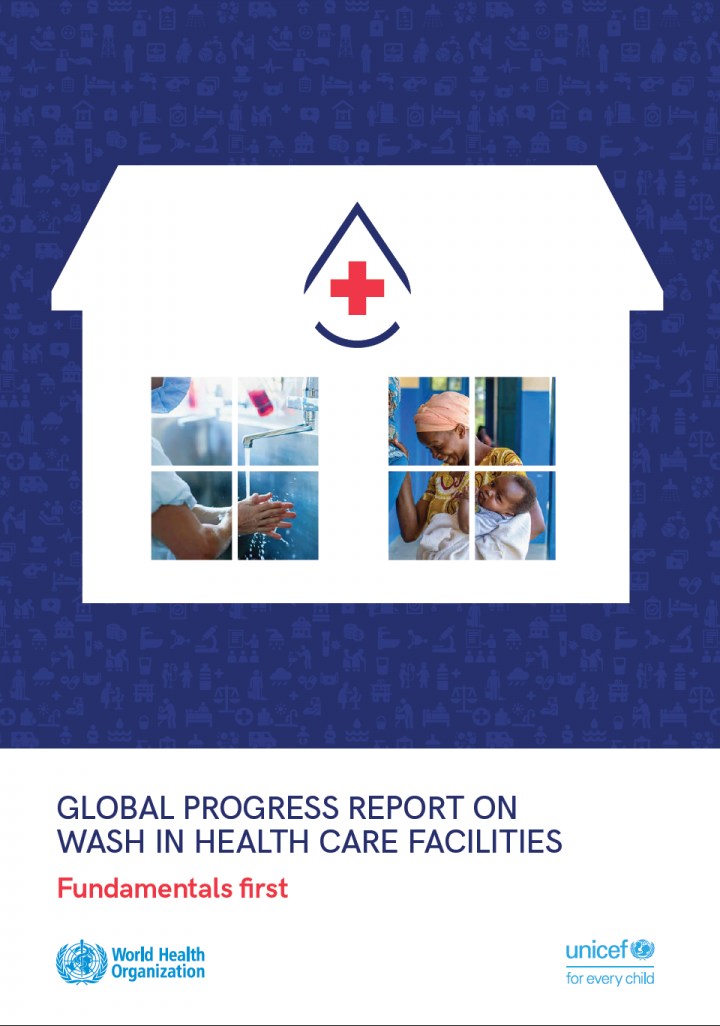
WHO, UNICEF (2020) Global Progress Report On Wash In Health Care Facilities
The report identifies major global gaps in WASH services: one third of health care facilities do not have what is needed to clean hands where care is provided; one in four facilities lack basic water services, and one in 10 have no sanitation services. This means that 1.8 billion people use facilities that lack basic water services and 800 million use facilities with no toilets. Across the world’s 47 least-developed countries, the problem is even greater: half of health care facilities lack basic water services. Furthermore, the extent of the problem remains hidden because major gaps in data persist, especially on environmental cleaning. This report also describes global responses. In response to the 2019 World Health Assembly resolution on WASH in health care facilities, data from 47 countries indicates that more than 70% have conducted related situation analyses, 86% have updated and are implementing standards and 60% are working to incrementally improve infrastructure and operation and maintenance of WASH services. Case studies from 30 countries demonstrate that progress is being propelled by strong national leadership and coordination, use of data to direct resources and action, and the mutual benefits of empowering health workers and communities to develop solutions together.
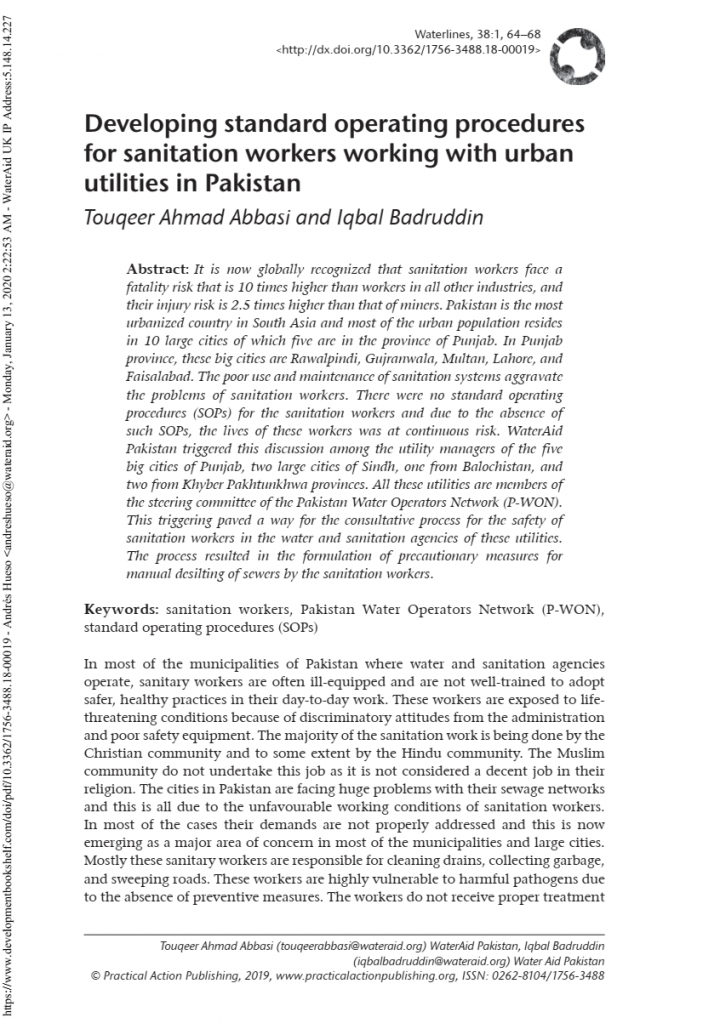
Abbasi, T. A., Badruddin, I. (2019) Developing standard operating procedures for sanitation workers working with urban utilities in Pakistan
It is now globally recognized that sanitation workers face a fatality risk that is 10 times higher than workers in all other industries, and their injury risk is 2.5 times higher than that of miners. Pakistan is the most urbanized country in South Asia and most of the urban population resides in 10 large cities of which five are in the province of Punjab. In Punjab province, these big cities are Rawalpindi, Gujranwala, Multan, Lahore, and Faisalabad. The poor use and maintenance of sanitation systems aggravate the problems of sanitation workers. There were no standard operating procedures (SOPs) for the sanitation workers and due to the absence of such SOPs, the lives of these workers was at continuous risk. WaterAid Pakistan triggered this discussion among the utility managers of the five big cities of Punjab, two large cities of Sindh, one from Balochistan, and two from Khyber Pakhtunkhwa provinces. All these utilities are members of the steering committee of the Pakistan Water Operators Network (P-WON). This triggering paved a way for the consultative process for the safety of sanitation workers in the water and sanitation agencies of these utilities. The process resulted in the formulation of precautionary measures for manual desilting of sewers by the sanitation workers.
Al-Karablieh, Lauri Badi, Maha Halasheh, Ahmad Sobh, Ismail Al Baz, Rania Al’ Zoubi, Hesham Asalamat, Keith Burwell, Jens Götzenberger, Frank Pogade, Gerhard Rappold (2019) Decentralized Wastewater Management in Jordan
The Compendium is available in English and Arabic. It covers the following topics: (A) Decentralized Wastewater Management in the light of Adaptation to Climate Change (B) Domestic Wastewater Reuse in the Context of Decentralized Wastewater Management in Jordan for Climate Change Adaptation (C) Business Models for Decentralized Wastewater Management in Jordan (D) Social acceptance as a priority for sustainable decentralized wastewater systems (E) Orientation Guidelines developed based on the Experiences of the ‘Decentralized Wastewater Management for Adaptation to Climate Change in Jordan’
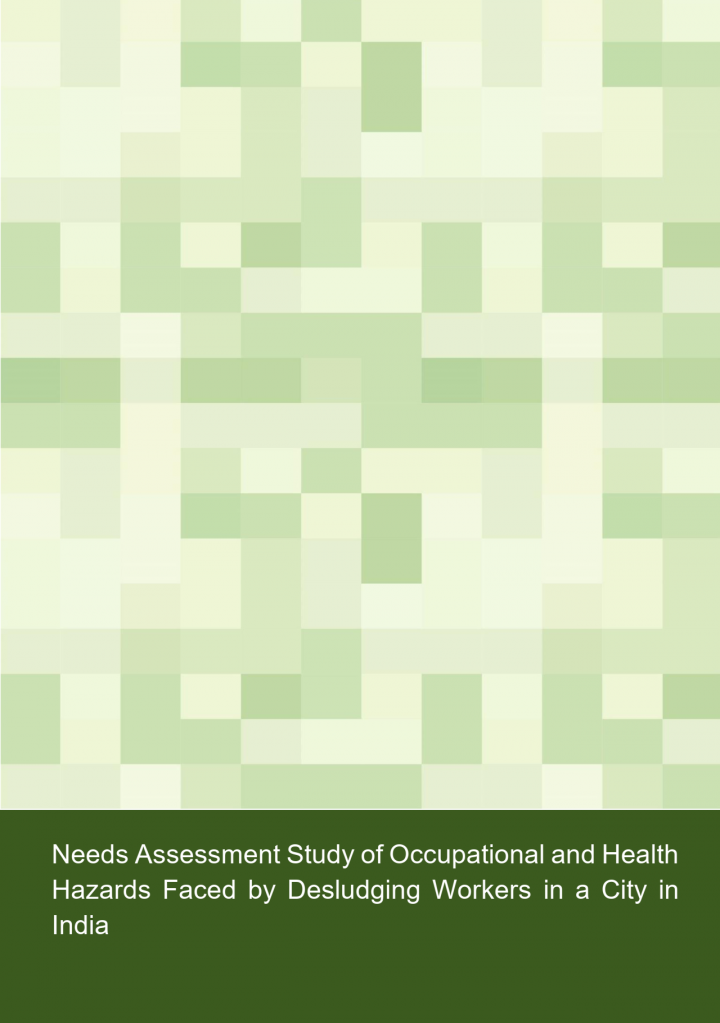
IIHS (2019) Needs Assessment Study of Occupational and Health Hazards Faced by Desludging Workers in a City in India
Safe collection, handling and transport of fecal sludge is an integral part of septage management. Limited attention has been paid to the safe collection, transport, disposal and treatment of human excreta from septic tanks. Motorised emptying and transport involves a truck with a standalone or mounted vacuum pump along with a storage tank that is used to empty and transport septage. Typically, these desludging trucks operate within the informal sector, so there is limited official data available on their numbers, operations, coverage and disposal practices. The general observations made were that the process of desludging has been carried out in the absence of any safety gear, putting the workers’ health at risk, and the septage collected is dumped in drains, waterways, open land and agricultural fields, critically impacting the environment and public health. To gain a deeper and clearer understanding of the occupational practices of desludging and safety of workers, a study was undertaken in one city in India. The objectives of the study were to: • Undertake in-depth analysis of current desludging practices (including measures for occupational safety) with an aim to understand resultant safety and health hazards for desludging workers • Understand the underlying reasons (knowledge, behaviour etc.) for occupational practices and existence of hazards • Understand the relevance and sufficiency of legally-mandated PPE and understand challenges for usage • Develop a preliminary set of recommendations for improvement of OSSs
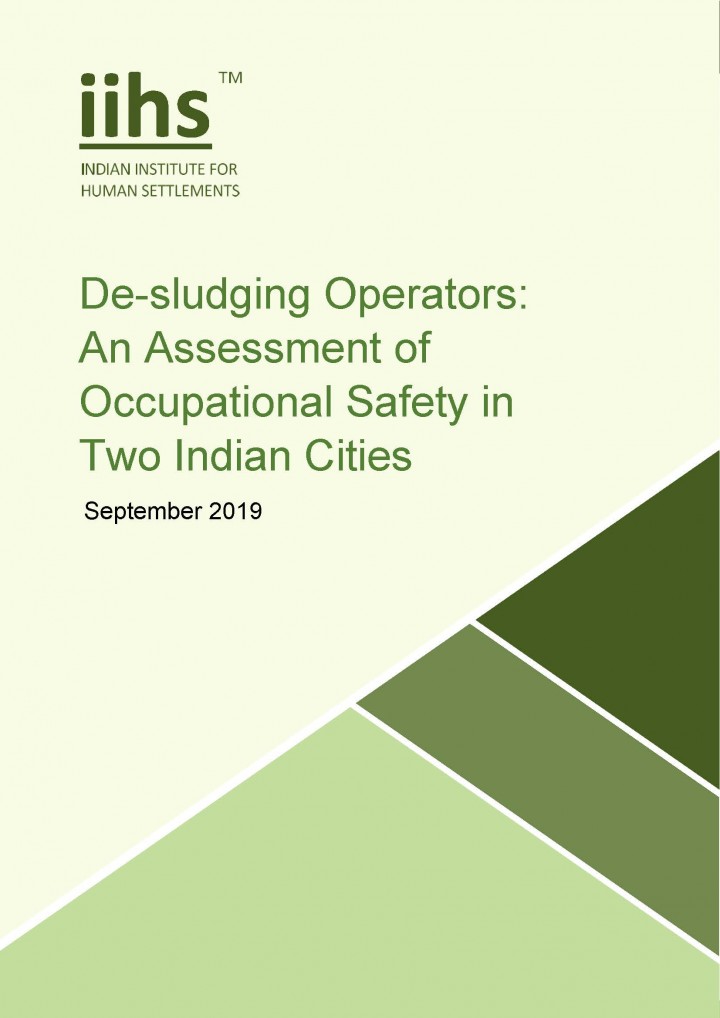
Indian Institute for Human Settlements, India (2019) De-sludging Operators: An Assessment of Occupational Safety in Two Indian Cities
Safe collection, handling and transport of fecal sludge is an integral part of septage management. Limited attention has been paid to the safe collection, transport, disposal and treatment of human excreta from septic tanks. A study was conducted in two cities in India to understand the current desludging practices, the underlying reasons for current occupational practices and hazards, relevance and sufficiency of personal protection equipment, and suggest ways to improve occupational safety. This report presents the findings of the study along with recommendations which are mapped on the hierarchy of controls.
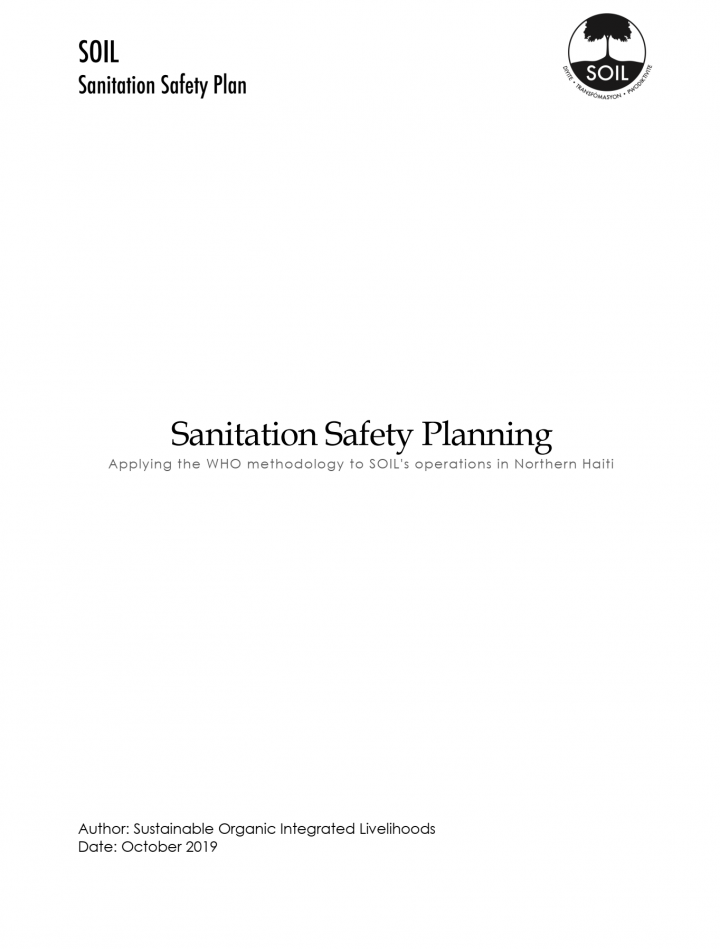
Sustainable Organic Integrated Livelihoods (2019) Sanitation Safety Planning
Over the years, SOIL has developed a model to provide a safely managed sanitation service to densely populated communities in Haiti, using containerbased sanitation. The objective of such an intervention is to reduce the risks to public health and the environment that unsafe sanitation practices create, and risk-based assessment methods such as Sanitation Safety Planning are a valuable tool to help evaluate the impact of SOIL's service, and also improve operations to mitigate risks as much as possible within the existing context. For this reason, the SOIL team was trained by the World Health Organization on the methodology of Sanitation Safety Planning, which was then implemented in SOIL's Northern Haiti operations. SOIL worked in partnership with government representatives from the Department of Sanitation under the Ministry of Public Works, the Ministry of Public Health and the Ministry of the Environment to accomplish the following components of the Sanitation Safety Plan: o Define clear objectives and system boundaries o Break down operations into steps that can more easily be analyzed for potential risks. o Identify and evaluate the risks to public health and the environment that exist in the current operations, and rank them based on probability and severity. o Create a mitigation plan, that targets in priority the highest-ranking risks, the objective being to set up interventions, whether behavioral or through infrastructure development. o Develop a calendar for mitigation solutions during the up-coming year, before the next yearly review that will aim to evaluate the impact of those mitigation measures and update the risk evaluation accordingly. In SOIL’s case, most mitigation measures proposed are behavioral and will require little to no investment. Once the measures are implemented, they can be evaluated periodically to ensure the objectives are met and the plan is still up to date.
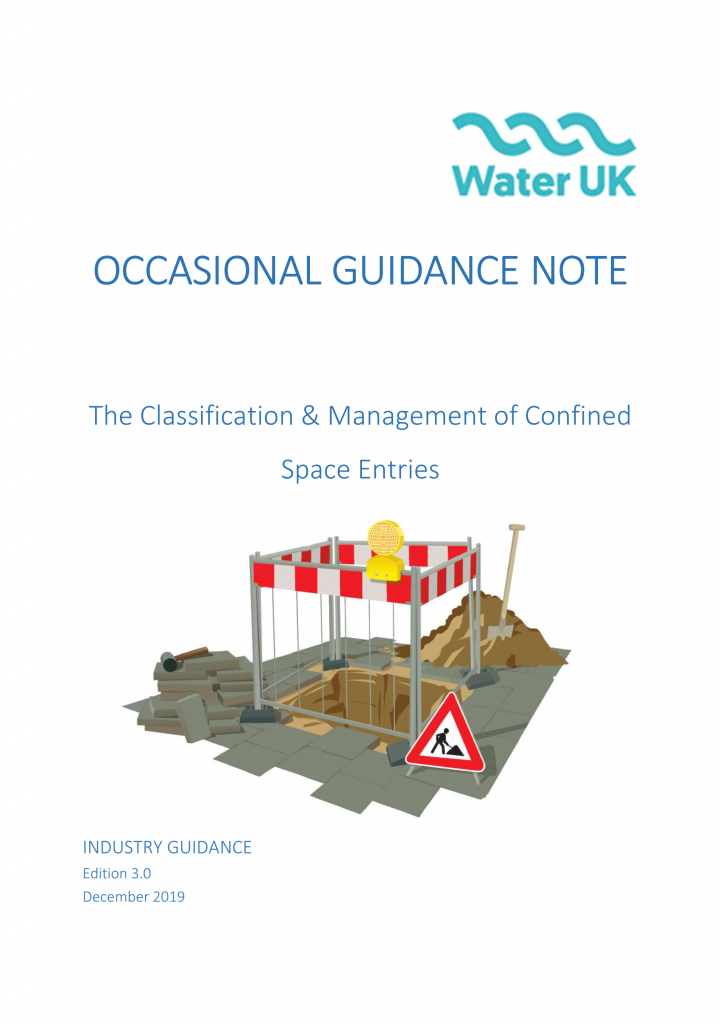
Water UK (2019) Occasional Guidance Note
The Water Industry is justly proud of the influence that it has had in improving safety standards, not only within its own industry, but in the UK as a whole. The original Occasional Guidance Note (OGN) upon which this revision has been based, was drafted at the request of the Health and Safety Executive and authored under the guidance of Rob Gwyther and Richard Locke as successive Chairs of the Water UK Occupational Health and Safety Group (WUKOHSG). The aims of the guidance were: - To bring clarity and uniformity to assessments and controls without overturning the traditional systems of work which have been successful for individual organisations. - To enable the movement of contractors between client companies, and lower re-qualification costs. - To standardise medical “fitness for entry” procedures. In creating the original guidance the industry was supported by the Energy and Utility Skills Register who contributed their experience and knowledge to the development of an OGN that has become the basis of national training schemes.
WaterAid India (2019) The hidden world of sanitation workers in India
The stigmatised caste system in India remains to be the key determinant of the fate of these workers. As a result, people, families and communities mainly ‘Dalits’ are compelled to perform these tasks which are not just hazardous and stigmatising but also highly underpaid. This not only makes their identities confined to sanitation work they are involved in, but also pushes them to accept the burden of inheritance, stigma and exploitation as social norms. WaterAid India highlights the reality of sanitation work in India, and provides recommendations to improve their occupational health and safety.
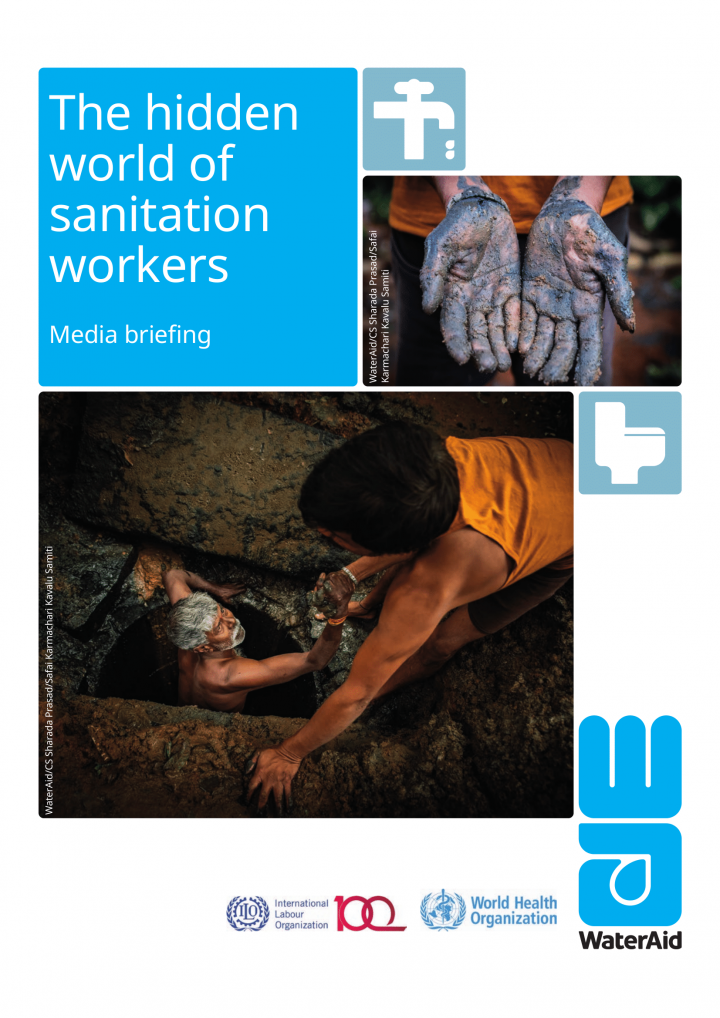
WaterAid, ILO, World Bank, WHO (2019) The hidden world of sanitation workers - Media briefing (in English, French, Portuguese and Spanish)
Every year, the human race produces over 350 million tonnes of poo – that’s enough to fill 140,000 Olympic swimming pools! Unless that human waste is properly dealt with, every single gram will pose a significant health risk to us and our planet. Ensuring that our contact with human waste ends when we leave the toilet is one of the most important jobs in society, and yet around the world sanitation workers remain mostly unseen and unappreciated. To mark World Toilet Day and this year’s theme of ‘Leaving no one behind’, the International Labour Organization (ILO), WaterAid, the World Bank and the World Health Organization (WHO) are highlighting the plight of sanitation workers as one of the most vulnerable groups in society. These workers range from public or private employees with proper equipment, benefits and legal protection, to some of the most marginalised, poor and discriminated members of society. Despite providing an essential public service, an uncounted number of sanitation workers around the world work in conditions that are hazardous and stigmatising – violating both their dignity and basic human rights. Few countries in the developing world have any guidelines to protect these workers, leaving them exposed to a litany of health and safety issues. There are no global statistics, but in India alone between 2017 and late 2018, there was on average one death of a sanitation worker every five days in the country, according to official data. Other sources estimate three times as many, over three deaths every five days. Countless more suffer repeated infections and injury, and have their lives cut short by the everyday risks of the job. French version: Le monde caché des agents d’assainissement - Note d’information à l’intention de médias Spanish version: El mundo oculto de los trabajadores sanitarios - Informe de prensa Portuguese version: O mundo oculto dos trabalhadores do saneamento - Comunicado de imprensa
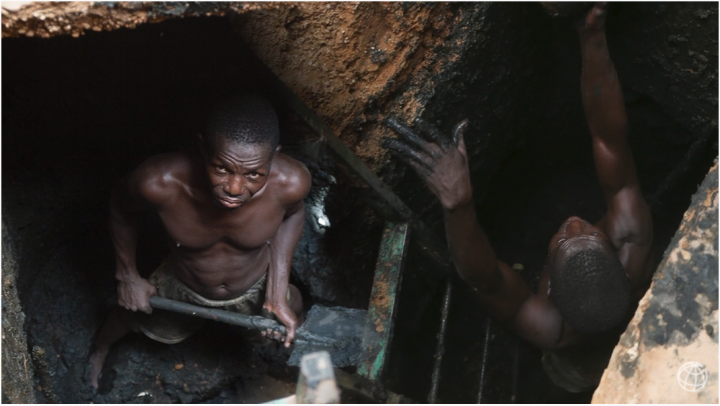
World Bank (2019) Sanitation Workers: Light at the End of the Tunnel?
Sanitation workers provide a fundamental public service. Yet they often face extreme health hazards and safety risks on the job. In many developing countries, they are informal workers with no legal protections or rights. With a lack of visibility in society, they can be stigmatized, marginalized and ignored. Here are the stories of five sanitation workers in their own words.
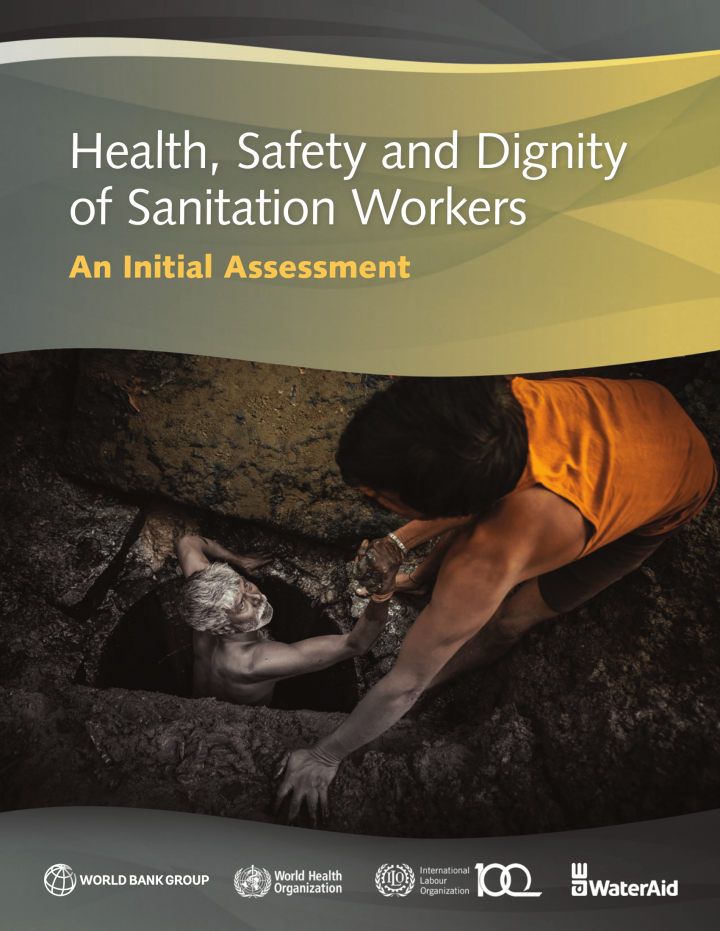
World Bank, ILO, WaterAid, and WHO (2019) Health, Safety and Dignity of Sanitation Workers - An Initial Assessment
The global sanitation workforce bridges the gap between sanitation infrastructure and the provision of sanitation services. Sanitation workers provide an essential public service but often at the cost of their dignity, safety, health, and living conditions. They are some of the most vulnerable workers. They are far too often invisible, unquantified, and ostracized, and many of the challenges they face stem from this fundamental lack of acknowledgment. Sanitation workers are exposed to serious occupational and environmental health hazards risking illness, injury, and death. This report presents the findings of a study that examined nine case studies of sanitation workers in low- and middle-income countries, predominantly focusing on emptying pits and tanks, providing transportation of fecal sludge, and performing sewer maintenance. It is an initial analysis into a growing body of work on sanitation workers, but already the findings highlight several action areas to ensure that efforts in reaching Sustainable Development Goals (SDG) 6.2 and 6.3 do not compromise the dignity, health, and rights of the workforce. Collecting data from literature and key informant interviews, the nine cases provide an overview of the key challenges sanitation workers face. The report also addresses good practices and suggests areas for action.
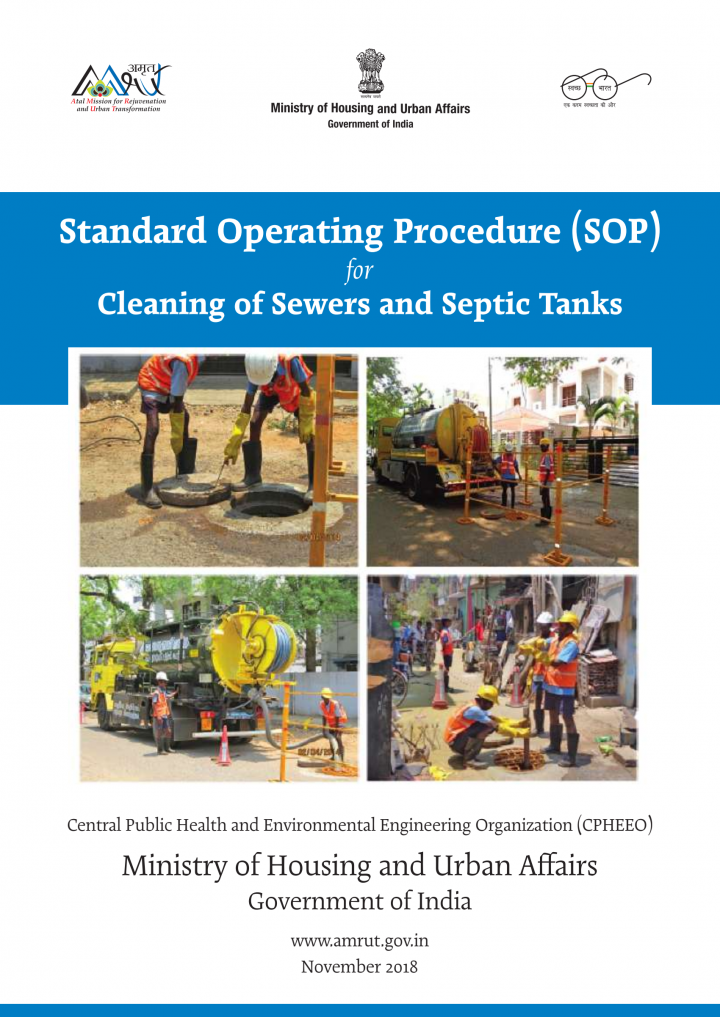
Central Public Health and Environmental Engineering Organization (CPHEEO) (2018) Standard Operating Procedure (SOP) for Cleaning of Sewers and Septic Tanks
As per the 2011 census, the share of urban population is 31.2% as against 28% of 2001 census of the total population of the country which is expected to be 50% by 2050. This increase in population has created a significantly enhanced demand on urban sanitation, inter alia. As per the 2011 Census, 81.4% households have toilet facilities within their premises. Out of this, 32.7% households have water closets connected to sewer system and 38.2% households are having water closets with septic tank. Remaining 18.6% households do not have toilet facilities within their premises. However, at present under Swachh Bharat Mission (Urban), the toilet facilities have significantly improved at present all the cities and towns are expected to be open defecation free before 2nd October 2019. Government of India had notified Prohibition of Employment as Manual Scavengers and their Rehabilitation Act, 2013 and Rules 2013. As per the Rules, for the purposes for removal of submersible pump sets fixed at the bottom of the suction wells at sewage pumping stations, reconstruction of manhole, rectification of the sewer main, before allowing entry of a person in the sewer, sewage shall be totally emptied.
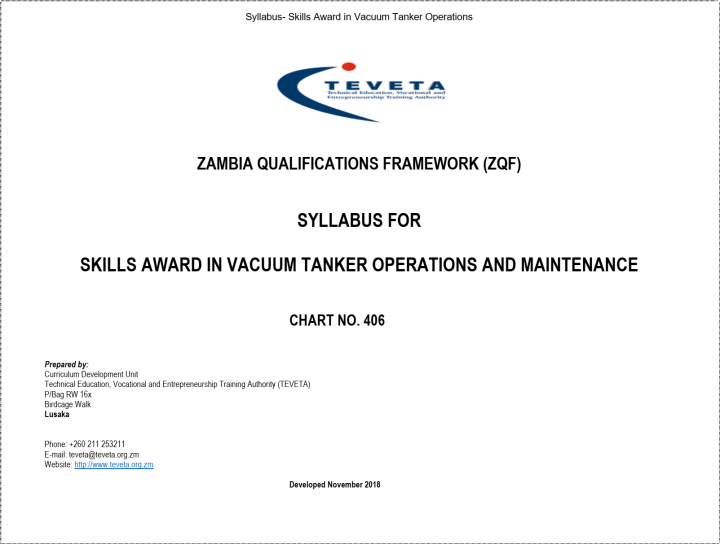
Curriculum Development Unit Technical Education, Vocational and Entrepreneurship Training Authority (TEVETA) (2018) Zambia Qualifications Framework (Zqf) -
The Technical Education, Vocational and Entrepreneurship Training Authority (TEVETA) is an institution established under TEVETA Act No. 13 of 1998, read together with the Amendment Act No. 11 of 2005. Its functions include, to regulate, coordinate and monitor education, vocational and entrepreneurship training in consultation with stakeholders. TEVETA executes its regulatory function through the provision of services, among others, the development, review and approval of TEVETA Curricula in consultation with industry, employers, employees and other stakeholders.
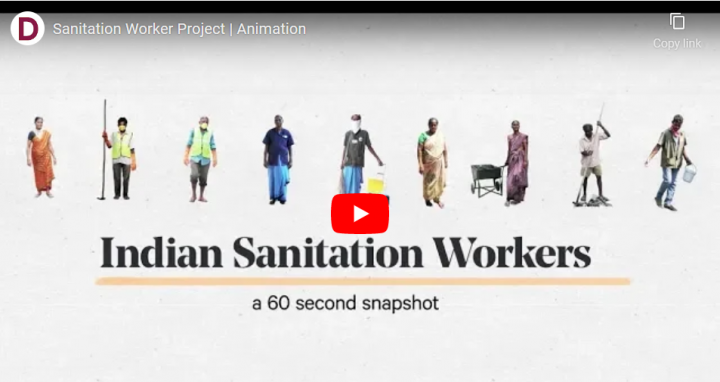
Dalberg (2018) Sanitation Worker Project | Animation
The Sanitation Workers Project is a structured, first-of-its-kind 5-month long study of sanitation workers across India carried out by Dalberg Advisors in 2017. The state of sanitation workers remains a blind spot, as workers face significant challenges on multiple fronts – financial, health and social. To develop a blueprint with solutions for this murky problem, we interacted with all the stakeholders – workers across the sanitation value chain, government officials, contractors, NGOs and experts. Animation by: ThoughtOverDesign www.thoughtoverdesign.com For more information, please visit: www.sanitationworkers.org
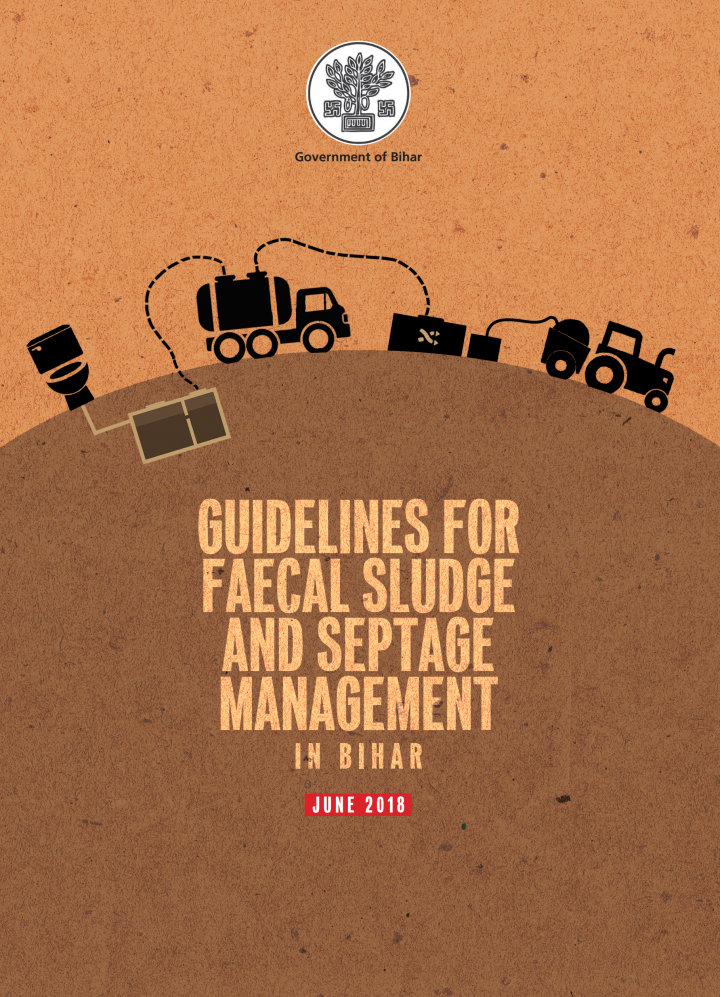
Govt. of Bihar (2018) Guidelines for Faecal Sludge and Septage Management in Bihar
According to Census 2011, Bihar reported 11.67 million urban population i.e. 11.25% of total population of state, dwelling in 199 urban centers (which accounts 3.14% of total urban population of country). The state has 143 statutory towns and 56 census towns. The state has 143 urban local bodies(ULBs) including 12 Municipal Corporation (Nagar Nigam), 46 Nagar Palika Parishad and 85 Nagar Panchayat. State ULBs with limited local resources and state support is responsible for provision of municipal services. A sanitation snapshot of urban Bihar in Table 1 clearly indicates that in the state, households with septic tank based sanitation systems (52.72%) far exceed those with sewer connections (7.21%). Such scenario poses a challenge to ULBs to safely manage the faecal sludge and septage throughout the sanitation service chain.
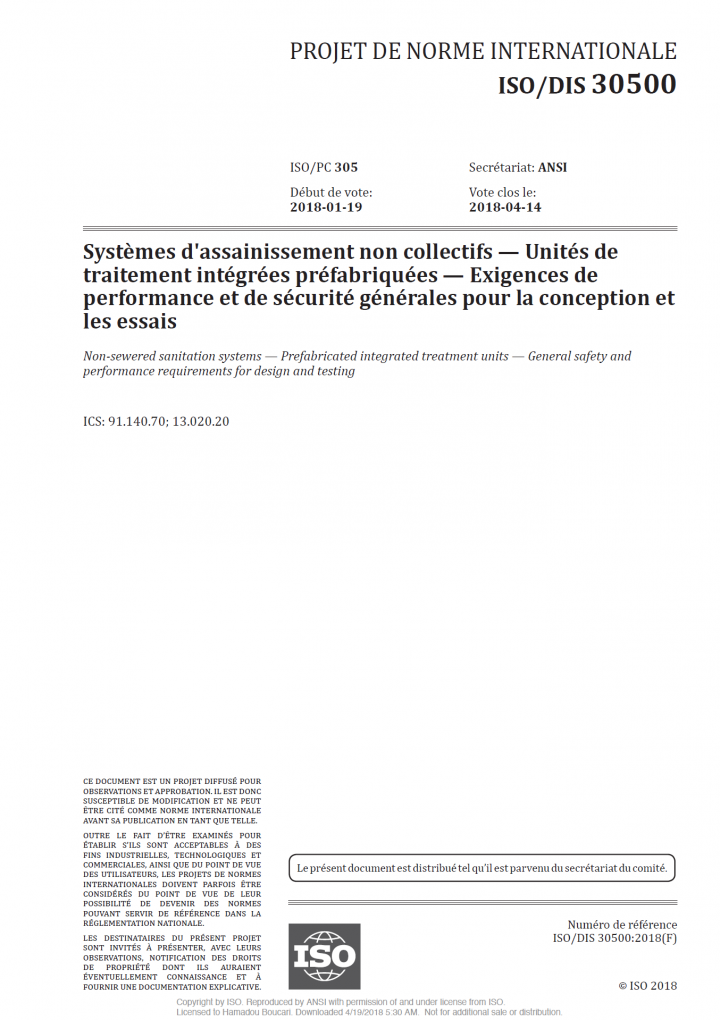
ISO (2018) Systèmes d'assainissement non collectifs — Unités de traitement intégrées préfabriquées — Exigences de performance et de sécurité générales pour la conception et les essais
La présente Norme internationale a pour objectif de faciliter le développement de systèmes d'assainissement autonomes conçus pour répondre aux besoins essentiels en matière d'assainissement et de favoriser la durabilité économique, sociale et environnementale, grâce à des stratégies pouvant consister réduire à la consommation des ressources (par exemple, l'eau, l'énergie) et à convertir les déchets humains en produits sortants sûrs. Le concept de système d'assainissement non collectif (SANC) est indiqué à la Figure 1, montrant clairement l'intégration de la ou des interfaces amont et aval, avec les produits entrants et sortants. De par leur conception, ces systèmes d'assainissement fonctionnent sans raccordement à un réseau d'égouts ou de drainage. Les systèmes d'assainissement non collectifs sont fabriqués soit sous forme d'un ensemble unique, soit sous forme d'un groupe de composants préfabriqués conçus pour être assemblés sans fabrication ni modification supplémentaires ayant une influence sur la fonction du système. Les composants préfabriqués des systèmes d'assainissement non collectifs nécessiteront peu de travaux pour être intégrés et fourniront rapidement des systèmes d'assainissement pleinement fonctionnels.
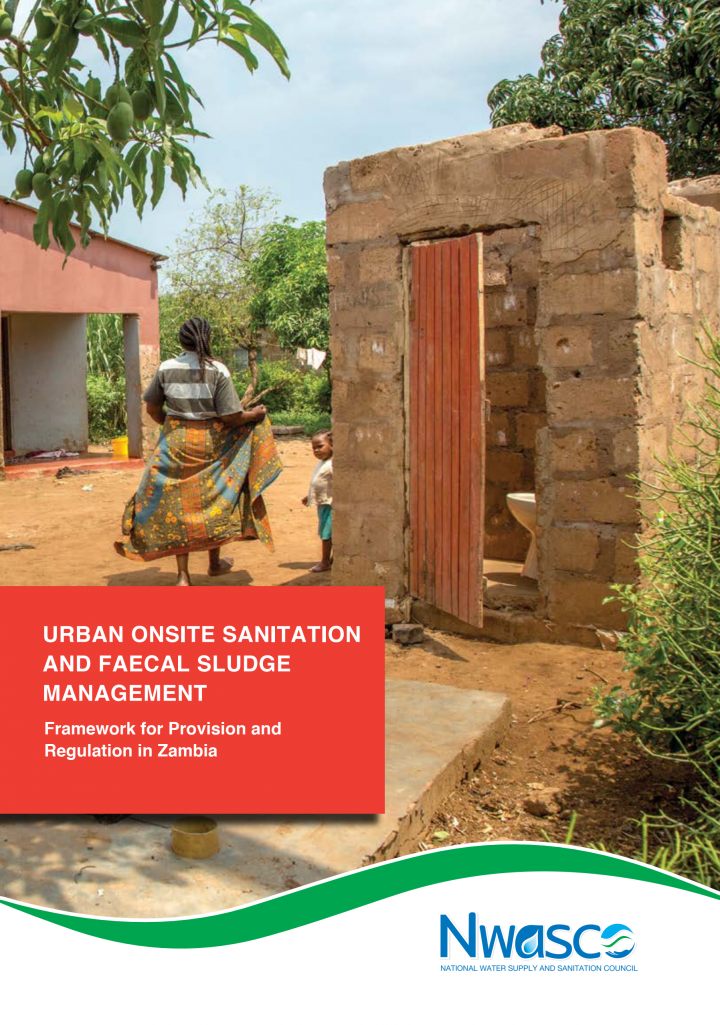
National Water Supply and Sanitation Council (NWASC) (2018) Urban Onsite Sanitation and Faecal Sludge Management
After decades promoting sanitation in low and middle-income countries, several countries and the global sanitation community have come to realise that it is time to rethink the approach to accelerating access to quality services. Since 2000, the WHO/UNICEF Joint Monitoring Programme of the Millennium Development Goals (MDGs) has consistently reported that the share of the population in low and middle-income countries that use pit latrines, septic tanks and systems termed as ‘unimproved’ sanitation facilities is growing. It is now estimated that between 2.1 and 2.6 billion people in low and middle-income countries rely on onsite technologies that produce tons of untreated faecal sludge (FS) every day. When septic tanks and pit latrines become full, the sludge that is collected from them is largely discharged untreated into open drains, irrigation fields, open lands or surface waters. The amount of untreated FS discharged into the open environment poses a serious public health risk. A 5m3 truckload of FS dumped into the environment is the equivalent of 5,000 people practising open defecation. Adding to this is the heavy load from raw faeces excreted in the open by an additional 1.1 billion people who still do not have access to any toilet.
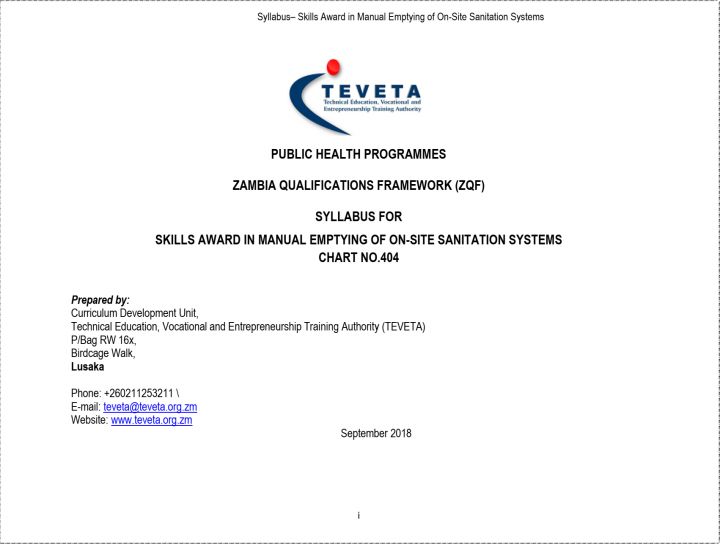
Technical Education, Vocational and Entrepreneurship Training Authority (TEVETA) (2018) SYLLABUS FOR SKILLS AWARD IN MANUAL EMPTYING OF ON-SITE SANITATION SYSTEMS CHART NO.404
Faecal sludge management (FSM) covers the whole chain from containment, emptying and collection, transportation, treatment and disposal and end-use. Faecal sludge management (FSM), nonetheless, is applied to the context of onsite sanitation (OSS) systems only. This is particularly important for Zambia where in general close to 85 percent of the population relies on on-site sanitation system. CSO (2016) showed that 77 percent of Zambians depended on OSS system while about 15.6 percent of the population relied on off-site sanitation, i.e. sewer connections and the remaining 7.4 percent used other types of toilet facilities or none at all. These ranged from aqua-privy (0.1 percent); bucket/ other container (0.1 percent), and other types of toilet facilities (3.2 percent) while the population of Zambia that never used any form of toilet facility accounted for 4.1 percent. Sanitation service provision in the City of Lusaka is not any different. Almost 90 percent of residents in the City of Lusaka use OSS facilities consisting of septic tanks (22 percent), pour flush latrines (10 percent), improved pit latrines (50 percent), and traditional latrines (8 percent), with only 9 percent of households connected to sewers and the remaining 1% defecating in the open (LWSC, 2017). Specifically, Lusaka has a total sewer network of 480 km, serving only 30 percent of the city area (10-15 percent of the population). Thus, about 85 percent of the City is served by on-site sanitation system (OSS) and 90 percent of OSS are pit latrines which are poorly constructed and located in peri-urban areas (PUAs), a home for at least 70 percent of all residents in Lusaka.
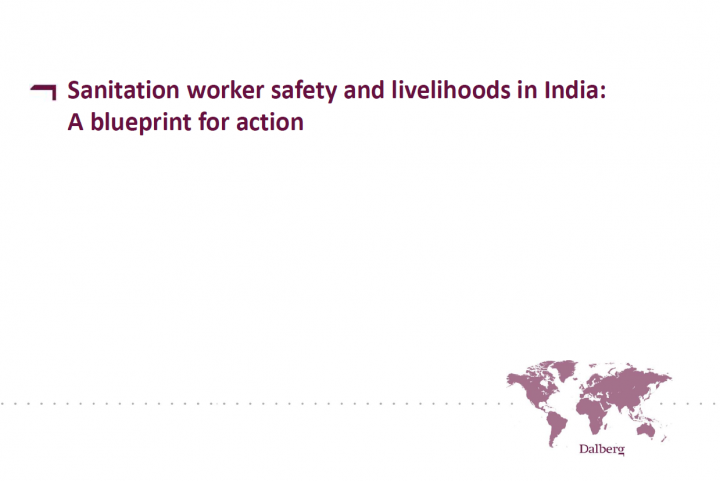
Dalberg Advisors (2017) Sanitation worker safety and livelihoods in India: A blueprint for action
The Sanitation Project In 2017, Dalberg Advisors carried out a study of sanitation workers across India – the first of its kind – to understand the issue both from a worker perspective as well as a supply-side or institutional perspective The Sanitation Workers Project is a structured, first-of-its-kind 5-month long study of sanitation workers across India carried out by Dalberg Advisors in 2017, with the support of The Gates Foundation. The state of sanitation workers remains a blind spot, as workers face significant challenges on multiple fronts – financial, health and social. To develop a blueprint with solutions for this murky problem, we interacted with all the stakeholders – workers across the sanitation value chain, government officials, contractors, NGOs and experts. Unsafe sanitation work continues to persist in multiple forms in India in spite of it being banned in 1993 and several initiatives by CSOs. Workers face significant challenges on multiple fronts - financial, health and social: 1. Hazardous work environment leading to acute mental and physical health issues; rampant drug abuse alcoholism 2. Poor pay and exploitation by sanitation contractors 3. Social stigma and lack of access to public resources This publication is divided into four phases: Phase 1: Understanding the problem Phase 2: Best practices Phase 3: Solutioning Phase 4: City Blueprint - Trichy
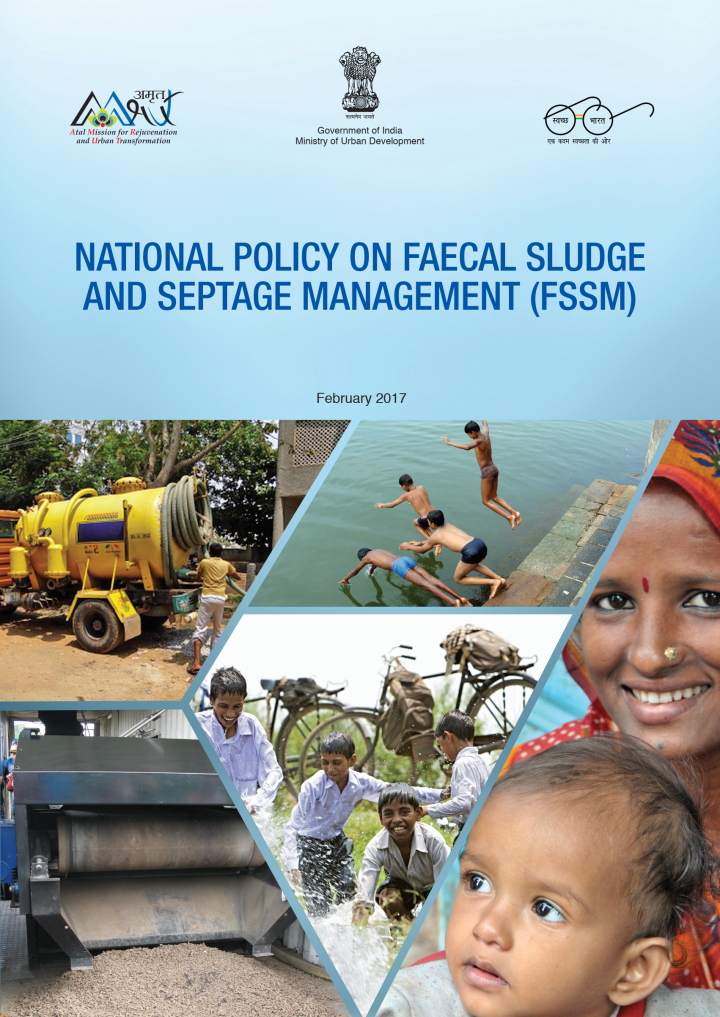
Government of India Ministry of Urban Development (2017) National Policy on Faecal Sludge and Septage Management (FSSM)
According to Census 2011, India’s urban population is 377 million or 31% of the total population, which is expected to increase to 600 million by 2031. The Census 2011 also showed that in 4,041 statutory towns, 7.90 million households (HHs) do not have access to toilets and defecate in the opena1. Under the Swachh Bharat Mission (SBM), it is envisaged that nearly 80% of these 7.90 million HHs (or nearly 6.3 million HHs) will meet their sanitation needs through newly-built individual household toilet (IHHT) and the remaining 20% (or nearly 1.6 million HHs) will rely on existing or newly-built community toilets. Weak sanitation has significant health costs and untreated faecal sludge and septage from cities is the single biggest source of water resource pollution in India. Human waste has clearly been identified as the leading polluter of water sources in India, causing a host of diseases including diarrhoea, agricultural-produce contamination and environmental degradation. India’s bigger cities have large, centralized sewerage systems with vast underground pipelines, pumping stations and huge treatment plants. These systems are expensive to build and even more expensive to operate effectively, as they require continuous power, a large amount of water, skilled operators and extensive electro-mechanical maintenance. It is for this reason that India’s 7,000+ small towns do not have such systems ensus 2011, India’s urban population is 377 million or 31% of the total population, which is expected to increase to 600 million by 2031. The Census 2011 also showed that in 4,041 statutory towns, 7.90 million households (HHs) do not have access to toilets and defecate in the opena1. Under the Swachh Bharat Mission (SBM), it is envisaged that nearly 80% of these 7.90 million HHs (or nearly 6.3 million HHs) will meet their sanitation needs through newly-built individual household toilet (IHHT) and the remaining 20% (or nearly 1.6 million HHs) will rely on existing or newly-built community toilets. Weak sanitation has significant health costs and untreated faecal sludge and septage from cities is the single biggest source of water resource pollution in India. Human waste has clearly been identified as the leading polluter of water sources in India, causing a host of diseases including diarrhoea, agricultural-produce contamination and environmental degradation. India’s bigger cities have large, centralized sewerage systems with vast underground pipelines, pumping stations and huge treatment plants. These systems are expensive to build and even more expensive to operate effectively, as they require continuous power, a large amount of water, skilled operators and extensive electro-mechanical maintenance. It is for this reason that India’s 7,000+ small towns do not have such systems and are unlikely to be covered by centralised sewerage systems in the near future.
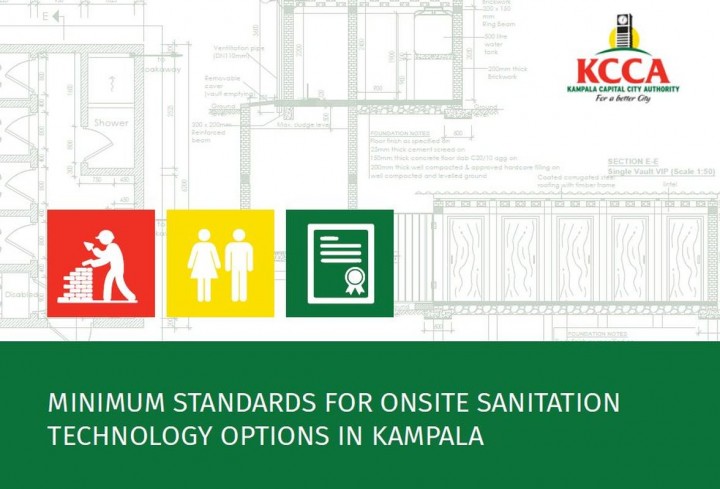
Kampala Capital City Authority (2017) Minimum Standards for Onsite Sanitation Technology Options in Kampala
KCCA’s current drive towards improving faecal sludge management in Kampala is cognisant of the city sanitation challenges and significant contribution of sanitation to economic and social development of the country and thus its citizens. The Authority and its divisions have an intermediary function for the coordination of sanitation planning and the harmonisation with urban development planning. This document therefore is intended to assist households, developers and KCCA to define the minimum standards for on-site sanitation technology options that can be adopted in Kampala city. It will provide enforcement guidance to KCCA and assist ance to improve FSM in the city. These standards are derived from the provisions in existing legislation and guidelines related to sanitation in Uganda. They incorporate current faecal sludge management practice in the different KCCA divisions and best practice in similar contexts.
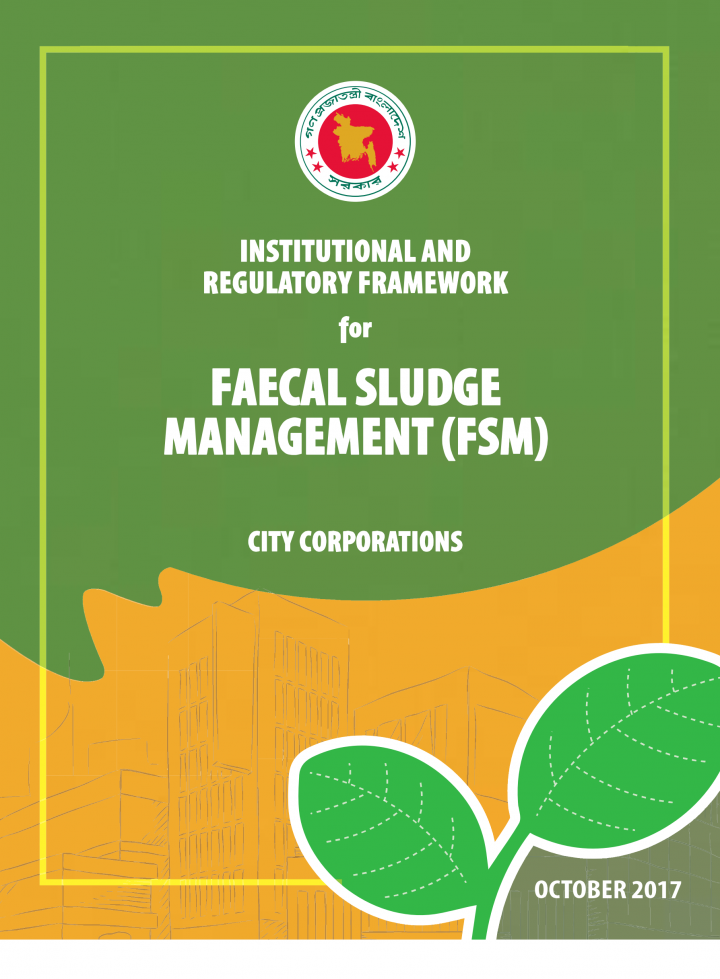
Working Committee formed by the Local Government Division, Ministry of Local Government, Rural Development and Co-operatives (2017) Institutional and Regulatory Framework for Faecal Sludge Management (IRF-FSM)
In Bangladesh, on-site sanitation is prevalent throughout the country except for a small portion in Dhaka city, and the huge quantity of faecal sludge generated in septic tanks and pits (of pit/ pour-flush latrines) is inaptly managed. Lack of Faecal Sludge Management (FSM) services is causing severe environmental pollution, particularly in urban areas, affecting both public health and economy. Apart from Dhaka North and Dhaka South City Corporations, currently there are 9 more City Corporations in the country namely Chittagong, Rajshahi, Khulna, Barisal, Sylhet, Rangpur, Comilla, Narayanganj and Gazipur. According to Local Government (City Corporation) Act 2009, the Government of Bangladesh may establish new city corporations by transforming existing Paurashava towns considering factors that include, among others, existing population, population density, local income source, economic importance, potentials for infrastructure development and expansions, existing Paurashava income and public opinion. All these 9 City Corporation areas completely depend on on-site sanitation system, which primarily include septic tank system, and different forms of pit latrines. The middle- and high-income areas of the city are mostly covered by septic tank system (consisting of septic and soakage pit). However, with increasing population density, high level of water use and wastewater generation, the septic tanks are unable to remove solids from wastewater effectively and getting filled quickly; the soakage pits are unable to drain the huge volumes of septic tank effluent into the subsurface, and thus overflowing of septic tanks and soakage pits are common.
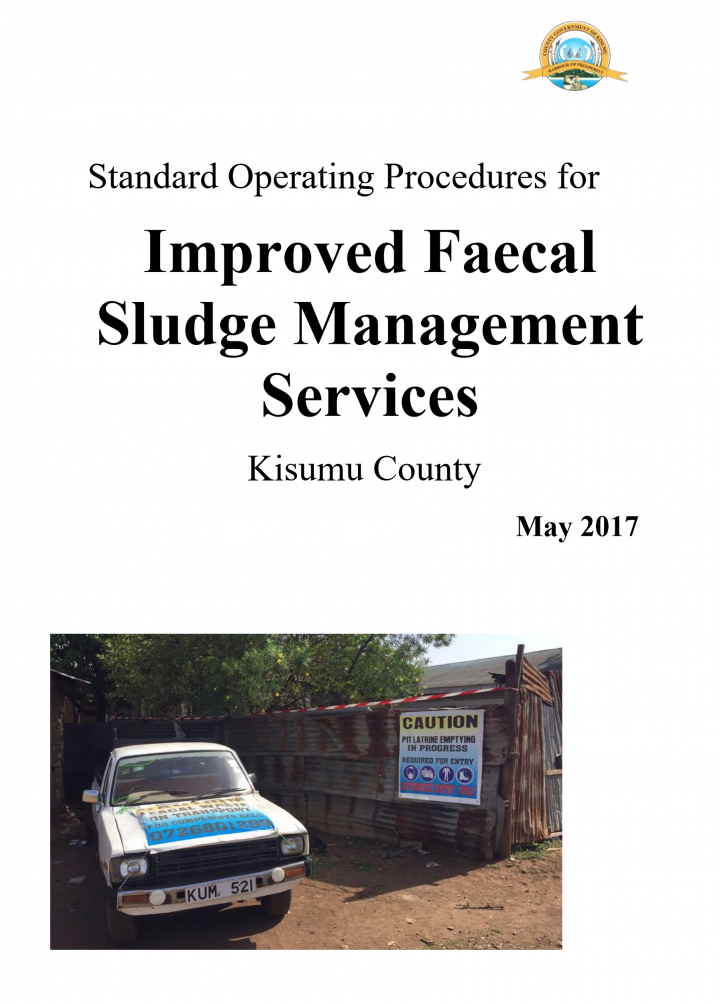
WSUP (2017) Standard Operating Procedures for Improved Faecal Sludge Management In Kisumu County
Faecal sludge management (FSM) involves the collection, transport, safe treatment and disposal of the full contents of an on-site sanitation system e.g. a pit latrine, or a septic tank. To manage the contents appropriately; the sludge, the water and the solid waste within the containment system must be appropriately treated and disposed of. In Kisumu, approximately 75% of household sanitation systems are pit latrines, yet services that exist to service these pits have previously been unregulated. The aim of this document is to specify Standard Operating Procedures (SoPs) developed by Kisumu Public Health Office (PHO) and Water and Sanitation for the Urban Poor (WSUP) for Improved Faecal Sludge Management Services. In the current absence of policies and legislation specifically for pit latrine emptying services and faecal sludge management; these guidelines serve as an interim statement of required standards that are expected to improve and evolve over time.
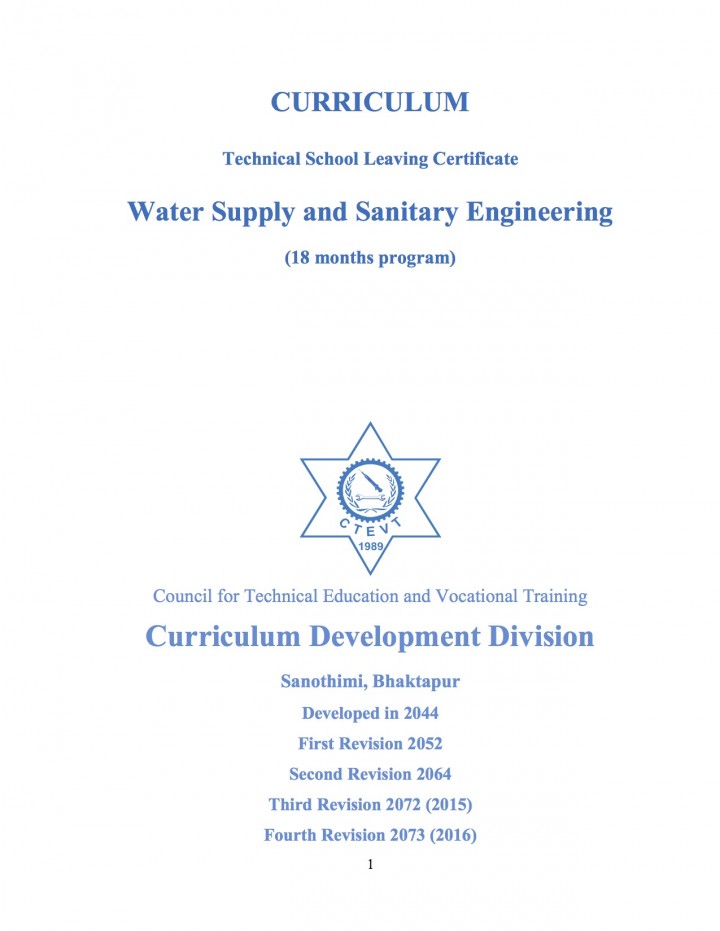
CTEVT (2016) Curriculum - Technical School Leaving Certificate
Nepal Government, Ministry of Education implemented the Letter grading system in SLC.The door of TSLC program is open for those who have appeared 10th grade exam and achieved any GPA and any grade in any subject. Focusing on such students the curriculum of TSLC of 29 months and 15 months has been converted into 18 months. This is the competency based and market oriented curriculum guide for sanitation which is designed to produce competent skillful sanitation workers equipped with knowledge, skills and attitudes. This curriculum focuses on basic sanitation works so as to contribute in the national streamline of the use of sanitation equipment and repair and maintenance of sanitation devices used in the country. It aims at providing ample opportunities for the employment in the related sector, mainly entrepreneurship development of the graduates as well as in national and international employment market.
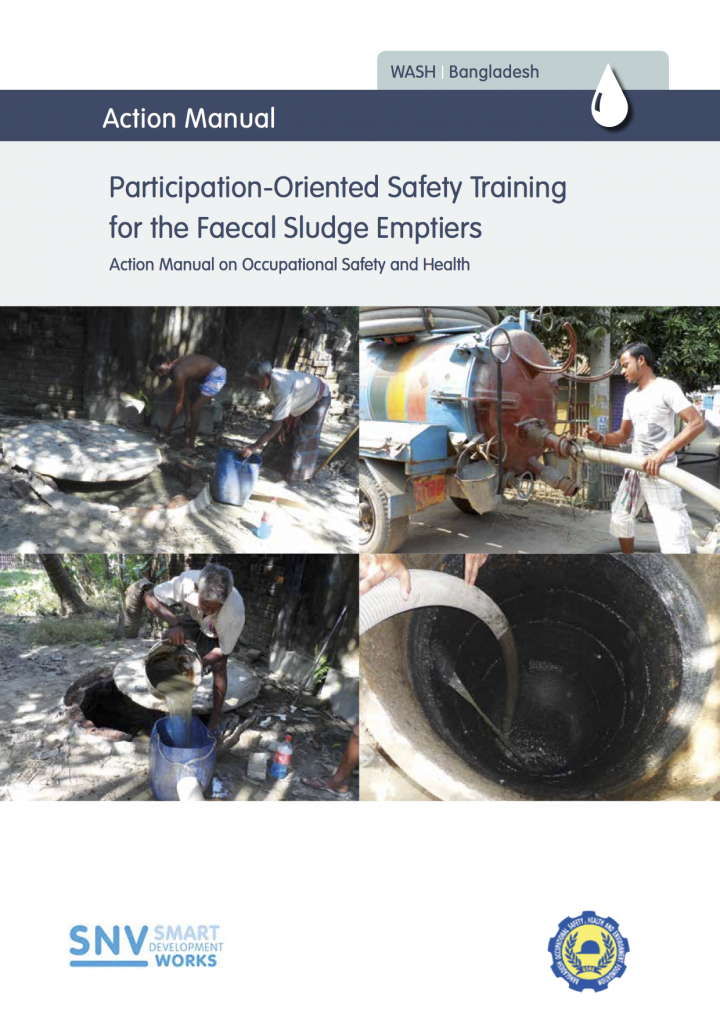
Chowdhury Repon, AR., Omar, F., Mamtaz, R. (2015) Participation-Oriented Safety Training for the Faecal Sludge Emptiers
The broader objective of the Participation Oriented Safety Training (POST) manual is to support emptiers and employers involved in this field to improve their knowledge of occupational health and safety in both manual and mechanical operations. The present training manual aims to address the risks involved in faecal sludge handing and emptying operations through the implementation of participation based model. And to provide the skills required to fulfil the role of a field level occupational health and safety (OHS) educator / trainer and increase collective participation between employers and workers in this regard. This POST training manual is a result of joint efforts of the SNV Netherlands Development Organization, Bangladesh and OSHE Foundation with a hope that it will serve as an effective instrument on improving working condition and protection of the faecal sludge emptiers in the country. It is also expected that this training manual contributes towards minimizing work-related risks and health exposures, promotion of good health and safety practices, and development of safe and environment-friendly faecal sludge emptying activity through the collective efforts of relevant authorities, employers and emptiers.
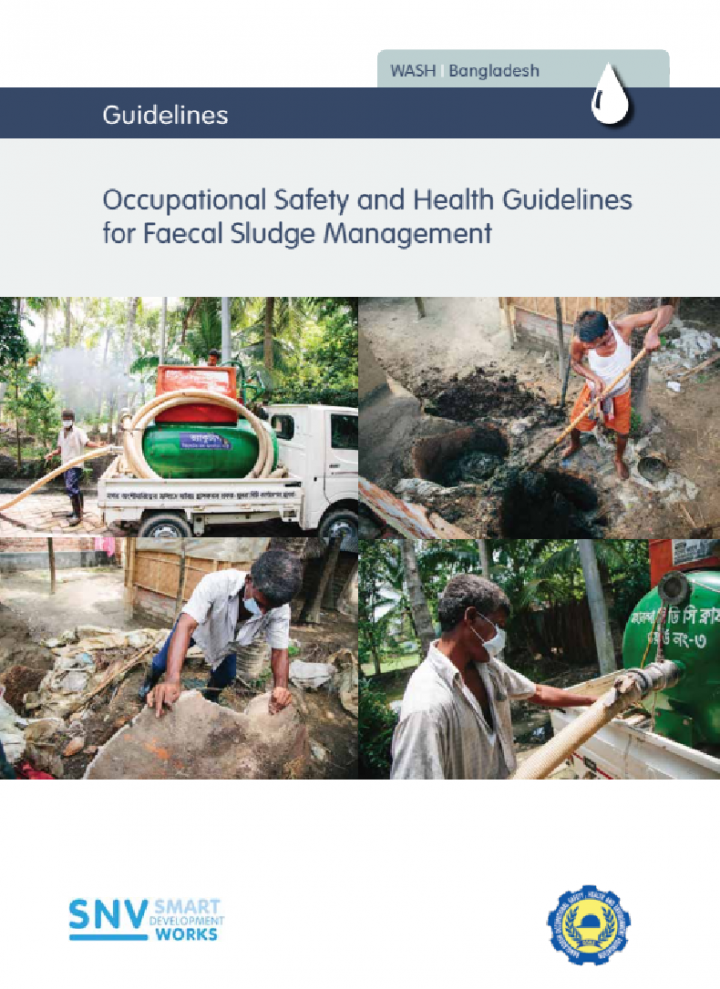
Repon, A. C., Faruq, O., Mamtaz, R. (2015) Occupational Safety and Health Guidelines for Faecal Sludge Management
Demonstration of Pro-poor Market-based Solutions for Faecal Sludge Management in Urban Areas of Southern Bangladesh is a project implemented by SNV Netherlands Development Organisation in partnership with Khulna City Corporation, Jhenaidah and Kushtia Paurashavas. Improvement of working conditions in sludge emptying and transportation is identified as a major area of action under the project. In line with this commitment, the initiative has been taken to develop a guideline on OHS for workers involved in FSM. This guideline aims to minimise the risks involved in septic tank/pit emptying, transportation and disposal of faecal sludge to the greatest extent possible. This document explores the issues involved in handling sludge, providing guidance for the protection of workers and the environment, and consolidates knowledge and best practice in this area with regard to limiting disease transmission and contamination. Objectives 1. To identify health- and environment-friendly FSM practices and procedures; 2. To consider legal and policy directions in OHS practices; 3. To promote a culture of safety amongst FSM stakeholders; 4. To enhance knowledge sharing on OHS-friendly FSM practices; 5. To promote institutional accountability on OHS in FSM; 6. To initiate local- and national-level advocacy to achieve institutionalisation of OHS guidelines for FSM; 7. To influence policy makers to adopt modern technology to enable health- and environment friendly FSM.
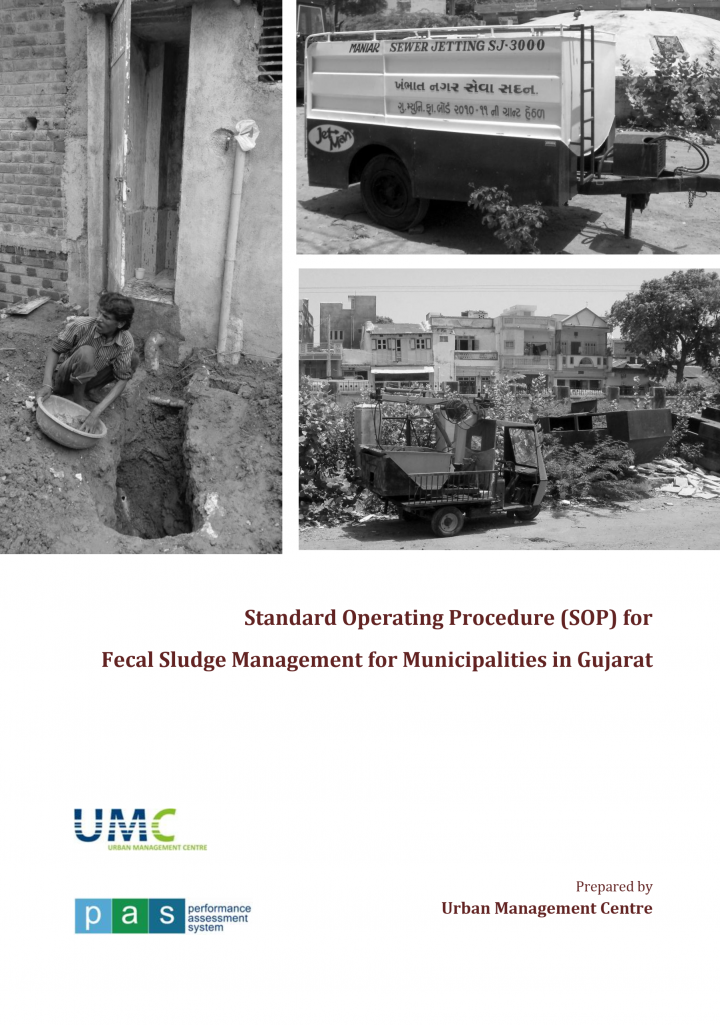
Urban Management Centre (UMC) (2015) Standard Operating Procedure (SOP) for Fecal Sludge Management for Municipalities in Gujarat
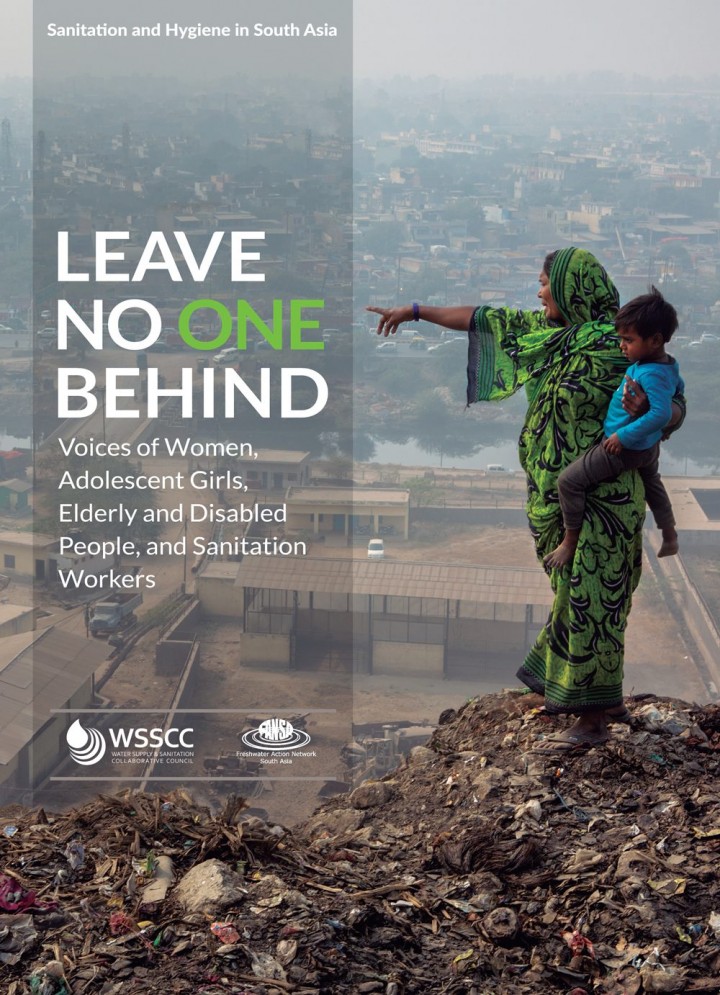
WSSCC, FANSA (2015) Leave No One Behind - Voices of Women, Adolescent Girls, Elderly and Disabled People, and Sanitation Workers
This publication summarizes the sanitation and hygiene hopes and aspirations of thousands of women and men of different ages and physical ability, across rural and urban areas in eight South Asian countries. In these countries, over a billion people are without safe sanitation. They represent individuals and groups rarely heard because they are seldom asked what their constraints are, what they need, how they cope and how they might design services differently to enable universal access and use.
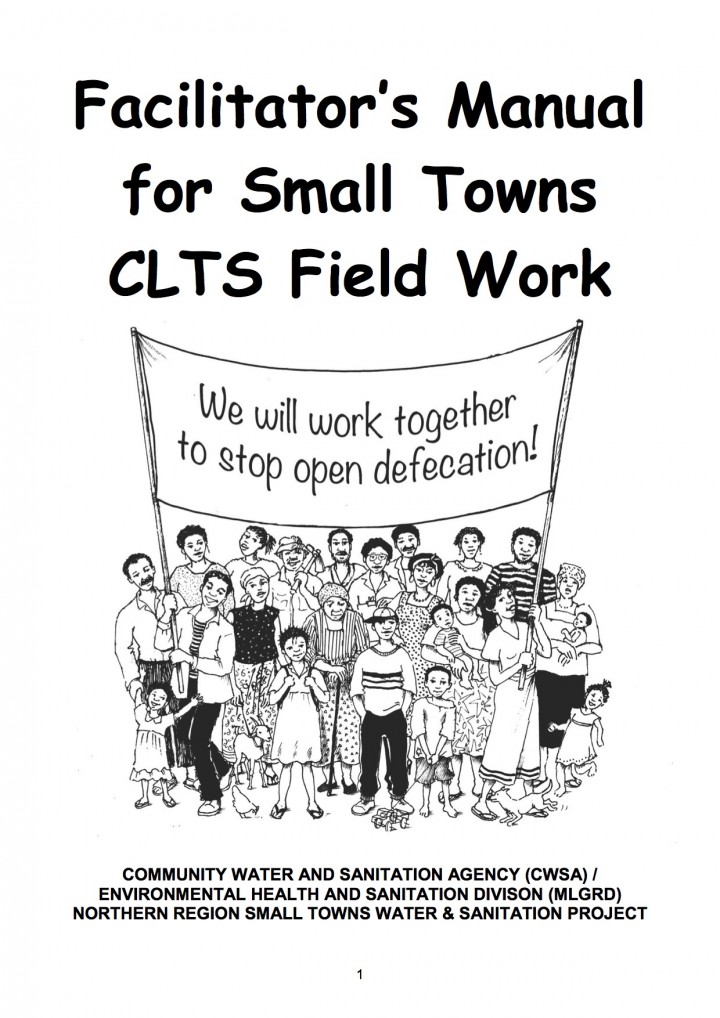
Kidd, R. (2014) Facilitator’s Manual for Small Towns CLTS Field Work
The Facilitator’s Manual for Small Towns CLTS Field Work is a guide for field workers who are promoting sanitation improvements at community and household levels, using the CLTS approach applied to the small towns context.
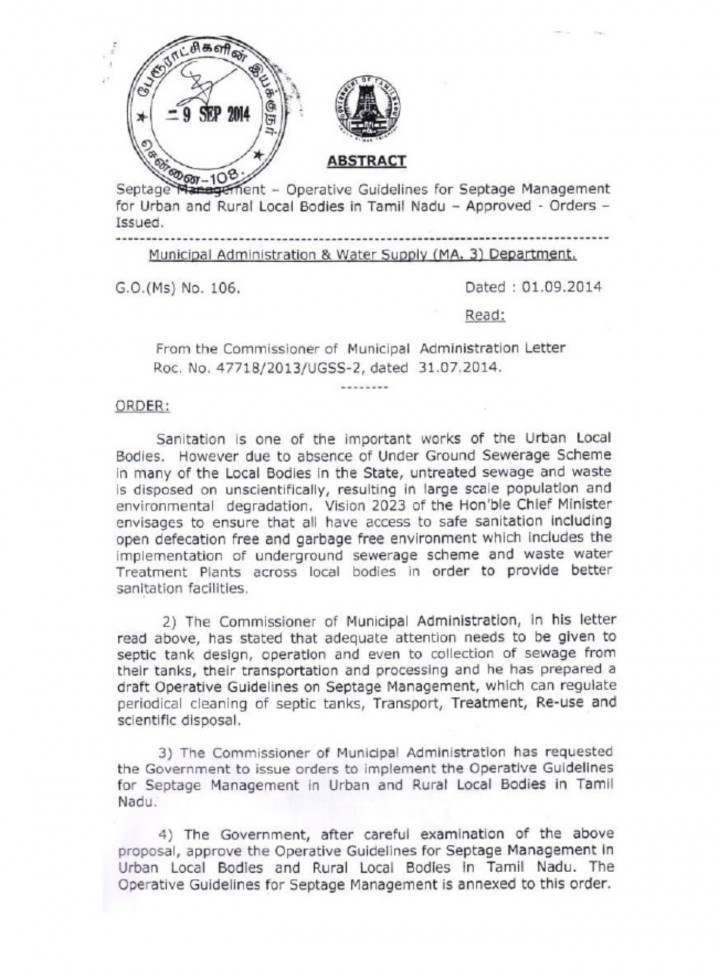
Municipality Administration and Water Supply Department (2014) Operative Guidelines for Septage Management for urban and Local Rural bodies in Tamil Nadu
The partially treated sewage that is stored in a septic tank is commonly called as Septage. It includes the liquids, solids (sludge), as well as the fats, oils and grease (scum) that accumulate in septic tanks over time. Septage management includes the entire process of design, collection, safe treatment& disposal of septage based on generation of sewage. A comprehensive program that regulates periodic septic tank cleaning, as well as septage transport, treatment, re-use,and disposal is important in the context of our rapidly urbanizing economies.
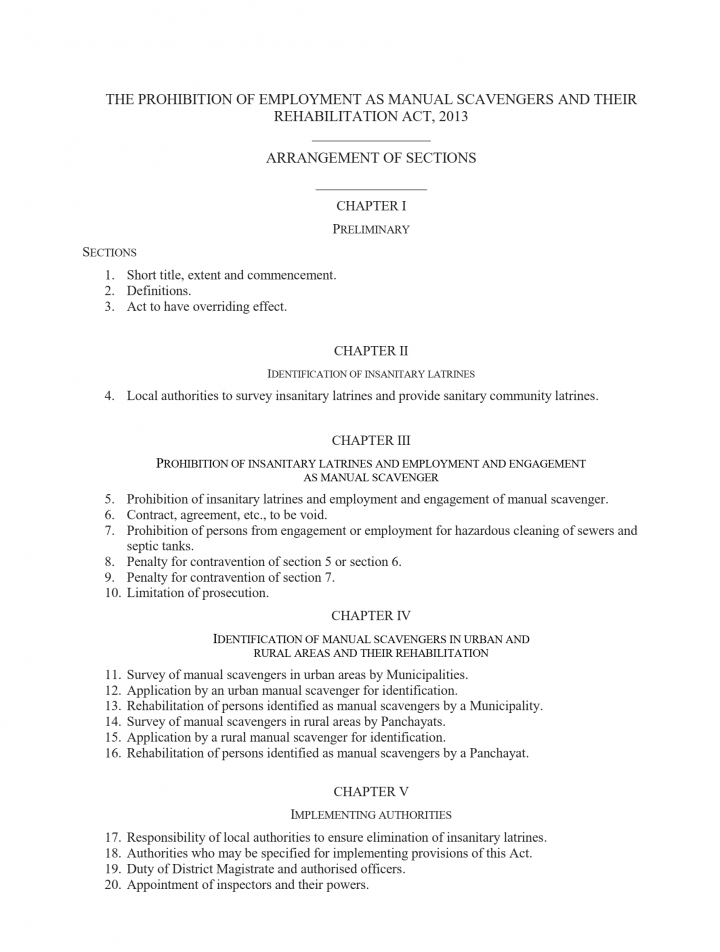
(2013) The Prohibition of Employment as Manual Scavengers and Their Rehabilitation Act, 2013
An Act to provide for the prohibition of employment as manual scavengers, rehabilitation of manual scavengers and their families, and for matters connected therewith or incidental thereto.
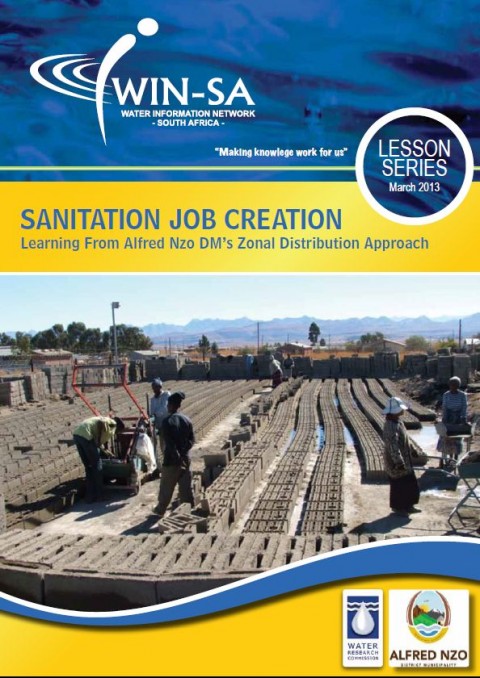
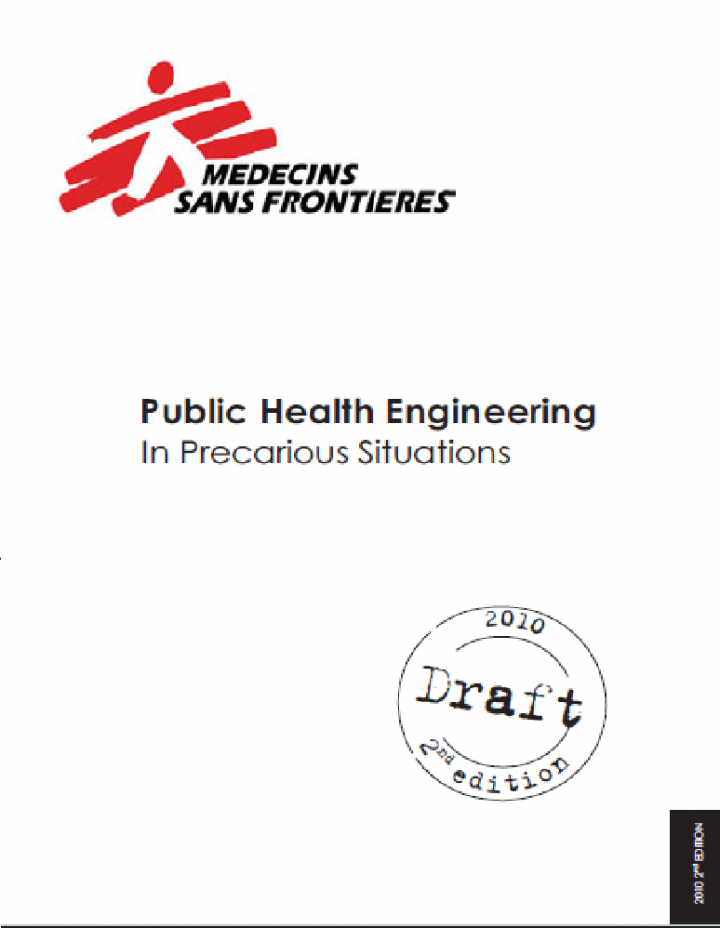
Noortgate, J., Maes, P. (2010) Public Health Engineering in precarious situations
This handbook supports the implementation of health programmes in deprived environments, in particular in closed settings like refugees and displaced persons camps, in health structure. The purpose is to increase the effectiveness with which relief workers can provide sound water, hygiene and sanitation assistance in precarious situations.
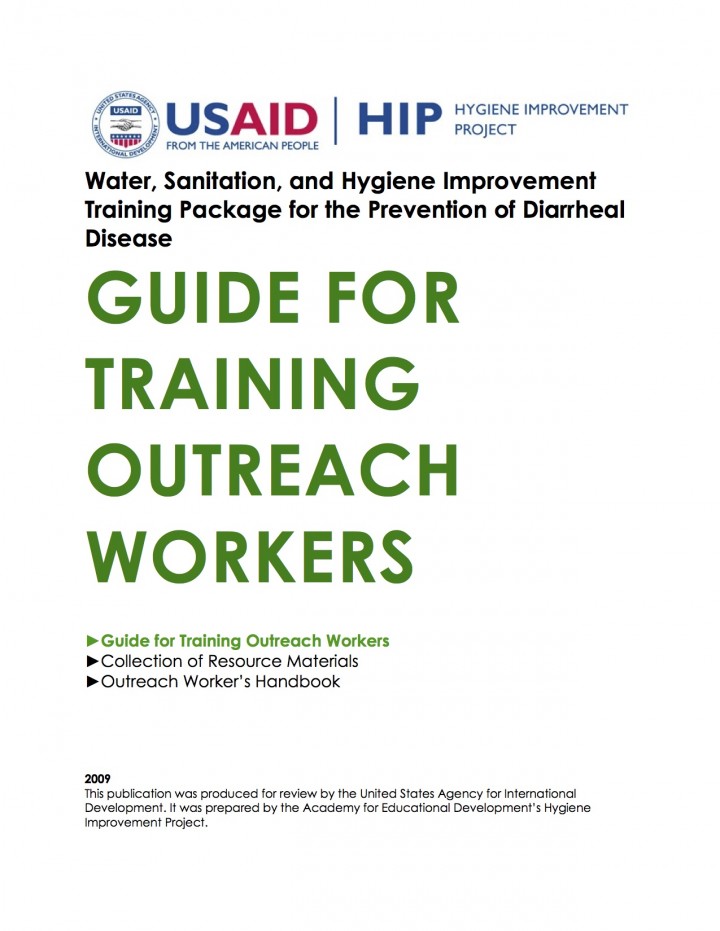
USAID HIP (2009) Water, Sanitation and Hygiene Improvement Training Package for the Prevention of Diarrheal Disease
The USAID- funded Hygiene Improvement Project has compiled a training package to facilitate work in WASH around the world. This training guide is intended for use by any organization the works with outreach workers at the community level.
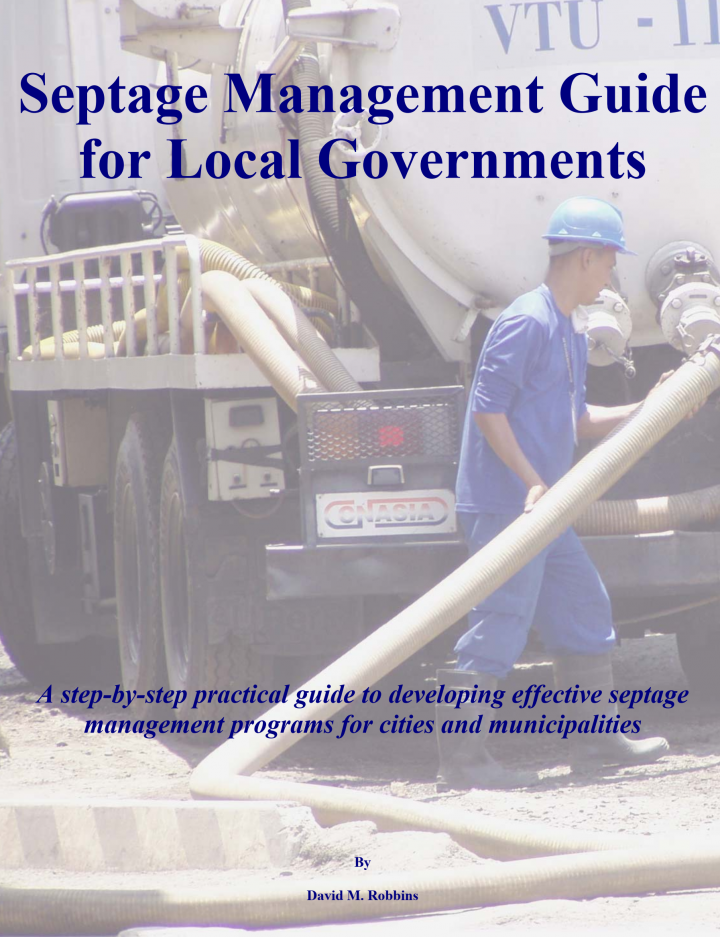
David M. Robbins (2007) Septage Management Guide for Local Governments
The direct relationship between diseases such as cholera, hepatitis and dysentery and the unrestricted discharges of residential sewage is well documented. The septic tank is a simple device and when designed, installed, and operated properly, can serve as the first step in the sewage treatment process, which transforms human waste into a manageable effluent. Effluent can be further treated, reused or disposed of, thus breaking a cycle of disease that is responsible for huge economic losses, countless lost lives, and immeasurable human suffering. In order to be effective, enforcement at the local level can ensure the adherence of best practices to regulate septic tanks and on-site wastewater management. Septage is the contents of septic tanks. It includes the liquids, solids (sludge), as well as the fats, oils and grease (scum) that accumulate in septic tanks over time. Comprehensive programs that regulate periodic septic tank cleaning, as well as septage transport, treatment, reuse, and disposal are becoming important for cities throughout South and South East Asia. These programs serve to improve sanitation while reducing the prevalence of waterborne diseases. In order to be effective, such programs must consider existing septic tank practices in regards to usage, design, and construction, as well as the transportation and treatment capacity of the local governments or concessionaires tasked with implementing these programs. One approach to septage management is for local health authorities to promulgate rules, ordinances or laws that dictate septic tank practices. These may include monitoring requirements or specifying pumping and de-sludging frequencies, as well as implementing best practices through all stages of septage handling. Such programs, when coupled with full cost recovery mechanisms based on user fees, can be especially effective.
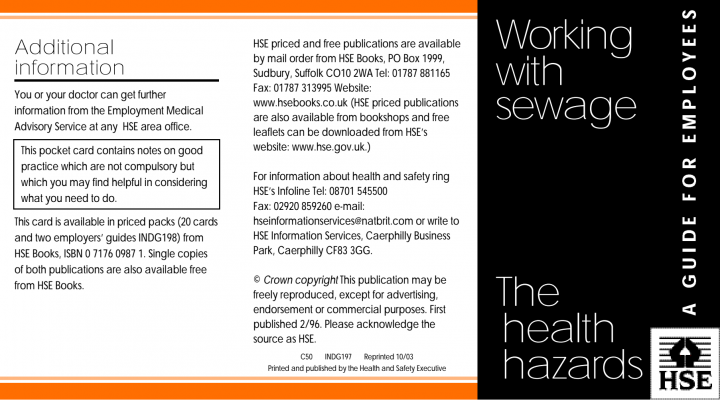
HSE (1996) HSE Working with Sewage
This pocket card contains notes on good practice which are not compulsory but which you may find helpful in considering what you need to do.
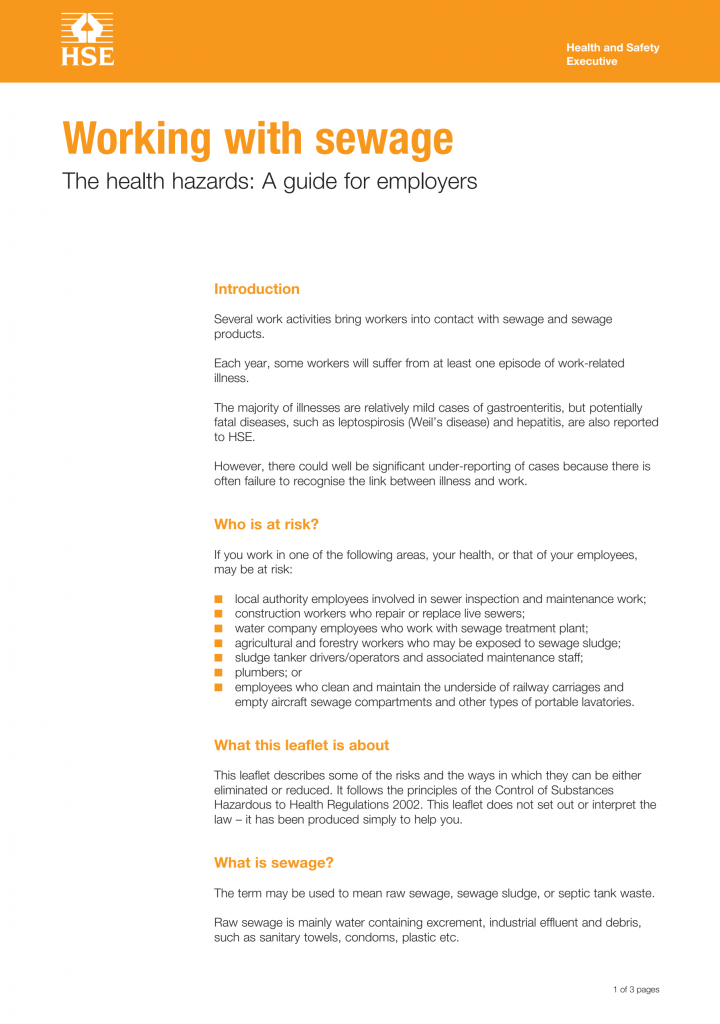
HSE (1996) Working with Sewage
Several work activities bring workers into contact with sewage and sewage products. Each year, some workers will suffer from at least one episode of work-related illness. The majority of illnesses are relatively mild cases of gastroenteritis, but potentially fatal diseases, such as leptospirosis (Weil’s disease) and hepatitis, are also reported to HSE. However, there could well be significant under-reporting of cases because there is often failure to recognise the link between illness and work.
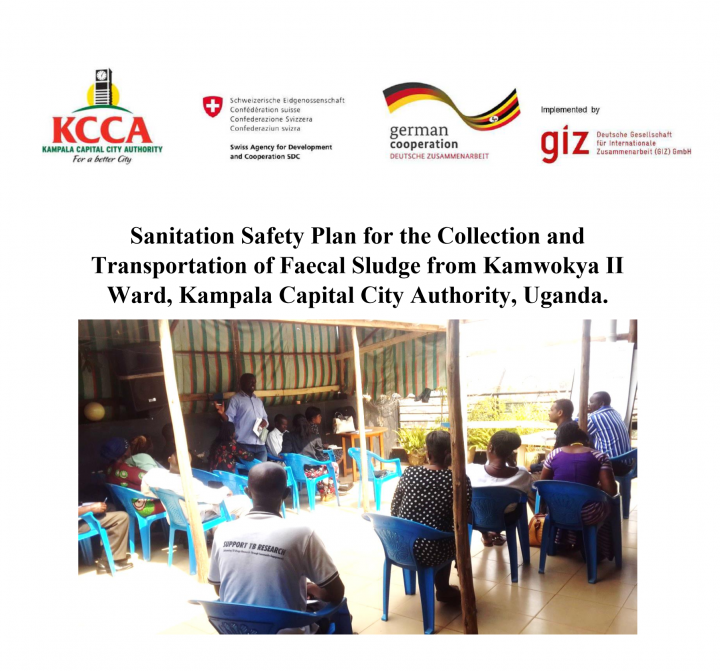
Abdullah Ali Halage Sanitation Safety Plan for the Collection and Transportation of Faecal Sludge from Kamwokya II Ward, Kampala Capital City Authority, Uganda.
Sanitation issues are some of the most significant development challenges for Kampala City, Uganda. Like many other capital cities in developing countries, Kampala is experiencing rapid population and economic growth. However, provision of key services including adequate sanitation for the city population has not been in tandem with these developments. Kampala Capital City Authority (KCCA) with support from the Deutsche Gesellschaft fur Internationale Zusammenarbeit GmbH GIZ Reform for the Urban Water And Sanitation Sector (RUWASS) programme aims to improve faecal sludge management (FSM) and implement a number of economically viable “Resource Recovery and Safe Reuse” (RRR) business models while public health and environmental implications are properly addressed.
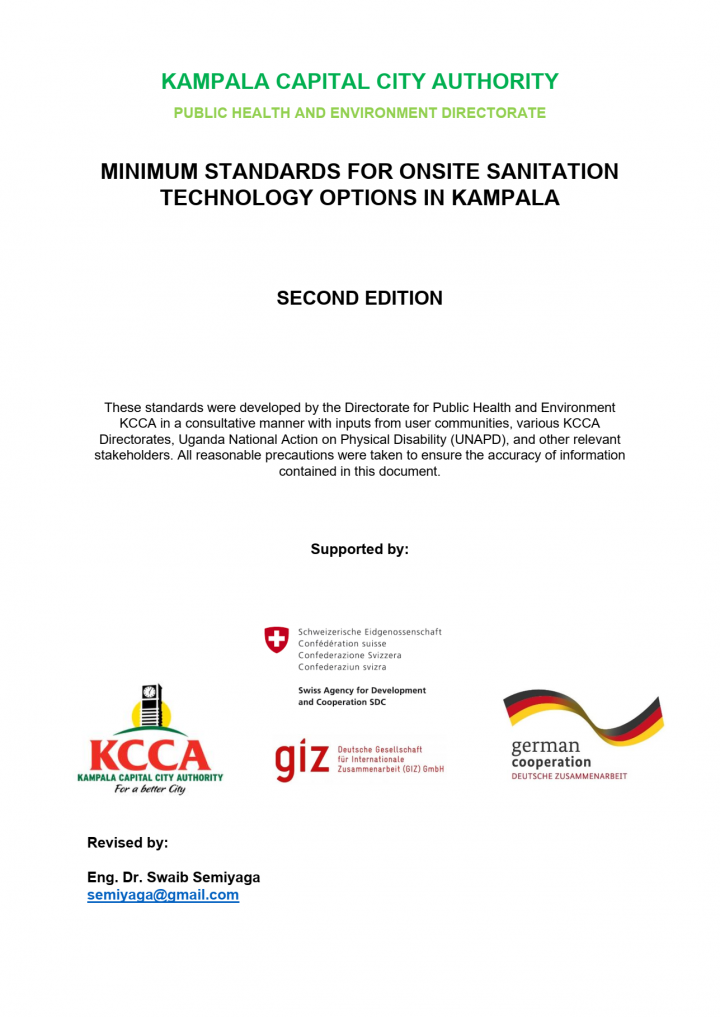
Directorate for Public Health and Environment KCCA Minimum Standards for Onsite Sanitation Technology Options in Kampala
Availability of adequate sanitation services is one of the most significant development challenges experienced in the rapidly growing Kampala city. Over 90% of Kampala’s population relies on on-site sanitation which include flush (pour and cistern) toilets, Urine Diversion Dehydrating Toilets (UDDTs), Ventilated Improved Pit Latrines (VIPs) and traditional pit latrines. The toilets are put up by individuals and different institutions with no proper guidance to inform planning, construction and enforcement. Current practice involves relying on unguided previous experience to define what qualifies as an acceptable toilet facility. Legal provisions broadly define the requirement for a sanitation facility and some guidelines are inconsistent with each other. The Sustainable Development Goals (SDGs) define adequate sanitation to include safe excreta management and hand washing. Therefore, all toilets must have provisions for proper emptying and / or treatment of faecal sludge as well as a hand washing facility. In the absence of explicit legal provisions and consistent sanitation guidelines for, amongst others, the need for minimum standards is apparent.
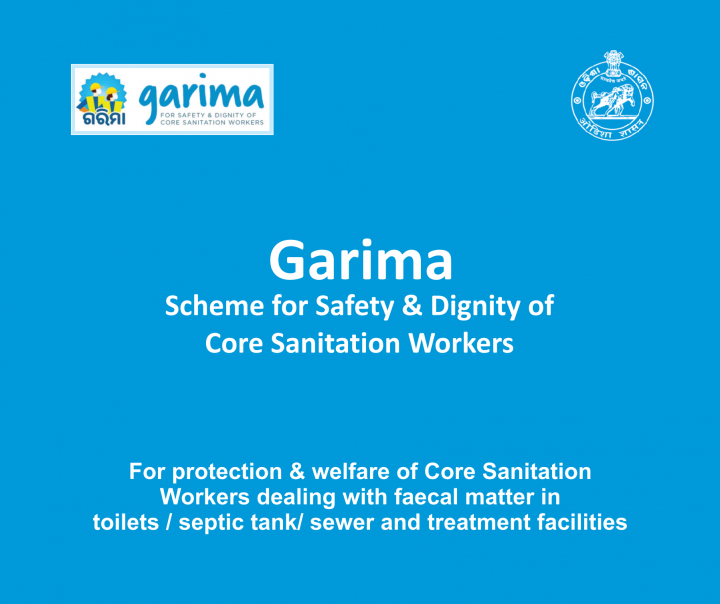
Government of Odisha Housing and Urban Development Department Scheme for Safety and Dignity of Core Sanitation Workers
This Scheme is introduced to ensure that core sanitation services undertaken in urban areas of Odisha is done in a safe and dignified manner and shall come into force from the date of its notification and continue until further orders The Scheme will be implemented by the Housing & Urban Development Department through the 114 Urban Local Bodies of Odisha.
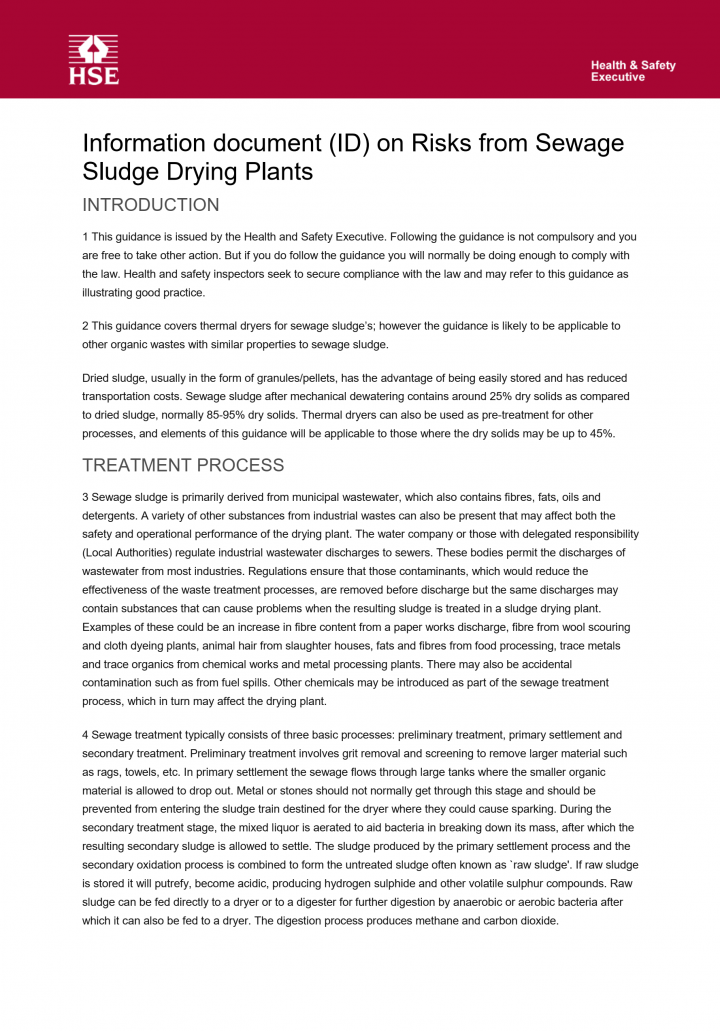
HSE Information document (ID) on Risks from Sewage Sludge Drying Plants
1 This guidance is issued by the Health and Safety Executive. Following the guidance is not compulsory and you are free to take other action. But if you do follow the guidance you will normally be doing enough to comply with the law. Health and safety inspectors seek to secure compliance with the law and may refer to this guidance as illustrating good practice. 2 This guidance covers thermal dryers for sewage sludge’s; however the guidance is likely to be applicable to other organic wastes with similar properties to sewage sludge. Dried sludge, usually in the form of granules/pellets, has the advantage of being easily stored and has reduced transportation costs. Sewage sludge after mechanical dewatering contains around 25% dry solids as compared to dried sludge, normally 85-95% dry solids. Thermal dryers can also be used as pre-treatment for other processes, and elements of this guidance will be applicable to those where the dry solids may be up to 45%
Sanitation Workers Forum 2021 Thematic Session 1: Marginalisation & Representation of Sanitation Workers
This session focuses on the changing terminology to describe sanitation work and workers, and persistent forms of stigma and discrimination that many workers face today. The speakers raise important questions about representation of workers in global and national-level advocacy, and the ongoing struggle to be recognised as an essential workforce. Speakers 1. Dr. Sheeva Y. Dubey (Assistant Professor, School of Media and Journalism at D Y Patil International University, Pune, India). Talk Title: ‘Deconstructing the anti-manual scavenging discourse in India’ 2. Prabha Pokhrel (NGO Worker & Social Anthropologist, Nepal) Talk Title: ‘Brown Gold Project in Gulariya Municipality: marginality, sanitation and wastewater challenges' 3. Festo Dominic Makoba (Center for Community Initiatives, Tanzania) [Pre-Recorded] Talk Title: 'Building networks of sanitation workers from the ground up' 4. Asif Aqeel (Centre for Law and Justice, Pakistan). Talk Title: ‘Dehumanizing sanitation working conditions and the heroic response of the workers' Chairs: Dr Hemangi Kadlak, Maisie-Rose Byrne & Sally Cawood
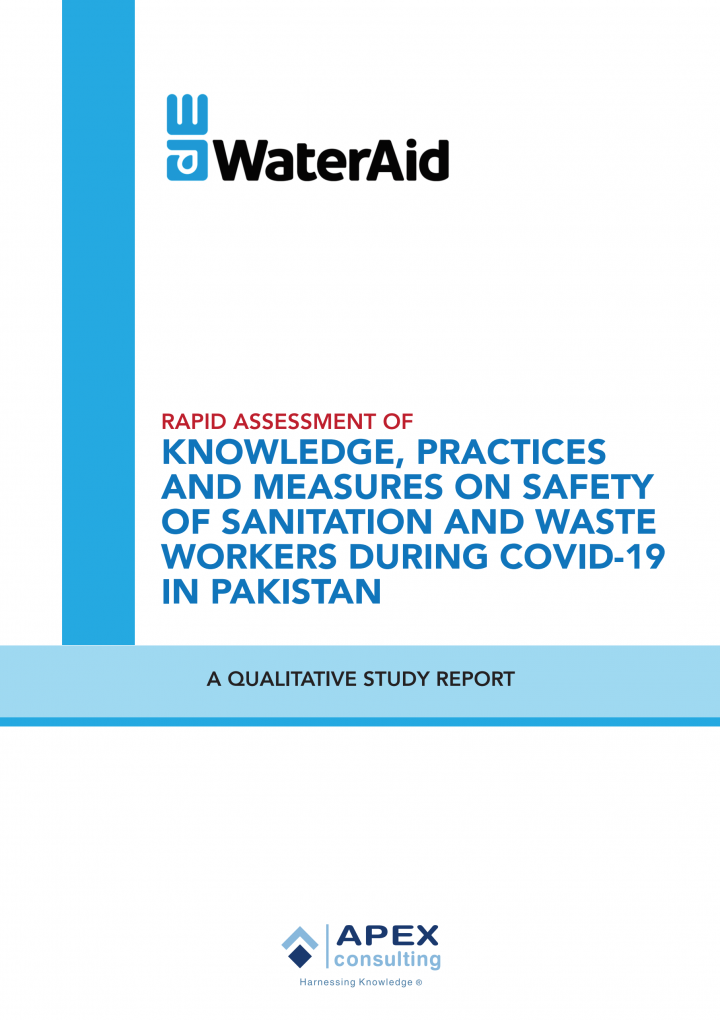
WaterAid Rapid Assessment of Knowledge, Practices and Measures on Safety of Sanitation and Waste Workers During Covid-19 in Pakistan
The rapid assessment attempts to collect information on the knowledge and awareness about transmission, symptoms, prevention and treatment of coronavirus, hand hygiene practices and concerns of sanitation workers and solid waste collectors about Covid-19 pandemic, the kind of safety measures put in place to protect these workers and the gaps that exist in terms of safety measures. Using qualitative data collection tools, the data was collected from 63 respondents including solid waste collectors, sanitatary workers (employed at homes, private offices and public department), and solid waste collectors at healthcare facilities through administration of key informant interviews.
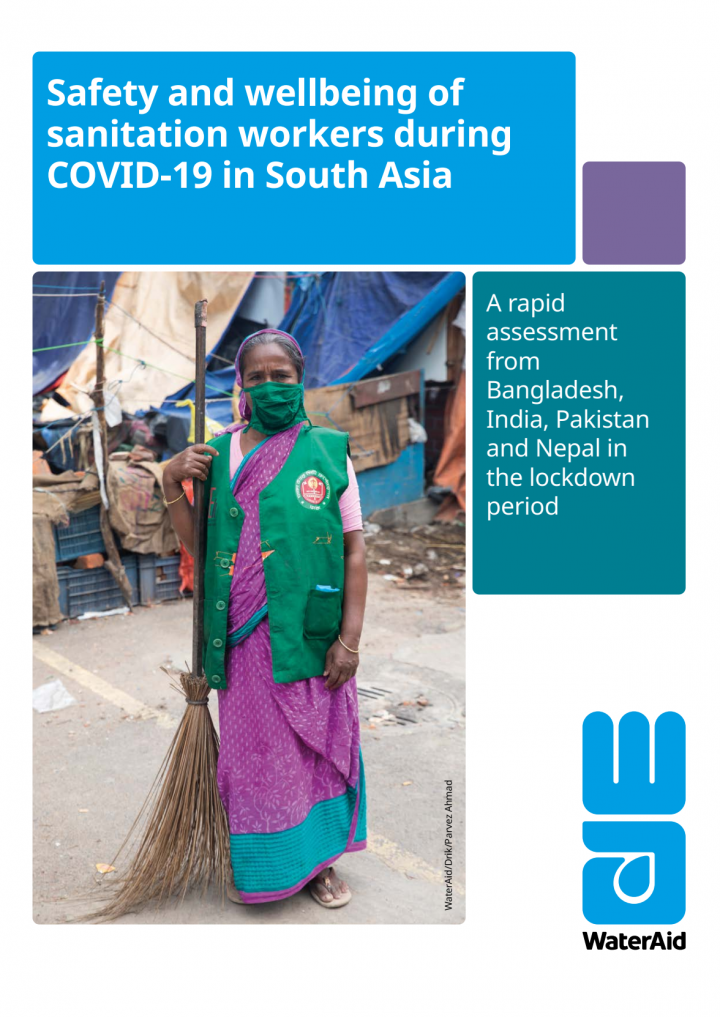
WaterAid Safety and wellbeing of sanitation workers during COVID-19 in South Asia
The COVID-19 pandemic reached South Asia at the beginning of 2020 and by March most of the countries in the region had imposed lockdowns in an attempt to curb the rampant spread of the disease. Severe restrictions on movement were introduced and businesses were closed. Only the provision of essential services – including sanitation and waste management – were permitted to continue. Sanitation workers have long been marginalised across South Asia due to stigma around the nature of their work and discrimination based on caste, ethnicity and religion. The COVID-19 pandemic magnified the considerable occupational and health hazards these workers already faced, leaving many of them to continue working with limited protection and almost no formal guidance or support structures.
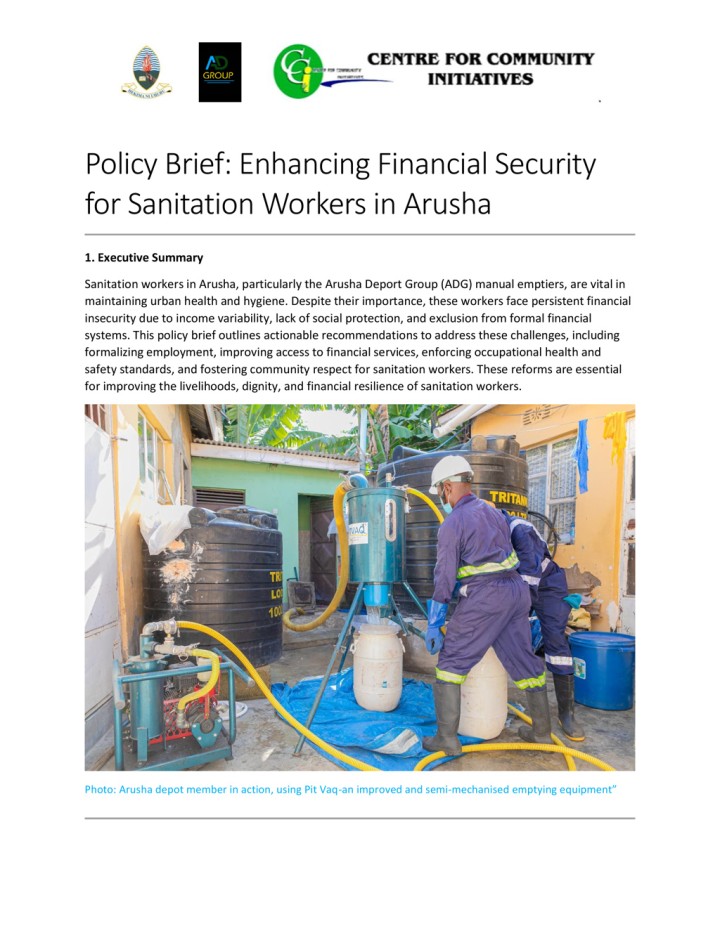
Center for Community Initiatives () Policy Brief: Enhancing Financial Security for Sanitation Workers in Arusha
Sanitation workers in Arusha, particularly the Arusha Deport Group (ADG) manual emptiers, are vital in maintaining urban health and hygiene. Despite their importance, these workers face persistent financial insecurity due to income variability, lack of social protection, and exclusion from formal financial systems. This policy brief outlines actionable recommendations to address these challenges, including formalizing employment, improving access to financial services, enforcing occupational health and safety standards, and fostering community respect for sanitation workers. These reforms are essential for improving the livelihoods, dignity, and financial resilience of sanitation workers.
